#this includes only the most gay sex coded scenes. what makes a scene gay sex coded is a truly philosophical question but in my
Text
On Boston and Brian Kinney

I’ve seen a lot of folks in the Only Friends tag recently making connections between the show and Queer as Folk, both US and UK versions, which makes sense because QaF is a clear reference for the show, both visually and thematically, and we know Jojo likes to reference western media in his work. One parallel folks are drawing is not tracking for me, however, so I am jumping in the wayback machine and putting on my old QaF stan hat to talk to y’all about Brian Kinney, and why Boston is actually nothing like him. Tagging @bengiyo and @neuroticbookworm who talked this through with me and also @slayerkitty because I saw you were contemplating this connection between the two characters.
So, first, why are people making this comparison? It really boils down to one thing: Brian and Boston are both sluts. That’s… pretty much it. They both like sex and prefer to have it with many different partners, and neither has much use for monogamy. But this is pretty much where their similarities end.
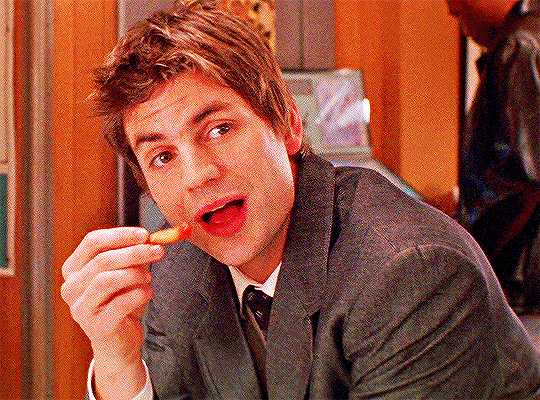
So let’s remind ourselves who Brian Kinney is: a kind of fantasy of a hot, rich, self-actualized gay man with unmatched sexual prowess and a surface level flippancy masking a heart of gold. Brian is an adult man with a thriving career and money that he earned for himself after leaving his abusive and homophobic family (who would eventually explicitly reject him because of his sexuality). As a result, he is defiant in his commitment to live his life as loudly and queerly as possible—which includes a dedication to fucking and sucking, public sex, and a rejection of heteronormative constructs like monogamy.
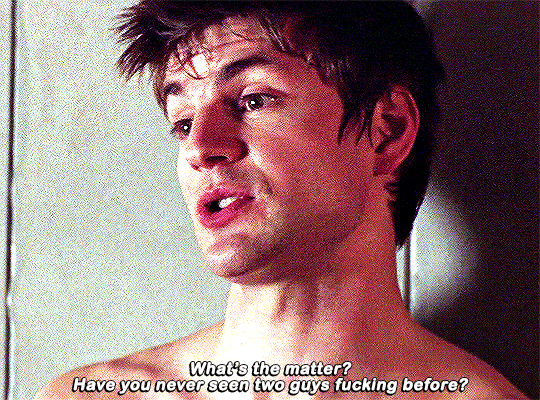
Brian has a very clear moral code he lives by, even if it’s not one most can relate to. He decides to have a son with his (lesbian) best friend because part of him wants to believe in a better future and build a family of his own. He is extremely loyal to his found family even as he’s a jerk to their face most of the time, and he is always working behind the scenes to protect them even as he often hurts their feelings with his glib remarks and shitty behavior. Despite his disdain for monogamy, he never actually tries to destroy any of his friends’ happy relationships (in fact, he tries to sacrifice his own friendship with Michael to ensure he stays with his boyfriend).
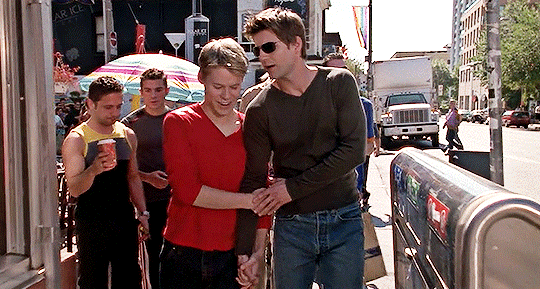
Brian has a sense of responsibility to others and often takes on the blame for things he didn’t even do, which is why he takes baby gay Justin to Debbie and ensures he is cared for even as he tries to dissuade Justin from getting attached to him, and why he cares for Justin in the aftermath of his bashing. He cares deeply about his community, to the point where he pours his money into protecting the local gay scene, literally bankrupts himself to stop an anti-gay politician from winning an election, and gives up a dream job to stay put in Pittsburgh and help rebuild the community after a hate crime.
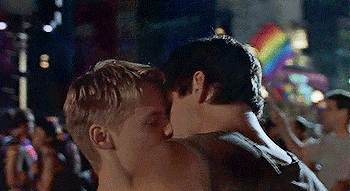
Brian is unflinchingly honest and he avoids making promises because once he does, he knows he will absolutely keep them—he takes his commitments seriously and he always does what he says he will. When he falls in love, he does not abandon his core values but he is willing to make some compromises. And he hides his better self and often wallows in self-destructive behavior because he feels deeply unworthy of love, which goes back to the intergenerational trauma he experienced as a child in an abusive home and the parental rejection he felt due to his sexuality.
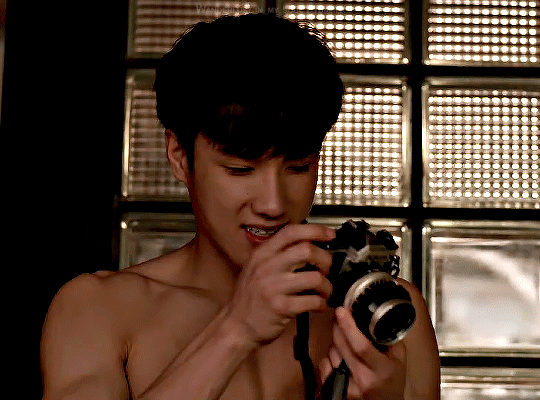
Boston, by contrast, is a character who feels more rooted in reality. He’s a pampered rich kid who is indulged in his hobbies and who already has a life plan laid out for him and paid for by his daddy. He likes to sleep around mostly because it’s fun, and because he knows his life here is temporary so he doesn’t see any point in getting attached to people. In stark contrast to Brian’s out and proud and fuck you if you have a problem with it brand of politics, he is still trying to hide who he is in service of his father’s political career, even if he’s pretty sloppy about it (see him fucking Top in a car with giant windows parked in the driveway at a house party).
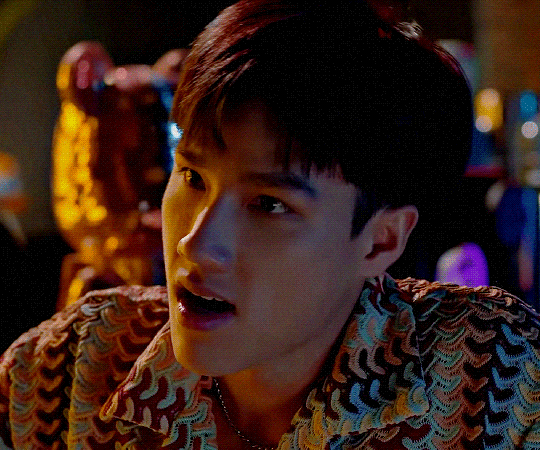
Boston’s moral code is fungible and ever-changing to fit his circumstances—boy is a hypocrite (see his opinions about people filming and photographing him even as he does the same to others constantly). He has no loyalty and no qualms about hurting and betraying his friends, and actively tries to destroy their relationships for sport or as a means to get what he wants. He does not feel responsible for anyone and often lies and ducks accountability for the things he does. He does not care about his community at all, and in fact already has a NYC escape hatch in his back pocket for when he inevitably burns his bridges. He is not as honest as Brian and sends a lot of mixed messages to keep people guessing and on the hook.
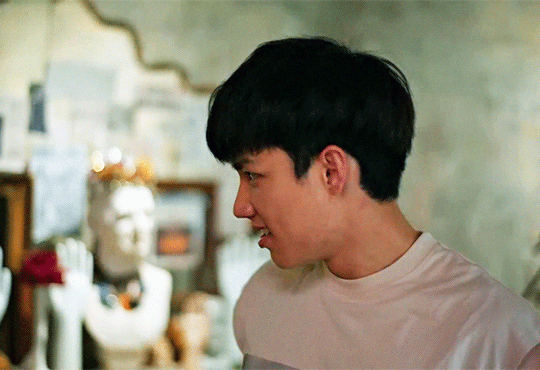
Rather than hurting people by being brutally honest as Brian does, Boston plays psychological games and manipulates his friends and lovers, and he seems to take twisted pleasure in blowing up their happiness. We haven’t seen him make a promise or fall in love, and while there are some signs that he may have some sort of inferiority complex at play (with Mew in particular), his motives are not tied to any past trauma. Boston is just a messy bitch who loves chaos and doesn’t really care who gets hurt as long as he gets what he wants and stays entertained. Where Brian is literally a superhero to his loved ones, Boston is just a very flawed human being.
But Shan, I hear you saying, I thought you liked Boston! I do, besties, I do. He’s a fantastic character and a very real kind of person many of us encounter in our 20s. Because that’s the thing: Boston is so young. He hasn’t developed any sense of responsibility to others or any understanding of the importance of queer community, and he has never had to take care of himself, which is perhaps the biggest difference between him and Brian. Brian has lived independently for more than a decade when we meet him in QaF, whereas Boston is a spoiled rich kid who has barely lived. Brian is a fully realized adult and his more nuanced characterization is a reflection of that; Boston is actually a pretty basic chaotic drama queen who will grow up eventually.
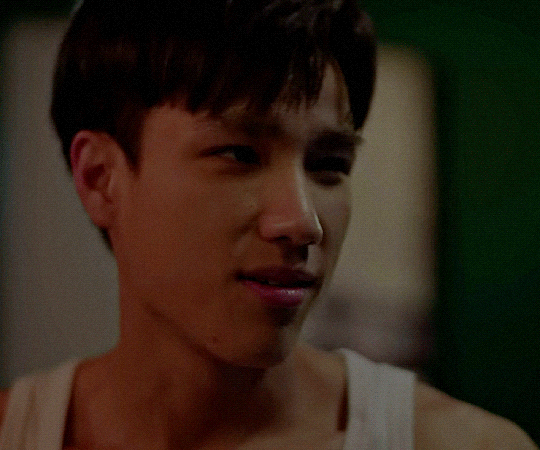
TL;DR: Aside from being promiscuous, Boston has very little in common with Brian Kinney. He is more a reflection of a very real kind of person you will meet on the scene in queer communities than an homage to a larger than life fictional QaF character. And while OF is absolutely referencing some of the themes and values and stylistic flourishes of QaF, it is not making direct parallels to its characters.
#did i write this mostly as an excuse to get brian kinney on this blog?#who can say#only friends the series#queer as folk#thai bl#ofts#only friends#ephemerality squad#shan shouts into the void
227 notes
·
View notes
Note
the second they made buck bi i watched the whole show for the first time, took a week, finished just before the latest episode came out. this obviously means i do not know my first thing about anything, most theories and fanon storylines included. what is the most important stuff that i need to know? the more deranged and delusional the better 🌸
lmao gotta love this ask. okay nonny let’s see.
the couch theory: right after Buck breaks up with Taylor, Eddie and Chris have dinner at his loft. they make fun of the fact that Buck doesn’t have a couch, and he says “my last two couches came with girlfriends — maybe I don’t wanna pick the wrong couch again.” we strongly believe the right couch is Eddie, and the scene itself is pretty, uh… hinting. I made a post about it.
the color theory: this theory stems from the fact that most of us believe the colors they are dressed in or are illuminated by (etc) aren't a coincidence, as in, we think different colors mean different things pertaining to their story and feelings. pls see our preacher on this subject @lover-of-mine <3 her posts are amazing
dad!buck: its a commonly accepted truth that Buck is not Chris’ uncle, but his dad. there’s not a lot of explaining to do, other than the man just loves Chris as his own, and clearly Eddie thinks the same, considering he added him to his WILL (insane behavior if u ask me).
shooting/lightening as direct parallels: Eddie getting shot and Buck getting struck by lightning are the two highlights of their individual and intertwined tragedies. there’s obviously other moments where they fear they may lose each other but these two are the biggest, most gut-wrenching ones. (these are their strings of fate, remember they both had to pull the other to safety).
buddie tends to parallel to every canon couple on the show: I’d have to pull up many receipts but, if you watch closely, you’ll see them. Bathena and Buddie both have water trauma, for example (tsunami vs capsized cruise ship), plus other more lighthearted ones like the Madney karaoke + the bachelor party Buddie karaoke scenes (7x06).
Edmundo Díaz is demisexual: and most likely gay. idk i didn't feel too comfy with the hyper-sexualization of Eddie on 7x05. but it’s more than that, obvi. that man was seen sleeping with Shannon, then with no one until Marisol, and i kinda believe Eddie getting out of the house to not have sex with her bc he felt distanced from her tells us a lot about him. he seems to only be able to engage in sexual activity should he feel something for that person.
I didn’t mean for all of these to be buddie coded, but alas, I’ve watched the show through their looking glass, and these are the theories that I’ve engaged with the most. for anyone reading, feel free to add more!💗
#my 911 opinions#911 fox#911#911 tv show#evan buckley#buddie#911 abc#evan buck buckley#eddie diaz#buck x eddie#buck and eddie#911 on abc#911 show#911 speculation#911 buddie#edmundo diaz#911 spoilers#911 season 7#911 s7#911 season seven
107 notes
·
View notes
Text
okay, so i think i've cracked the code
on why the girls, gays and theys all really like BG3
the short answer is the subversion of toxic gender stereotypes and the more or less relateable themes that each character has come up in game, or are implied, long answer under the cut
lots of people have been posting about individual (main and supporting) character motivations, yes but i haven't really seen any analyses based on gender and/or romance situations quite yet (please feel free to point me to them, i love discourse)
as well, i am well aware that the romanceable characters are scare quotes "player-sexual" for the most part, but some elements of the gendered experience may feel more relateable to certain groups of players than others. i'm going to refrain as much as i can from making moral judgements (in terms of motivations and alignments) because all of these characters are morally complex.
let's take it on a case by case basis, starting with the women in the game (minthara isn't included since i haven't done a playthrough with her as a companion yet :'D):
Karlach
Karlach seems like this huge butch imo, but from what i can see she has to battle with the touch starved-ness. i guess you could make the argument here that that feeds into a stereotype about stone butches, but i think it presents a very relatable (and honest) representation of how a LOT of queer folks, especially queer non-men, deal with being touch starved. i think one thing that potentially a lot of queer women and femme-identifying folks can relate to is the fear of being "imposing" in wlw relationships. for example, i would say the fear of coming off as "creepy" or "dangerous." and inversely, the feeling of relief when you're assured that that isn't the case.
the other thing that comes up, i think, with Karlach is that there's this stigma surrounding masculine women. for one, she towers over everyone else, and she's a barbarian. on the surface level, that can be extremely intimidating, obviously. but playing through her romance, understanding that she is capable of and honestly, exudes tenderness -- and the majority of which being without touching/sexuality, is just... it's really important y'all okay?
Shadowheart
my personal favourite thing about Shadowheart and her storyline is that even if she appears very feminine, there is no part of the game that i can see (thus far) that has railroaded her into that stereotype. not even with the armour choices. in my file, the armour i've picked for her "end-game" level 12 armour is the shar justiciar armour she gets in the gauntlet. it's not stereotypically feminine at all. historically in video games, armour that covers everything on a woman's body (i will bring this up re: Lae'zel as well) is uhh.. really fuckin hard to find.
the other thing is while she may be very femme-coded, she doesn't necessarily use "stereotypical" seduction methods in her romance scenes. her first one is sharing wine with you and kissing, that's pretty much it, right? and if you call her beautiful, instead of acting coy, she says "i know." and thanks you for noticing. she doesn't need someone to simper over her and tell her that. she's also never shy about telling you exactly what she wants, whether in a romantic or platonic situation. picasso, i like it.
Lae'zel
jesus, what can i start with here? this woman is an extremely skilled fighter, wears heavy armour, wields a fucking greatsword that's bigger than she is, all while being like, 5 feet tall. her first romance scene shows me that she is interested in sex but is primarily concerned with her own pleasure (this can be read in a positive or negative way of course: positive being she is getting hers, and negative being not concerned with her partner's pleasure). not only that but she is not interested in having kids at all, based on in-game dialogue. and like i mentioned with shadowheart, her armour (most of the gith armour options you can put her in, i would guess) are full sets of armour - minus the admittedly a little weird lack of butt coverage on most of the gith plate and half-plate that i've seen her in. uhh, yeah- wow.
in a romance, it seems like she fits the "shrew" stereotype, but i argue that for lae'zel, it's more about respecting Tav than it is about swooning over them (and knowing that they're passionate). if she doesn't respect Tav, there's no way she's going to share a bed with them, never mind anything else. that to me, shows a woman who has self-respect, which isn't often something shown so strongly in a video game/media in general especially when it's written by men (which is fucking unfortunate!! i hate it!!) i think this is beaten over our heads as players most blatantly when she challenges you to a fucking duel in act 2 and then if Tav wins she boinks them right in the middle of camp.
Jaheira
Jaheira is old enough to have adult children, for one. i know she's an elf, and there's some in-game dialogue that alludes to her having extended her lifespan, etc. but for argument's sake, let's say she's middle aged - she is in friggin' top physical condition. and while during the events of bg3 she is a widow, you think that's gonna stop her from meeting her goals? not only that, but her adventures didn't suddenly stop when she became a mother. there's not much of a romance element to her storyline, but she's definitely biffing off a lot of stereotypes about older women and mothers here.
the men - most of my arguments here are going to come back to the utter lack of hypermasculinity/toxic masculinity:
Wyll
he talks about dancing with you in his first romance scene, not seducing you - in fact, he shares a really chaste kiss and then is like "but now isn't the time to jump into bed, actually." he friggin blushes, because thinking about a romance with you gets him all giddy. the man dances for you. then he goddamn proposes to you like a proper gentleman. he is concerned with family. he's concerned with Karlach's well-being. he's concerned with other people's emotions, and is extremely considerate of them. he's pacted with Mizora, not some unseen super masc devil. Mizora the friggin danger femme. lastly, and i think this is really important: Wyll, regardless of a high-fantasy setting, is a black man. i am well aware that eschewing the many stereotypes of hypermasculinity in regards to black men specifically, cannot be undone with one video game, but i think it does a lot. it could do more, of course - but i feel that Larian made a wholehearted attempt with this specifically.
Minsc
the man is large and very visually "stereotypically masculine," yes, but all of his actions are either influenced by Jaheira or Boo. case closed, your honor.
i'm joking. but really, Minsc respects and admires Jaheira intensely as a comrade. and what she thinks seems to matter more to him than his own motivations. that's what made it so easy for the Bhaalist assassins to manipulate him - they just had one person pose as Jaheira. boom.
Halsin
another very visually "stereotypically masculine" man, yes- but i have three things:
he's open to polyamory that is represented in the game more or less in a healthy way
he's very concerned with consent, both in a monogamous romance or a polyamorous one - this includes the bear scene, he does ask about it before like, barrelling into it (and no i'm not poking that bear any more than i have to in this post)
uhh, have you heard him talk to/about Tav? my my.
not only that but this man is quite literally built like a bear, yet he is a druid, literally about all things nature. you could make the argument that this subverts the nature/culture; emotion/reason debate as it relates to gendered roles.
Gale
okay so, not only has it been confirmed/alluded to by in-game dialogue that Gale does the cooking for the camp- (specifically by Wyll if i recall correctly), he's also just a fairly forthcoming person with his feelings and insecurities. i know a lot of people have deemed that a bit annoying, but i do think there is some value in it. for example, he is a little self-deprecating about being a bad kisser, but it's his way (especially if you read him as autistic) of saying "hey, i'm insecure about this and i usually spend a lot of time alone in a mother fucking tower in waterdeep." i.e. i don't exactly know how to do this. he's an honest, giving, and kind man, and is just as likely to show you as he is to tell you how his heart and mind function. he wants you to understand him. he's also very idealistic- that of course can be a double edged sword, but i think he comes by it honestly as well. given his background with Mystra.
i shouldn't even need to mention it but the way the "with you i forget my goddess" and the "you would really prefer me as i am?" lines wrench my heart- like, okay that's very romantic but he's also (imo) accepting that he, a human man, cannot be perfect. that to me is like anti-toxic masculinity in the sense of accepting that a real relationship is where two people are equals and that it's founded in mutual respect and adoration. not unrequited love and service (especially service).
Astarion
get at me if you want, but this man is in touch with his feminine side. i would personally call him high femme, but that's a little besides the point, he sews, appreciates fashion, yada yada.
the next part about him i want to discuss as delicately as possible- he's very forthcoming (once he feels relatively safe and in control of the situation at hand) with his experiences as an ab-se/SA survivor. most men do not have the space to do this, nor are they actively encouraged to share their experiences. and with that, depending on dialogue choices, he wants to cease all intimate contact and go at his own pace. not expecting men to be sexual is kind of big on its own, but given his background, i think it's especially important in his storyline. furthermore, in the spawn!romance stream, he is very explicit about moving forward with Tav as equals.
Raphael
you.. y'all. you already know what i'm going to say regarding the dialogue with Haarlep. i don't really know if i have anything to add besides reiterating that men do not have to be these perfect, virile sexual machines.
Extra Stuff
the emphasis on consent: whether it's in a romance dialogue or if it's the game warning you "you're about to do xyz, are you sure?!"
specifically consent in the romance dialogues though: there are usually 3-4 chances for you as the player to be like "actually, i don't want to do that"
queer couples (npc + npc or pc + companion) are just.. normal. once you get to the lower city you'll hear a ton of ambient dialogue where it will be like "my husband blah blah blah" and you look and it's a gnome and his dragonborn husband standing in the street
uhh, hi larian jumping on the character creator with gender neutral and gender-mixed/mixable options, way to make the player base feel seen. hearing my Tav (Festé) be referred to as "they" in dialogue without issue (especially glaring grammatical ones like i've seen in other games) was really big for me, personally.
openly trans npcs. the defense rests, your honor. okay but imagine my surprise when i hear abigail fucking thorn in a completely missable dialogue scene, where she (the character) talks openly about the fact that she is a fucking trans woman. like.
16 notes
·
View notes
Text
Watched Nimona recently and Guardian’s of the Galaxy 3 today.
Nimona’s a well-done short story about being yourself and how society dehumanizes and lashes out at those who are “ different” , but done better then most, I liked that she is shown to be a fire-breather in a quiet scene at the back end of the movie, making her actions feel more subdued and her talk about loving destruction feel like bluff, I also liked the gay relationship and how the love interest stood in for his feelings of obligation to society/the civilians/the institution, It was refreshing to have a middle manager type as a big bad instead of the head of state for a change, also the way they were forced by the society that villanized them to act “ villainous” and eventually “ monstrous” felt very “real”, also it just looks very good and both lead characters are very charming and charismatic.
Guardian’s of the Galaxy 3 is the best of the trilogy but also the most conventional ( heroes rescues friend and takes down tyrannical ruler) , If I wanted nuance and the messiness and misery I would be reading nonfiction, I like fiction for optimistic escapist fantasies about found-families of heroes taking down evil empires by killing the big bad, or kinky sex. The first one had the whole asshole small time criminals team up to Save The Galaxy and learn to care about each other stick( so the cast was not that likable), the last one was just a-lot of daddy issues ( not bad, but a subject I have little desire for)and Chris Pratt at his… Chris Prattiest, and the group was still not fully, reformed yet.
Anyway the thing I really wanted to talk about was the stories depiction of Animal testing, since I saw someone on the r/askvegans subreddit a few days before asking what people thought of it. The plot involves Rocket ( the cyborg raccoon character) being severely injured and knocked unconscious by someone ( working for the organization that “ made” him) trying to kidnap him, Rocket has some sort of anti-tampering self destruction button in him, so they need the organization’s( who is run by a super powerful mad scientist trying to create a new species of perfect sapients to populate his perfect utopia), override code to do surgery, but since the mad scientist is after Rocket they end up not only taking the code but rescuing the other experiments and taking him down.
Even-though the story is critical of the animal testing, it feels too divorced from reality to be any sort of commentary on the real world issue, in the same way that say 101 Dalmatians is. People generally are against animal testing for cosmetics or sanitary items now, the large companies that continue to do so mainly do to comply with Chinese laws. It’s medical research that people defend today, as necessary and ( inaccurately) argue is done under the best conditions possible and never done frivolously ( If you want a good view into how Medical animal testing looks like in the real world from someone who was involved read They All Had Eyes) , the mad scientists actions are the sort of frivolous testing with no pretense of legitimacy the public is already against. The second part is the animals they used, just having the camera linger on a cage of sad white mice would have made it feel more relevant, the vast majority of mammals used in animal testing are mice and rats ( which don’t get the same minimum protections, and aren’t even counted, the way other tested mammals are) , instead the background animals included house cats, tapirs, box turtles, arctic foxes, kangaroos , a tapir, spider monkeys, vampire bats, pigs, pandas…, but no mice or rats. ( or of-course fish). The main side-animals in his backstory included a river otter, walrus, and domestic rabbit, but the domestic rabbit was an unimportant character with a “ sweet but stupid” personality, and was the most heavily cyborg modified animals to almost unrecognizably.
There is a comedic side plot where back at the base where the two put in charge when the main cast left are mad at each-other, and the Soviet talking dogs comments once on how she was left in space to die. That single line is a more substantial criticism of real world issues than the entire main plot.
1 note
·
View note
Text
Queer imagery in BBC Merlin
Content warning: kink/fetish, fisting in particular but I show I big image containing a long list of different kinks, homophobia, dom/sub dynamics, sex
Merlin is shown wearing a purple tunic in s4, despite the fact he is a servant and purple(especially with such saturation) was extremely expensive bc purple dye was so hard to make. Gwen also has a light purple dress(or maybe 2? It’s hard to tell). Even though it’s definitely lighter than Merlins tunic, it’s still expensive.
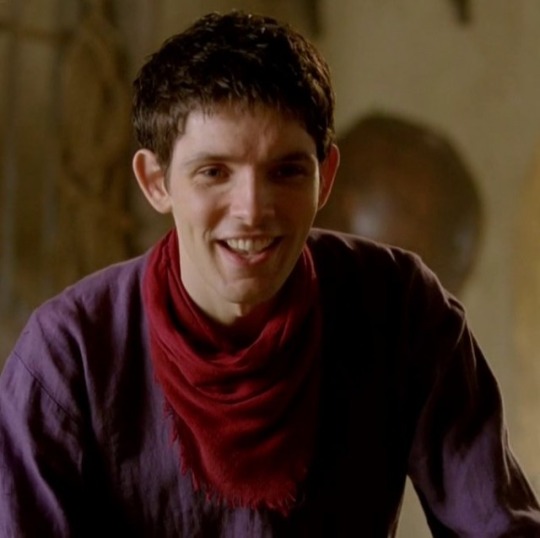
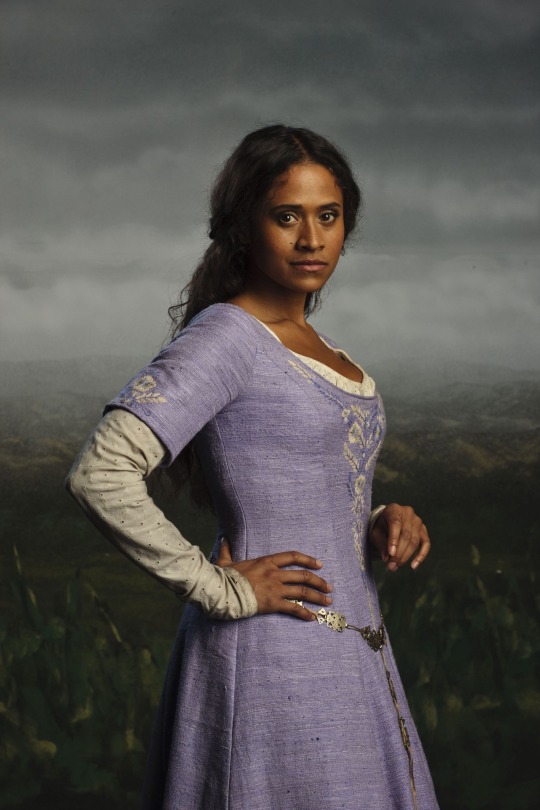
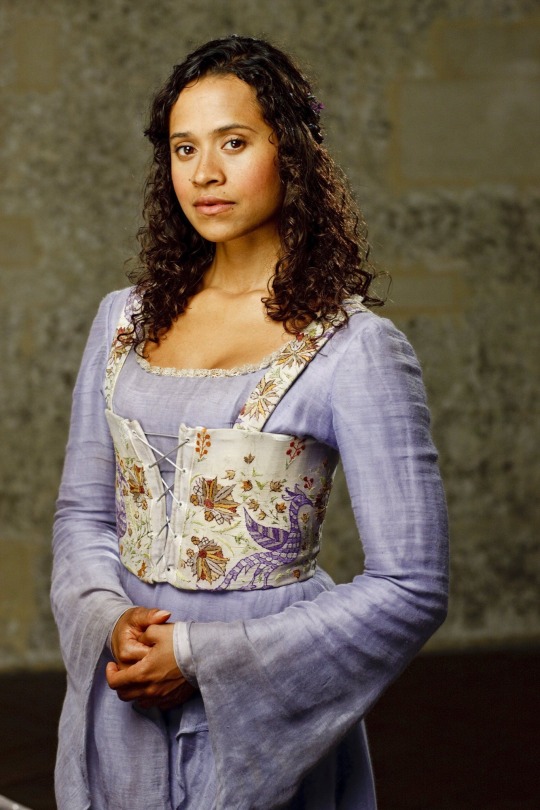
it was illegal for peasants to wear expensive fabrics because of the Sumptuary Law. Basically it makes sure that lower class people are not fashionable. However, BBC Merlin doesn’t seam to care about that law, considering Merlins other bright clothing so take this was a grain of salt.
Basically what I’m trying to say is that there’s no way they could have gotten their hands on these clothes without the help of nobles. Gwen might have, because she works with clothing and could have easily mixed blue and red dye together. Merlin probably not have because he’s never shown to be particularly materialistic or interested much in fashion, despite his bright clothes. Bright Purple would have been much, much harder to get.
It makes the most sense for Merlin and possibly Gwen too to have been gifted such expensive clothing by a noble for being a good servant. I’d imagine Arthur would be the one to give Merlin the tunic and morgana the dresses.
Why does this matter? Lavender(and also purple in general) was considered a queer color starting in the 19th century. Queer men especially were said to possess a “streak of lavender” and a serge of homophobia at the time was often referred to as the “Lavender Scare.” Purple and lavender is still used now to symbolize queerness.
Since Merlin is a modern interpretation of Arthurian myths, it would be perfectly plausible that this symbol was on purpose. Merlin/Arthur and Gwen/Morgana are both extremely popular ships and they are both shown to have a very deep form of trust(Gwen/Morgana being at the beginning of the show). Arthur and Morgana gifting Merlin and Gwen purple clothing could be show them they accept their queerness and/or signaling their own queer attraction to them.
Now, this next symbolism concerns only Merlin/Arthur.
Merlin is shown to have three neckerchiefs.
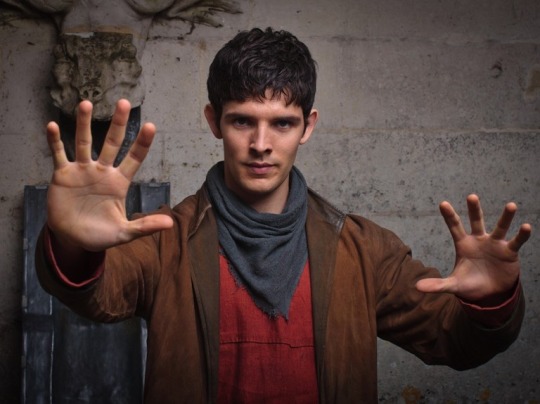


Navy blue, red, and light grey. Why does this matter? Well, let’s take a look at something called the handkerchief code, also known as the hanky code or “flagging.”
This code has its origins all the way back in time during the Wild West in the USA, but got more popular during the late 20th century in USA and UK gay bars. This code was used mainly by queer men and some nonbinary people to signal to other queers what they wanted sexually. While typically worn in people’s back pockets, a handkerchief could also be worn around one’s neck to show they are a versatile and experienced.
According to this code, Merlin is into;
Red: fisting and getting fisted. This color was hard to get an exact shade from, but the second best option was dark red for double fisting which is honestly so similar I’m not sure if it really matters much.
Light grey: stone topping and getting fucked by a stone top
Navy blue: fucking and being fucked anally
For any one wanting to make their own interpretations of Merlins neckerchief colors(the lighting makes it hard to tell the exact ones) have a look at this handy chart
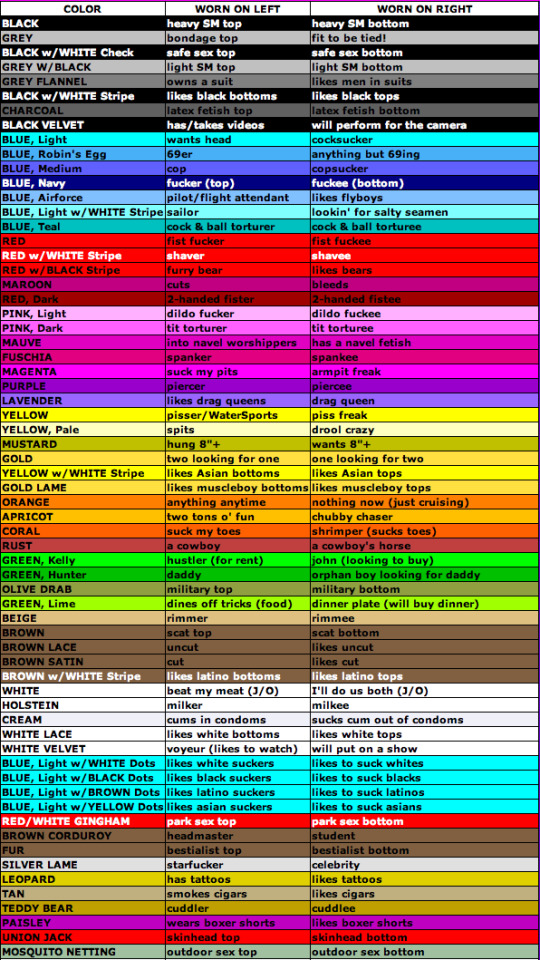
Not only that, but Arthur is seen wearing a favour on his left arm in s3 ep 4.
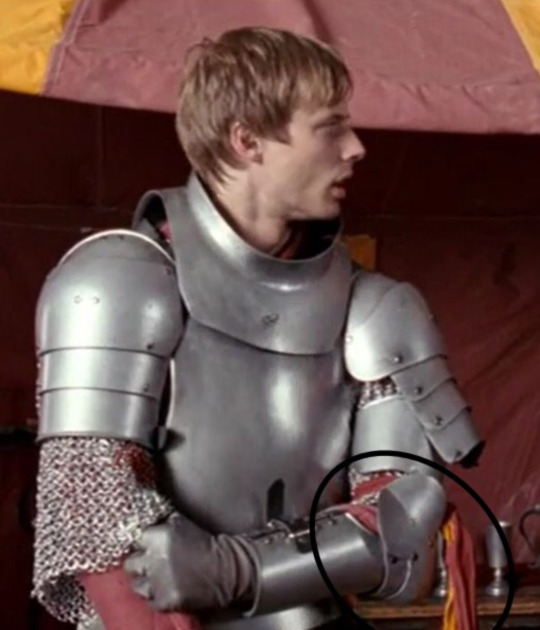

What’s a favour? It’s a fabric strip of affection commonly given by maidens to knights before a tournament as a symbol of good luck. It’s often a very important scarf, hankcerchlif , towel, really any bit of cloth that can be tied around someone’s arm. This is also a popular trope in historical media for a female love interest to give a favour to a male one to show chemistry between them.
Regardless of your stance on Merlins gender identity, you have to admit how commonly Merlin is shown to be gender nonconforming(GNC) or otherwise be associated with “womanly” qualities. Especially in a society so heteronormative, the only “pure” option for a knight receiving a romantic gesture would have it be from a woman. If the token was from a queer man, it would also out the noble and cause lots of horrific chaos and destroy both of their reputations.
Even if it was common for women to give knights favours, queer men still existed and with that came romantic gestures—this time hopefully more secret.
Even though the favour on Arthur’s arm doesn’t look exactly like Merlin’s neckerchief, Merlin was the only person to speak with him while preparing for the tournament. Also, the original theorist who I linked in my sources also pointed out that Merlins neckerchief looks lopsided. Almost like Merlin tore off a bit of it and hastily tied it back on.
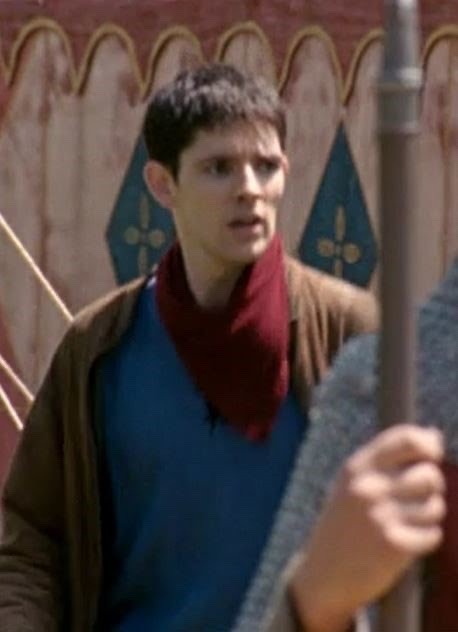
Although this theory is definitely flawed, it doesn’t matter. Arthur is still wearing a red handkerchief on his left arm. But what does that tell us exactly?
Regardless of wether or not it was Merlin’s, the red is the same shade and also implies Arthur is also into fisting. What about the placement? Sicne it’s on his left, it shows that he is a top/dom, meaning that he prefers to be the one fisting. Since it is worn around his upper arm, it shows that he is simply into the fetish, compared to what other placements mean. In another source, it shows taht upper arm means switch, but because Arthur is wearing it on his left it wouldn’t really make sense for him to signal being a “top-switch” compared to being a top and having the fetish in general.
If you look closely, you can see a different colored stripe on the favour. It’s hard to tell exactly what the color is, it could be yellow, gold, orange, etc. because the color is so dubious, I’ll just leave y’all with a list of color meanings that may apply to Arthur’s favour.
YELLOW: pisser/watersports kink
YELLOW, Pale: spitter/spit kink
MUSTARD: Has 8+ inch dick
GOLD: two looking for one
ORANGE: anything anytime
Also, it’s important to bring up what many in thsi fandom refer to as the “fisting scene.” Where Arthur threatens Merlin by showing him his gloved fist and pulling a bit at the glove.
youtube
In the blooper, you can see Merlin’s actor(Colin Morgan) breaking character and giggling as Arthur shows him his fist. Many in the fandom agree that this was a clear innuendo for fisting, and it is very well possible.
Merlin is shown hitting Arthur and saying he was just doing some horse play, but still indirectly convincing Arthur that he needs to teach Merlin a lesson. This is actually a common act in BDSM sex, where the submissive person purposely angers the dominant into punishing them in a way that somehow involves sex or fetish play.
If you look closely, you can see Merlin is wearing at kinky red fisting handkerchief, showing Merlin is perfectly capable of being a submissive fistee. Also, the hanky code also includes other symbols such as latex or rubber gloves that, surprise surprise, also mean fisting. Although it’s more likely Arthur’s gloves where made of leather, it can still further be interpreted as a fisting symbol if you want. Either way, Arthur’s favour still holds water as he is undoubtedly the dom in this situation.
Also, Merlin is very impulsive and a madlad. Tell me he wouldn’t wear his secret fetish symbols infrount of stuck up, Roman Catholics who are none the wiser. He’d probably think it’s hilarious which is probably why he wears them almost everyday. Merlin loves playfully misbehaving(and is also a brat sometimes) so it makes sense for him to have some dangerous fun.
Now, you may be asking. Why does this matter? At the end of the day, it probably wasn’t intentional. Well, there is alwyas room for doupt BUT I do have some ferther proof. One of the co writers of BBC Merlin—Johnny Capps—actually won a Stone Wall Award. You know, an award named after a core part of queer culture?
The award’s website and Wikipedia page say they give the award for art that describes the LGBT experience well. While I am unsure why or what Capps made to be nominated, it still shows he is very much in touch with queer culture. Capp himself even said at an interview about Merlin, “... in the end, deep, deep down it’s about sexuality and things you just can’t tackle head-on.”
Well, what says more about sexuality than the main characters fist fucking each other? That’s a lot of sexuality. While I am unsure of Capp’s age, he does look to be about middle age and it would make sense for him to know about a code popularized in a 70s to 90s. Especially for someone who has made multiple queer oriented stories in his life time.
Sources:
Why is purple considered the color of royalty?
Sumptuary law
How lavender became a symbol of LGBTQ resistance
How Lavender Became a Symbol of LGBTQ Resistance(part 2)
flagging opinicus rampant
Handkerchief code
DO YOU KNOW THE HANKY CODE?
Picspam: The Red Favour (Proof of Arthur Wearing Merlin's Favour in 3x04)
Five medieval love tokens
The Lady's Favour
Hanky codes
Nominees for Stonewall Awards announced
Merlin series 5 spoiler-free launch report
Pls reblog I spent hours on this /np 😭👊
#tw kink mention#tw sex talk#tw eye strain#tw homophobia#tw queerphobia#research essay#long post#Merlin#bbc Merlin#Merlin bbc#merthur#merlin/arthur#gwen/morgana#morgwen
345 notes
·
View notes
Text
Impressions of Wilde (1997)
I really liked this movie and I'm sure you will too! It's a great introduction to Oscar Wilde (who he was, a glimpse into his personal life, and why he remains relevant and incredibly charming) and also a celebration of homosexuality.
1. Overview:
The movie doesn’t tell the whole story of Oscar Wilde's life. It covers the 1880s, his rise to fame and sudden fall, and ends shortly after his 1897 prison release. Some Oscar Wilde fans were disappointed because they wanted to see the early parts of his life (how he got his inspiration and crafted his aesthete persona).
The costumes and sets are absolutely gorgeous and transport you back to the late Victorian era; lots of deep red fabric curtains, detailed mahogany wood furnishings, intricate paintings, and lavish costumes.
The lead actors are amazing and they resemble the real people almost exactly.
2. Casting:
Stephen Fry as Oscar Wilde. One could say he IS Oscar Wilde reincarnated; he looks almost exactly like Wilde. Most importantly he perfectly combines Wilde's charm and intelligence. The film also tries to show Wilde as a father and married man in addition to the "gay fop" identity that he's usually placed in. As much as he mocks society, he's kind and loving (still cares about Bosie even though it's obvious at times that Bosie doesn't deserve his kindness).
Jude Law as Lord Alfred "Bosie" Douglas, Wilde's lover. I must say that Bosie definitely reminds me of Dorian Gray because he's blond, beautiful, and selfish. He throws lots of temper tantrums and reminds me of a teenage boy trying in vain to rebel against his father, the Marquess of Queensbury (Wilde's enemy who plays a big part in his downfall). He does seem to care for/love Wilde, but is still selfish in that his first concern is himself.
Jennifer Ehle as Constance Wilde. You may know her as Elizabeth Bennet from the 1995 BBC version of Pride and Prejudice. Film Constance is quite intelligent and unconditionally supportive of Oscar Wilde.
3. Scene Recaps:
The film begins quite unusually in the Wild West (no greater contrast between the gritty Colorado mining town and the elegant parlors of London). Wilde makes his entrance in a fancy fur coat, dressed to kill. He successfully entertains the miners with a story about an artist.
Back to London; Wilde was in Colorado on his North American lecture tour. At a party he meets Constance and marries her "because all artists need an audience." Quite an interesting quote because there's this general conception that artists are isolated people who need to get away from society to produce their best works, when in actuality they need others to appreciate their works. Constance is a good match for Wilde because she's intelligent and constantly (coincides with the name) supports him even though he cheats on her with his gay buddies.
We are then treated to a lovely scene where he walks through a crowd of lawyers (marking him as a nonconformist).
Robbie Ross, one of Wilde's best friends, introduces him to gay sex.
“Dinner with lord and lady Asquith” = code language for a fling.
Then he meets John Gray, a handsome bohemian played by Ioan Gruffud, a pretty guy with long hair, and has another fling with him. Gray brings up the idea of art as a means of capturing the soul (inspiration for The Picture of Dorian Gray, which brings scandal to the Wilde family).
Oscar Wilde has 2 boys with Constance. He loves his family and cares about the wife but he’s always away in London working on his plays/stories or having flings with his gay buddies.
I really liked how the film used Oscar Wilde's children's story The Selfish Giant as a metaphor for his relationship with his family. His success isolates him from his family; he's often away and doesn't visit often, much like the giant hides behind a wall.
He meets Bosie at the premiere of the play Lady Windermere’s Fan (not historically accurate). Bosie says something smart to flatter Wilde, summing up what Wilde did in his work: using wit to mock and amuse people simultaneously.
Bosie is a beautiful, selfish rich boy and wants Wilde for his own entertainment. He has some affection for OW but loves himself first; Wilde's friends and Robbie Ross are concerned for him. Wilde and Bosie have a passionate, open relationship. At times Bosie has sex with other men while Wilde watches.
They dine together without a concern for others’ opinion (another of my favorite scenes from the movie).
Wilde genuinely loves Bosie and sees him as the victim of bad parenting (what a pity, since it's unclear at times whether Bosie loves Wilde).
Eventually because of his relationship with Bosie, Wilde makes a powerful enemy in Bosie's father, the Marquess of Queensbury. Queensbury attempts to insult Wilde several times before sending him a card accusing Wilde of being a sodomite. Wilde sues for libel and that precipitates his downfall, as all the details of his personal life are revealed.
In the trial, Wilde tries to explain "the love that has no name" and is convicted. Then follows a heartbreaking scene where he tries to maintain his composure while being haggled and booed at by spectators, while his friends can only watch in silence.
Bosie swears to Wilde that he loves him, but while Wilde languishes in jail, he complains that the imprisonment affects him most as he's suffering (what a selfish person).
I have ambivalent feelings about the “happy” ending where Oscar Wilde is reunited with Bosie. As much as I like happy endings in LGBTQ+ movies (because that doesn't often happen), Bosie clearly isn't a very good person and maybe would have been bored with Wilde and left him.
4. Some things not included in the movie:
The film doesn't include the fact that Oscar Wilde slept with teenage boys and male prostitutes. The flings seemed to be consensual but some of the sexual partners were underage.
Constance is advised to change her last name to save her social reputation, but the film doesn't show that she actually did (changed it to Holland).
The last part of the film (the trial to the ending) merely serves to remind us that Wilde was courageous for being a nonconformist in a stifling society. They don't really show what happens to Wilde after his imprisonment with the exception of the reunion with Bosie.
Conclusion:
Definitely watch this movie if you haven't already; it's an excellent introduction to Oscar Wilde, or if you're a Wilde fan, it will be great entertainment.
I was going to write some more intelligent things about this movie but I just started college and I didn't get around to finishing this little post until a few weeks after I watched the movie (so I've forgotten some stuff in it/my other thoughts about it).

#oscar wilde fan#wilde 1997#wilde#jude law#stephen fry#stephen fry was born to play oscar wilde#jude law is hot#jennifer ehle#the picture of dorian gray#dorian gray#the importance of being earnest#lady windermere's fan#salome#an ideal husband#love this movie#favorite movies#movie review
69 notes
·
View notes
Note
I’m just really confused as to where this idea that Zuko is gaycoded came from. Like people are allowed to have that headcanon but I don’t understand where people are coming from when they try and claim that he was undisputedly gaycoded and trying to deny it is homophobic when he’s only ever shown romantic interest in women.
I made a pretty long post on the topic a while back, but the ultimate gist of it is this: there are a lot of elements of Zuko's status as an abuse victim and trauma survivor that resonate with queer folks. This is understandable and completely fine! However, there are some parts of the fandom who have taken that to the other extreme and will now insist that those elements are uniquely queer, and that they can only be read as some sort of veiled gay/coming out narrative, even though that doesn't make much sense since there is no part of Zuko's narrative which is unique to any sort of queer experience.
I think the problem really does stem from two things being conflated--Zuko's history of abuse and trauma, and trauma&abuse being something a lot of queer people have experienced. I suspect it goes something like 'I see a lot of myself in Zuko, and I was abused for being gay, therefore Zuko must be gay too in order to have had similar experiences.' This can then lead to feeling dismissed or invalidated when other people point out that those experiences are not unique to being queer--but on the flip side, abuse victims and trauma survivors whose abuse&trauma do not stem from queerness (even if they are queer themselves) can feel invalidated and dismissed by the implication that their trauma must be connected to their queerness or it isn't valid.
This is also where the 'people don't actually know what gay coded means' part comes in, and I realize now that I didn't actually get into what gay coding (and queer coding in general) actually means, since I was so hung up on pointing out how Zuko doesn't really fit the mold. (And the few elements that exist which could be said to count are because of the 'villains historically get queer coded bc Hays Code era' thing and mostly occur in Book 1, not because of how he acts as an abuse&trauma survivor.)
Under a cut because I kind of go on a tangent about gay/queer coding, but I swear I get back to the point eventually.
Queer coding (and it is notable that, with respect to Zuko, it is almost always framed as 'he couldn't possibly be attracted to girls', rather than 'he could be attracted to boys as well as girls' in these discussions, for... no real discernible reason, but I'll get into that in a bit) is the practice of giving characters 'stereotypically queer' traits and characteristics to 'slide them under the radar' in an era where having explicitly queer characters on screen was not allowed, unless they were evil or otherwise narratively punished for their queerness. (See: the extant history of villains being queer-coded, because if they were Evil then it was ok to make them 'look gay', since the story wasn't going to be rewarding their queerness and making audiences think it was in any way OK.) This is thanks to the Motion Picture Production Code (colloquially and more popularly known as the Hays Code), which was a set of guidelines which movies coming out of any major studio had to adhere to in order to be slated for public release and lasted from the early 1930s until it was finally abandoned in the late 60s.
The Hays Code essentially existed to ensure that the content of major motion pictures would not 'lower the moral standards' of the viewing public. It didn't just have to do with queerness--cursing was heavily monitored, sex outside of marriage was not allowed to be seen as desirable or tittilating, miscegenation was not allowed (most specifically interracial relationships between black and white people), criminals had to be punished lest the audience think that it was ok to be gay and do crime, etc. Since same-sex relations fell under 'sexual perversion', they could not be shown unless the 'perversion' were punished in some way. (This is also the origin of the Bury Your Gays trope, another term that is widely misunderstood and misapplied today.) To get around this, queer coding became the practice by which movies and television could depict queer people but not really, and it also became customary to give villains this coding even more overtly, since they would get punished by the end of the film or series anyway and there was nothing to lose by making them flamboyant and racy/overly sexual/promiscuous.
Over time, this practice of making villains flamboyant, sexually aggressive, &etc became somewhat separated from its origins in queer coding, by which I mean that these traits and tropes became the go-to for villains even when the creator had no real intention of making them seem queer. This is how you generally get unintentional queer-coding--because these traits that have been given to villains for decades have roots in coding, but people tend to go right to them when it comes to creating their villains without considering where they came from.
Even after the Hays Code was abandoned, the sentiments and practices remained. Having queer characters who weren't punished by the narrative for being queer was exceptionally rare, and it really isn't until the last fifteen or so years that we've seen any pushback against that. Buffy the Vampire Slayer is famous for being one of the first shows on primetime television to feature an explicitly gay relationship on-screen, and that relationship ended in one of the most painful instances of Bury Your Gays that I have ever personally witnessed. (Something that, fourteen years later, The 100 would visually and textually reference with Lexa's death. Getting hit by a bullet intended for someone else after a night of finally getting to be happy and have sex with her s/o? It wasn't remotely subtle. I don't even like Clexa, but that was incredibly rough to witness.)
However, bringing this back to Zuko, he really doesn't fit the criteria for queer coding for a number of reasons. First of all, no one behind the scenes (mostly a bunch of cishet men) was at all intending to include queer rep in the show. This wasn't a case where they were like 'well, we really wanted to make Zuko gay, but we couldn't get that past the censors, so here are a few winks and a nudge', because it just wasn't on their radar at all. Which makes sense--it wasn't on most radars in that era of children's programming. This isn't really an indictment, it's just a fact of the time--in the mid/late 00s, no one was really thinking about putting queer characters in children's cartoons. People were barely beginning to include them in more teen- and adult-oriented television and movies. It just wasn't something that a couple of straight men, who were creating a fantasy series aimed at young kids, were going to think about.
What few instances you can point to from the series where Zuko might be considered to exhibit coding largely happen in Book 1, when he was a villain, because the writers were drawing from typically villainous traits that had historically come from queer coding villains and had since passed into common usage as villainous traits. But they weren't done with any intention of making it seem like Zuko might be attracted to boys.
And, again, what people actually point to as 'evidence' of Zuko being queer-coded--his awkwardness on his date with Jin and his confrontation with Ozai being the big ones I can think of off the top of my head--are actually just... traits that come from his history of trauma and abuse.
As I said in that old post:
making [zuko’s confrontation of ozai] about zuko being gay and rejecting ozai’s homophobia, rather than zuko learning fundamental truths about the world and about his home and about how there was something deeply wrong with his nation that needed to be fixed in order for the world to heal (and, no, ‘homophobia’ is not the answer to ‘what is wrong with the fire nation’, i’m still fucking pissed at bryke about that), misses the entire point of his character arc. this is the culmination of zuko realizing that he should never have had to earn his father’s love, because that should have been unconditional from the start. this is zuko realizing that he was not at fault for his father’s abuse--that speaking out of turn in a war meeting in no way justified fighting a duel with a child.
is that first realization (that a parent’s love should be unconditional, and if it isn’t, then that is the parent’s fault and not the child’s) something that queer kids in homophobic households/families can relate to? of course it is. but it’s also something that every other abused kid, straight kids and even queer kids who were abused for other reasons before they even knew they were anything other than cishet, can relate to as well. in that respect, it is not a uniquely queer experience, nor is it a uniquely queer story, and zuko not being attracted to girls (which is what a lot of it seems to boil down to, at the end of the day--cutting down zuko’s potential ships so that only zukka and a few far more niche ships are left standing) is not necessary to his character arc. nor does it particularly make sense.
And, regarding his date with Jin:
(and before anyone brings up his date with jin--a) he enjoyed it when she kissed him, and b) he was a traumatized, abused child going out on a first date. of course he was fucking awkward. have you ever met a teenage boy????)
Zuko is socially awkward and maladjusted because he was abused by his father as a child and has trouble relating to people as a result. He was heavily traumatized and brutally physically injured as a teenager, and it took him years to begin to truly recover from the scars that left on his psyche (and it's highly likely, despite the strides he made in canon, that he has a long way to go, post series; it's such a pity that we never got any continuation comics >.>). He was not abused for being gay or queer--he was abused because his father believed he was weak, and part of Zuko's journey was realizing that his father's perception of strength was flawed at its core. That his entire nation had rotted from the inside out, and the regime needed to be changed in order for the world--including his people--to begin to heal.
That could be commingled with a coming out narrative, which is completely fine for headcanons (although I personally prefer not to, because, again, we have more than enough queer trauma already), but it simply doesn't exist in canon. Zuko was not abused or traumatized for being queer, and his confrontation with Ozai was not about him coming out or realizing any fundamental truth about himself--it was about realizing something fundamental about his father and his nation, and making the choice to leave them behind so that he could help the Avatar grow stronger and force things to change when he got back.
TL;DR: at the end of the day, none of the traits, scenes, or behavior Zuko exhibits which shippers tend to use to claim he was gay-coded are actually evidence of coding--they aren't uniquely queer experiences, as they stem from abuse that was not related in any way to his sexuality, and they are experiences that any kid who suffered similar abuse or trauma could recognize and resonate with. (Including straight kids, and queer kids who were abused for any reason other than their identity.) And, finally, Zuko can be queer without erasing or invalidating his canon attraction to girls, and it's endlessly frustrating that the 'Zuko is gay-coded' crowd refuses to acknowledge that.
133 notes
·
View notes
Text
Why Naoto is Heavily Trans Coded, and How The Discussion Surrounding Him Needs to Change
Hello, I’ve never written or posted anything like this before LOL so this is a bit daunting. But this subject is something that’s been bothering me for a long time, and I wanted to get it out somewhere. So let’s talk about how Naoto Shirogane is heavily trans coded, and how the fandom has a problematic culture surrounding the issue that really needs to change.
Tw // discussion of misogyny , transphobia , and mentions of harassment

Initial Shadow Confrontation
Since the discussion is most often about what’s “canon” and what’s not, let’s first take a look at what the game actually does give us about Naoto’s character. During the confrontation with Naoto’s shadow, we learn that Naoto idolized detectives as a kid, and wanted to be one himself when he was older.
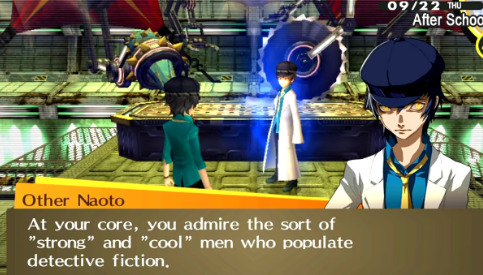
However, this posed a problem for him in multiple ways. One, he was (is) still a child, and the people in his field don’t take him seriously because of it. He tries desperately to escape this fact, to try and act as mature as possible, but ultimately he can’t change how others will perceive him at his age.

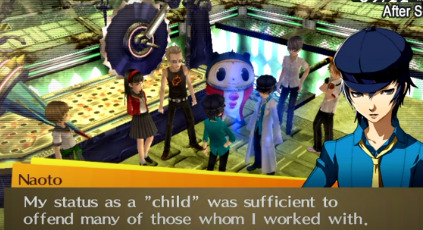
This is what the shadow confrontation focuses on most heavily. But then it switches to discussing the other part of the issue-- the fact that Naoto’s ideal image of a detective is a man, and he “isn’t.”
At the end, Yukiko says “You must know already that what you yearn for isn’t to become an adult or to become a boy,” and Naoto accepts it. This is what most people point to when saying that Naoto can’t be trans, because he agrees that it wasn’t what he wished for. So, easy, right? If you take this as him telling the truth, then it looks like an open and shut case-- he isn’t trans. But Naoto’s actions don’t really fit what he says here.
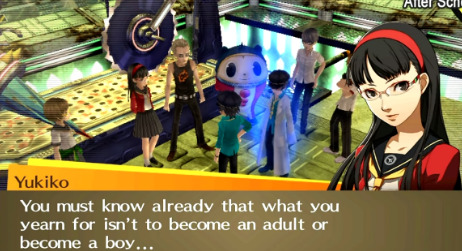
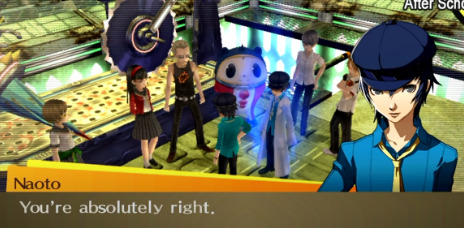
The issue starts with these next lines (below) in particular. To me, Naoto’s tone in the first line is regretful, and doesn’t strike me as a sentiment someone who is cisgender would necessarily hold. Why would he want to “change into a man?” To fit his ideal image of a detective? As he says here, yes.
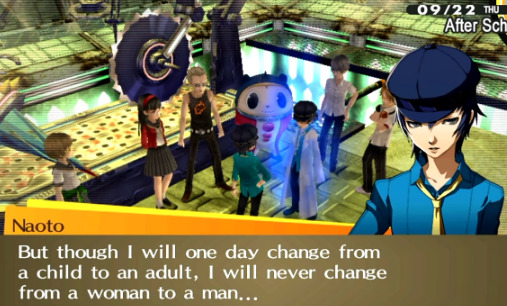
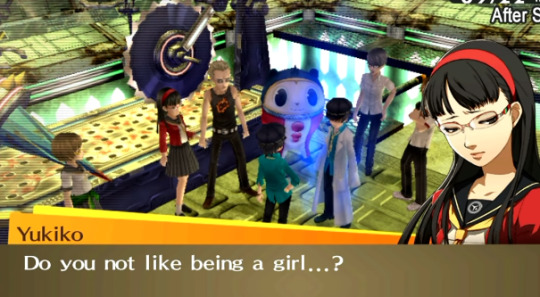
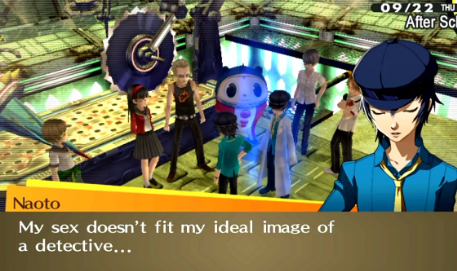
(Real quick before I continue, it’s not clear in the dialogue screenshot but it’s important to note that Naoto does say “yes” to Yukiko’s question about him not liking being a girl. He nods his head)
The narrative that the game tries to go with after this is that the “ideal image�� Naoto wanted to live up to, including the male aspect of it, was unattainable and formed primarily because he felt that was the only way he could be a detective.
But, is this really that much of a problem? We all look up to certain types of people, people that we want to be like-- and for many, this can factor into gender identity as well. If Naoto really just wanted to be a cool, male detective, that doesn’t at all negate that being trans would be a part of that for him.
Naoto’s other words and actions, as well as the framing of this scene as a whole, make the scenario feel a lot less believable to me for multiple reasons. Naoto never initiates the conversation that him wanting to be a boy is incorrect-- Yukiko does. Naoto isn’t even the one to trigger his shadow-- Kanji does that. Naoto had a lot less agency in a lot of these decisions than the other characters did with their shadows.
Naoto’s Continued Actions
The fragility of the narrative Atlus put together for Naoto continues to grow throughout the rest of the game, due to the way he behaves after the initial shadow confrontation.
For starters, it’s implied that Naoto is not his birth name, something that i think a lot of people either miss or forget about-- and yet he continues to go by it throughout the course of the game. We never find out his deadname and he never expresses a desire to share it with anybody.
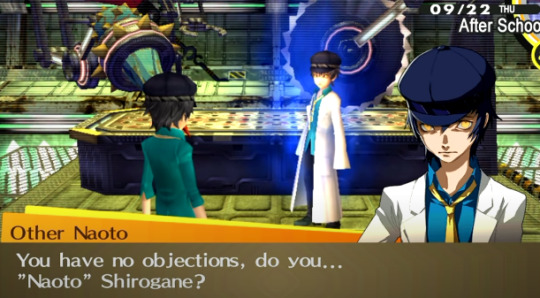
The day after the “reveal,” Naoto doesn’t change anything about his appearance, mannerisms, or how he presents himself. He honestly seems uncomfortable with the fact that everyone has found out, in a way that felt much like being outed to the whole school, as opposed to finally being seen and accepted for who you “really” are.
I understand that such a drastic shift in people’s perception of you would be overwhelming to anybody, no matter if you were cis or not. But if Atlus really wanted to hone in on the idea that Naoto was happy about this change, they could’ve at least made him…. Well, happy about it. Even if it was just a small smile, just a tiny indication of relief even despite how hard it will be to adjust, it would’ve made it at least a little more believable that this is what he really wanted.
But that’s not the case. Instead, he’s uncomfortable, he still binds, he still wears the school’s male uniform, and he still goes by Naoto. The only time any of this actually changes is if you as the protagonist push him to, which… is a whole other mess.
The fact that Naoto has even gotten to this point, though, speaks more volumes to me than anything else. Passing is not easy. Coming out is not easy. Naoto would have had to go through difficult lengths in order to get not only his school, but the country and media to see him as a man. He’s a well-known "detective prince".. someone was bound to look up his records and find out about it. That's a huge risk to take.
In addition to this, he binds. He goes by masculine pronouns and a masculine name. He very audibly changes his voice to be more masculine. I don’t know how to tell you this, but this is just…. not something cis people do? At least not comfortably.
In fact, doing all of this would have been incredibly uncomfortable for Naoto if he was cis. As someone who experiences dysphoria, looking like and being seen as a gender you are not can be really, really painful. If transitioning was something he really didn’t want, why would he put himself through all of that? Was it really to escape misogyny? Me asking this isn’t minimizing the issue at all, because I understand that it’s incredibly serious and hard for countless women. But I would generally think someone’s first reaction to facing misogyny isn’t to… completely change their identity and present as a different gender.
On top of being probably the hardest option of escaping misogyny available to him, and one of the most uncomfortable, presenting as a man doesn’t necessarily get rid of any prejudices Naoto may face. In fact, I would argue that it’s considerably more dangerous. Especially in a rural town like Inaba, where people seem to not really understand or approve of being LGBT. Naoto is smart, he would have thought of all of this. So why?
Inherent Transphobia of Naoto’s Arc
There is something to be said about how much misogyny is present in Japan’s workforce, especially in fields like Naoto’s, and the importance there is in discussing that. The base idea behind his struggles and message isn’t inherently a bad one, but the way the game went about it was problematic because it put down transgender identities in the process.
The first time I watched Naoto’s shadow confrontation, it was really distressing to me. The game continuously repeats the idea that you can’t “cross the barrier of the sexes,” that Naoto “can never really be a man,” and that “you can change your name, but you can never change who you “really” are.” I hope I don’t need to explain why this is a problem.
Naoto’s wish to be a man, regardless of what was driving it, is depicted as something temporary and childish. Something that Naoto “didn’t really want,” something that was just an excuse to run away from the misogyny he was facing. Even if it was unintentional, this message is incredibly harmful to transgender people.
It would have been a better and much more coherent message about misogyny if the writers had steered clear of trans themes entirely. In fact, I think they did so well with Sae’s character in Persona 5-- she’s in the same field of work, facing very similar struggles, but she doesn’t react in the same way as Naoto at all.
Kanji and Homophobia
It’s even worse that Naoto’s “reveal,” on top of being problematic by itself, is used as a method to bury Kanji’s exploration of his own sexuality. The problems with Kanji’s own shadow are bad enough to warrant their own long rant, but the reveal that Naoto was “really a girl” this whole time allows the story to completely wave off his gayness for good.
This isn’t something unique to this game-- the trope of “two boys fall in love, but one of them turns out to be a girl so it’s fine” has been used numerous times in other media to explore the topic half-assedly. It plays with the “exoticness” or “drama” of a gay romance, but backs off at the end in order to uphold societal norms and prevent backlash.
This doesn’t really give any kind of good commentary on gay relationships, nor does it depict them in a positive or helpful manner. It isn’t something that these games should be getting kudos for doing.
Misogyny?
I think there’s also something to be said about how poignantly bad Atlus is at really tackling the problem of misogyny. It tries, especially with characters like Ann and Sae, and in certain aspects it can succeed. But then they have scenes like the pageant and Every Beach Scene Ever, where the women are forced to wear swimsuits or revealing clothing against their will, or their bodies are talked about without their consent. There is consistently a character in each persona game who is forced to do the whole misogynistic dipshit gimmick that’s supposed to be funny-- Junpei, Yosuke, Teddie, Morgana, Ryuji-- and while this is obviously not a Persona specific problem by a longshot, it’s still indicative of how unsuccessful these games often are in delivering the message that society’s systemic misogyny is an issue.
This is something I think about a lot when people try and argue that Naoto’s story can’t be about him being trans because it’s “an important message about misogyny.” Atlus often doesn’t deliver on such stories already, and they certainly didn’t with Naoto. As soon as Naoto returns to “living as a woman” he’s subjected to the same misogyny that the other girls are. His chest is commented on, he’s forced to be in the beauty pageant, he’s made uncomfortable in the bath scenes-- really, all Atlus did after the reveal was make the problem worse for him.
On top of this, his story never actually meaningfully tackles the problem of misogyny in the detective force. It’s not a major part of his social link or the general plot of the game-- honestly, it’s barely even touched on at all after the initial confrontation. Thus, the idea that “Naoto can’t be trans because it erases a story about misogyny” is just plain untrue. There never was a coherent one in the first place.
Problems Within the Fandom
Despite all of this, there is such an intense backlash from the majority of the fandom if anybody dares to bring up these issues with Naoto’s story. Naoto being trans is generally seen as something ridiculous and stupid, or something to insult and mock people for.
I understand that there's always going to be people who say provocative stuff like this, no matter what anyone does, and that it’s not something exclusive to this particular fandom or character. But the problem is that this rhetoric isn't just from them anymore--the consensus among so much of the fandom seems to be either that Naoto absolutely cannot be trans, or that speaking about it at all is "annoying discourse" and taboo. Even from fans that are LGBT or allies themselves.
This in and of itself is such a telling thing to me. if you find yourself getting angry about the subject, really ask yourself why. Is it such a problem for people to reclaim a transphobic story? Is it such a problem for a character to be trans in the first place? There is room for discussion and nuance regarding this situation, but we have to make it for ourselves. We can accept that Atlus’s base game will never actually give us a coherent story about either misogyny nor being transgender with Naoto’s story. But petty arguments and insults thrown at people who bring up this topic isn’t any of that-- it’s just poorly masked transphobia.
So at the end of the day, no, Naoto being is trans is not “canon.” Of course Naoto would not actually be allowed to be trans, he is a main character in a game series where the only explicitly LGBT characters have been consistently buried, stereotyped, or demonized with only a few rare exceptions.
Yes, you’re allowed to headcanon whatever you want about him. I can’t stop you from wanting a story about misogyny, or from seeing Naoto’s gender as something more fluid than I do. But you can’t ignore the fact that his story, as written in canon, is laden with transphobia despite its intentions. It’s not a ridiculous or harmful thing for trans people to want to reclaim that.
There are still a lot more issues with how Naoto is treated in the game-- especially in his romance route-- but that’s a whole other can of worms I’m not ready to unpack today lol
Hopefully all of this made sense though, and feel free to bring up anything else I may have missed or point out any issues you might have with it :-) Thanks for reading!
#persona 4#naoto shirogane#p4#persona#naoto#trans naoto#meta#long post#discourse#misogyny#transphobia#god?? god!! help me#this is literally such a mess lol But#sorry for lack of pictures in the second half also
195 notes
·
View notes
Text
The Stonewall Riots of 1969

1) Current State of Being (it was not good, fam, not good)
To set the scene, we’re in the late sixties. We’ve won the second World War, and suddenly everyone’s dealing with the fact that the patriotic frenzy America has been whipped into isn’t really having the same purpose it used to. Thing is, everyone’s still really heated along the basic lines of DEATH TO COMMUNISM AND ALSO COMMUNISTS. During the war, this was helpful. It created a sense of unity. But once the war was over, attention turned inward.
At this time, there was also research that queer people were "sex perverts" and a government report even came out saying
"The lack of emotional stability which is found in most sex perverts and the weakness of their moral fiber, makes them susceptible to the blandishments of the foreign espionage agent [...] the pervert is easy prey to the blackmailer.
This same report also cited a case of a gay man "who's homosexuality was used by the Russians [who were communist] to recruit him as a double agent before world war 1." Basically, the overall gist was that gay people were believed to either be communists now, or they would become communists because their brains were weaker.
Alrighty, but why were they easy prey? First, when it came to communism, they were just as susceptible as anyone else, but after steep laws against queer people were passed, blackmail became pretty real.
So... yeah, let's talk about a couple laws that were in place in the late sixties, shall we?
For the crime of sleeping with a consenting partner in the privacy of your own home you could face anything from:
A light fine
Five, ten or twenty years in prison
A life sentence
Electrical shock therapy
Castration
In addition, to target trans people, police had also dug out a law from the nineteenth century that was originally passed to supress angry tenant farmers who would don disguises and demonstrate against their landlords (law found in subsection 4 of section 240.35 of the New York Penal Code). The law stated that individuals could not wear more than three items of clothing that did not match their assigned gender at birth.If an officer thought you were breaking this law, they could arrest you and take you to a bathroom or similarly private location and have an officer who matched your presented gender either do a strip search or pat you down there to see if things matched.
Things got especially bad when New York realized they’d have to “clean up the place” in preperation for hosting the World Fair. In part, this meant a heavy crackdown on the gay community, and by extention, gay bars.
2) The Genovese Crime Family and Stonewall
At around this time, the Mob was starting to notice that gay bars were an excelent source of profit - since the prohibition era (1920-1933), limited access bars and speakeasies had popped up everywhere and since the gay community already couldn’t be themselves on the streets, they retreated to these more sheltered locations.
Three mafia members decided to open a gay bar because ohhh boy could you rake in some serious profit. Combined, the three of them put up $3500 to “renovate” the Stonewall Inn (which had gone through itterations of being a straight nightclub, straight bar, and gay restaurant in a sort of irregular cycle).
Renovations included building a stage to dance on, painting the walls black, and getting a jukebox. No running water, no fire exit, just the bare minimum. It certainly wasn’t legal.
When they opened (as a bottle club to get around pesky liquor laws), the bouncer would look through a little slat in the door and if you had a codeword or looked sufficiently gay, he’d let you in. You then had to sign up to be a part of the club (about a dollar) and write your name down on a sheet of paper. Of course, no one wrote down their real names.
The liquor in question was stolen, to begin with, and then heavily watered down with... questionably clean water, and then sold at about three times the original price in half-cleaned glasses (glasses were dunked in a bucket and then reused). Since none of the patrons really had high expectations anyway, they went with it. Needless to say, however, Stonewall was not a particularly nice place to be.
With all the money the trio raked in, a cut had to go to the Mafia man who controlled the district, and another cut went to paying of the notoriously corrupt 6th Precinct, to avoid getting the whole place shut down.
Because they were payed off, the police would only conduct their mandated raids early in the night before things got going, and on weekdays - this was when there weren’t a ton of people there, and it was easy to make it look like nothing was amiss.
3) The Raid (this is where shit gets real)
First of all, the thing is - no one knows why it happened. It just.... did.
On June 28th, 1969, at about 2am, the night was in full swing. The bar was crammed full of people dancing and drinking. The air was stuffy as usual and quite dark.
Then the bright flourescent lights come on - the signal that there was a raid and to seperate and to look less gay. The police came through, and called that they were making arrests. Everyone needed to line up against the wall and have their ID’s ready. Of course this was an issue, because just about everyone was legally not supposed to be at stonewall.
As the police began taking people outside, a crowd was going - raids at this time were... unusual to say the least. Some of the queens went into the back of the police cars without much of a fight - obviously they were terrified, but it didn’t look like there was much they could do.
One of them, however, and no one knows who for sure, was having none of this. Though Marsha Johnson and Sylvia Rivera have both been suggested as the starter of the riot, both have denied it, saying it was someone else. Storme DeLarverie, however, has both accepted and denied it was her. In an interview where she confirmed herself as the starter, she described her reaction, saying:
“The cop said ‘Move f****t’, thinking that I was a gay guy. I said, ‘I will not! And, don’t you dare touch me.’ With that, the cop shoved me and I instinctively punched him right in the face. He bled! He was then dropping to the ground - not me!”
She then turned to the crowd and yelled “why don’t you all do something?”
This was when things transformed. Objects started to fly. It was like someone had just punched a hole through the dam holding back the collective anger of the queer community.
A lot of the queer street kids, homeless, desperate, and with nothing to lose, were at the forefront of the fight, throwing anything from stones to pennies to bottles. Here’s the thing: no one really liked Stonewall - it wasn’t particularly nice or inviting or anything like that, but it was THEIRS and they were going to fight like hell for it.
Those being pulled out of the Inn started fighting back too - throwing what they could, kicking, punching, pushing back against the police. Marsha Johnson, a woman some have referred to as “basically a lesbian superhero” even climbed a telephone pole and threw an unidentified heavy object at a police car, shattering the window.
It was chaos and the crowd was still building. The flying objects didn’t stop, and it wasn’t like anyone had great aim - they were just as likely to hit a fellow protester - but there was a sense of comraderie and it made the police nervous. They were calling for reinforcements, but none were coming.
Finally, one of the police chiefs decided they had to retreat into Stonewall. They grabbed a few people as hostages and dissapeared inside, and barricaded the door. The inside of the Stonewall Inn was a wreck. The jukebox had been smashed. Same with the stage, the bathroom mirrors, and the cash register. Broken furniture was strewn on the floor.
Outside, the rioters had yanked a parking meter out of the ground and were trying to bash their way through the door, using it like a battering ram. Each thud made the officers even more nervous, and the captain, realizing things could turn from bad to horrific and deadly commanded his officers not to shoot unless he shot first. He went up to each one, commanding them individually by name, saying that if they shot without his direct sayso, they would be spend the rest of their police careers with only the worst possible jobs. To their credit, no one shot.
Outside, reinforcements finally arrived, armed in full riot gear - helmets, plastic shields, those club/baton things. They came forward in a full on phalanx. Then it started getting really ugly. People ended up lying on the sidewalk with blood coming from their heads or injured in other ways. The crowd started falling back, step by step. Finally, many of them ran.
But not to flee. Instead, they went all the way around the block and came up behind the reinforcement officers. Surprised that there was a new attack coming from behind, it was the police that began to loose the ground, and were forced to retreat back, back, back.
It was into the late, late hours of the night when the riots finally died down to nothing, the last of the crowd finally dispersed, exhausted.
4) The Next Day (aka a giant middle finger to the cops)
The shattered glass sparkled in the morning light the next day - a tribute to what had gone down the night before.
That night, the crowds around stonewall were huge. And it wasn’t just the queer community - the anti-war protesters and Black Panthers had joined in, standing against the even larger ranks of officers. The night before was a tipping point, but if momentum was to keep going, there needed to be sustained effort.
Inside, the Inn was back to normal. The Mafia had repaired the stage, gotten a new cash register, and even replaced the jukebox. It was if the efforts of the police had never even happened. Throughout the night, the queer community went in and out as though everything were totally normal - as if the police didn’t matter.
The riots were even worse than the night before, but the police couldn’t gain any ground.
Despite what was happening and the triumphs of the queer community, the press was a little less enthusiastic, aiming to diminish what had happened, taking the viewpoint of the police, or claiming the riots happened because of a celebrity’s death, and not the decades upon decades of oppression.
5) The Impact (how we got to today)
A year later, a lot of the Stonewall participants gathered to commemorate the movement. There were now several activism groups that had grown since the riots, but there needed a way to keep it growing - keep the flame from dying out.
One woman proposed that they have a march like the Civil Rights movement and Anti-war protesters were having. As soon as the question filled the space, there was unanimous consensus. Yes - they were to march.
It was terrifying. One member remembered fearing that only ten or so people would show up - that it was only going to make them into a laughingstock and nothing more. Indeed, many people had shown up with popcorn to “watch the f*gs” - it was seen almost as a show or performance.
But the moment was anything but. When the member looked back, in apprehension, what he saw wasn’t ten or the anticipated couple hundred people. No more than two thousand people had joined the parade. And not just the queer community - straight New Yorkers were there too. It was a moment of solidarity, and a demand for justice.
Every year since, there have been pride marches around the country, memorium to the community, and to the fight we’ve been fighting for a very long time, and to the patrons of Stonewall Inn who finally decided enough was enough.
6) Sources (because apparently trusting an unsourced tumblr posts is seen as an academic no-no)
(all in MLA because I just copy/pasted them from my research notes and also MLA feels official and all that)
Yardley, William. "Stormy DeLarverie, Early Leader in the Gay Rights Movement, Dies at 93." The New York Times, 29 May 2014, www.nytimes.com/2014/05/30/nyregion/storme-delarverie-early-leader-in-the-gay-rights-movement-dies-at-93.html?_r=0. Accessed 12 Apr. 2021.
Brown, Dalvin. "Marsha P. Johnson: Transgender Hero of Stonewall Riots Finally Gets Her Due." USA Today, 27 Mar. 2019, www.usatoday.com/story/news/investigations/2019/03/27/black-history-marsha-johnson-and-stonewall-riots/2353538002/. Accessed 12 Apr. 2021.
Burey, Jodi-Ann. "'It Wasn't No Damn Riot': Celebrating Stonewall Uprising Activist Storme DeLarverie." The Riveter, Feb. 2017, theriveter.co/voice/it-wasnt-no-damn-riot-celebrating-stonewall-uprising-activist-storme-delarverie/. Accessed 12 Apr. 2021.
Carter, David. Stonewall: The Riots That Sparked the Gay Revolution. 2nd ed., New York, St. Martin's Griffin, 2010.
Duberman, Martin B. Stonewall. New York, Plume, 1993.
Edsall, Nicholas C. Toward Stonewall: Homosexuality and Society in the Modern Western World. Charlottesville [Va.], U of Virginia P, 2003.
Kristi K. "Something like a Super Lesbian: Storme DeLarverie (In Memoriam)." The K Word, edited by Kristi K, 28 May 2014, thekword.com/2014/05/28/something-like-a-super-lesbian-storme-delarverie-in-memoriam/. Accessed 12 Apr. 2021.
---. "Something like a Super Lesbian: Storme DeLarverie (In Memoriam)." The K Word, edited by Kristi K, 28 May 2014, thekword.com/2014/05/28/something-like-a-super-lesbian-storme-delarverie-in-memoriam/. Accessed 12 Apr. 2021.
"The Stonewall You Know Is a Myth. And That's O.K. | NYT Celebrating Pride." YouTube, uploaded by The New York Times, 31 May 2019, www.youtube.com/watch?v=S7jnzOMxb14. Accessed 12 Apr. 2021.
(not in mla sorry) - PBS’s Stonewall Uprising (documentary)
++++
tagging: @veryunoriginal and @doggo038 because yall seemed pretty interested. Also my usual taglist: @candlemouse @bookdragonfanish @book-limerence
If you want to be added/removed from any of my taglists, let me know! taglists found pinned to the top of my blog :D
#queer history#lgbtq#stonewall riots#greenwich#pride parades#sources are at the bottom :D#sixth precinct#storme delarverie#marsha johnson#sylvia rivera#black panthers#anti-war protesters#american history#gay history#olive's writing vibes#guys if you could reblog this that would be awesome more people need to know queer history#yall are the best!
87 notes
·
View notes
Text
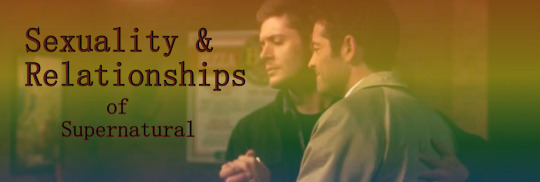
This project began as an indirect response to a few negative tweets in the days following the Valentine's Day Destiel wedding. During such time that “certain sources” chose to speak against the impromptu "wedding" and state that the direction of the show never included sexuality or romance. Since this argument has sparked a bit of discourse as to the validity of Dean Winchester and Castiel's relationship and sexualities, I began this edit as an exploration of observations throughout the entire 15 season run of the series. (That's not to say that Sam does not also have his own impactful romances throughout the show -he does have several notable ones- but in his case they are never debated upon or erased.)
There are three complete edits linked below. The differences are explained in their descriptions. (I also recommend downloading for best quality rather than simply watching in the browser, but it’s your choice)
BiDeanEdit: (Click here to download)
Runtime: 18:04:44
File Size: 10.0 GB (10,741,415,805 bytes)
Series long compilation edit (in sequence) of Dean Winchester and Castiel’s relationships and intended expressions of their sexualities (ie interest in both genders). This edit focuses on their relationship as it develops with one another, their other notable relationships (DeanxBenny, CasxMeg, DeanxLisa, etc), and the framework around their sexualities with small scenes of expression (ie Dean in ‘Playthings’ or ‘Everybody Hates Hitler’, or early seasons Dean & his transgressions with women, or Cas in ‘Caged Heat’)
BiDeanMLMEdit: (Click here to download)
Runtime: 14:40:57
File Size: 8.05 GB (8,649,798,685 bytes)
Series long compilation edit (in sequence) of Dean Winchester and Castiel’s relationships and intended expressions of their sexualities. This one is the same as the last but with only MLM content (Otherwise referred to as ‘only the gay parts’). We focus on this more repressed side of their sexuality and see these clues laid out altogether in one fluid edit (these examples are also available in the previous edit, however are just not aligned beside any heterosexual content). DeanxCrowley, DeanxBenny, DeanxLee, DeanxCas, etc.
DestielOnlyEdit: (Click here to download)
Runtime: 13:08:49
File Size: 7.17 GB (7,709,560,696 bytes)
Series long compilation edit (in sequence) of only Destiel related content. The same as the above edit, just simplified even more to only focus on Dean and Cas’ relationship over the years.
Keep reading below to find my full analysis of the complete edit regarding these guys sexualities, relationships, and the parallels we can draw.
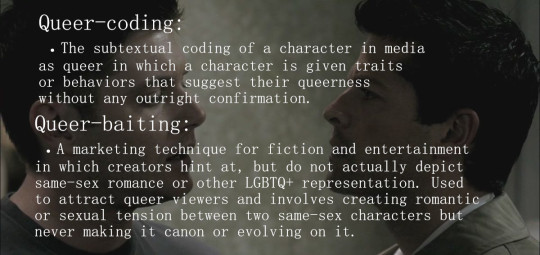
To understand why it is that so many queer fans of Supernatural and other similar shows read queerness in characters and their relationships, we should look at the hays code established in 1930. At this time this certain code was established to monitor what was allowed to be depicted outright on film. Within the margins of what was to be stifled, was homosexuality. As such, filmmakers had to plant “queer-coded” seeds into the writing and subtext so that queer audiences watching could interpret these characters and relationships in this manner without the words and actions stating so outright. (At this time homosexuality could be depicted on film as long as said gay character was either a villain, caricature, or met an untimely end- feeding into the blossoming of the kill-your-gays trope. But that’s another topic for a later time.)
As film changed over the years and times became more accepting of lgbt characters portrayals on screen outside of simple coding, this did not make the code obsolete. Queer-coding and queer-baiting are often used in media in present day as a way to pull in viewership. Networks are able to garner the best of both worlds, in a sense. They can draw in heterosexual audiences that may not want to watch queer media, whilst also drawing in queer audiences by coding some characters and relationships just enough to pull those viewers in. This works simply because there is such a lack of queer representation in most media that we’ll take what we can get.
This is where Supernatural comes in. There is a reason that Supernatural and thus “Destiel” is known by some as “The Great American Queerbait.” This twelve years long gay slow-burn between one overly masculine character and his awkward angel best friend did not begin with the intention of romance or baiting, as many of these things generally don’t. However, once fans realized the chemistry between these two particular actors and characters, it became something blatantly written into the show. Sometimes jokingly, other times as legitimate moments of emotional intimacy between two characters. So to say that the show’s direction never included sexuality or romance is, to put it bluntly, bullshit. Just because something is not written in clear and concise wording right in your face, does not mean that it is nonexistent and that the writers did not know what they were writing into the show. (Not even to mention the actual love confession in 15x18, but I digress).
We know very well that queer content has been written subtextually into media for the better part of seventy years. It is a language in media just as much as lighting is a language, just as much as certain camera angles, color design in costumes or set decor, and music design are languages. All of these, outside of the simple words said on screen, make up our media and these characters and our shows. Tv is a world of color, not black and white.
[[ further readings on the above topics: X X X X X ]]
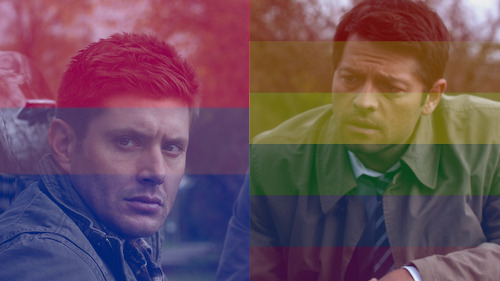
I decided upon this full edit encompassing both the female and male aspects of Dean Winchester and Castiel’s relationships & sexualities because oftentimes when we’re looking into potentially queer characters we tend to focus on the same sex attraction and neglect the opposite sex attraction. Both are very important to acknowledge and compare, if at the very least to view where they may overcompensate, where toxic masculinity may come into play, compulsory heterosexuality, trauma responses, etc. Sometimes what a character doesn’t do is just as important to interpret as what they do do.
For instance, Dean Winchester. If we are to operate under the assumption that he is bisexual, any repression we witness throughout the series as to his male attraction is likely to be a result of his difficult upbringing, similar to most queer identifying people with childhood trauma. His father is a marine, the picture of manliness in which Dean himself blatantly embodies in an effort to impress and make his father proud in any way he can. Dean is already unlikely to seek out activities in any aspect of life of which might make John look at him in a different light (ie, in an every day setting, even simply watching Finding Dory- this is not something S1 Dean would have admitted to liking, but we see Dean in later seasons standing up for himself and his appreciation for it).
Is it perhaps for this reason that we see Dean as an overly blatant and flirty ladies man in season 1 when John is still alive, while this side of him steadily declines as the series continues? It even becomes established in season 3- in light of Dean’s fears surrounding going to Hell, he enters an attitude for coping that Sam recognizes- hypermasculinity, promiscuity, deflection. Heightening the idea that this caricature of himself that he embodies is a mask that he wears in order to cope with something else. He is donning the image he assumes others think he should fit into. Sam calls him out on this through the years, and eventually this becomes something we see in him less and less as he feels more comfortable simply being himself.
If we take into account the time of which this first season is filmed, this is 2005, a time where gay jokes were still funny and an overcompensating character was a joke attached to it. We see Dean built up in these first couple of seasons through this lens of jokes about a hyper-masculine character being mistaken for gay, however instead of this building up the masculinity to encourage a raging heterosexual characterization, this overcompensation is exactly what inadvertently sows the seeds of queer-coding. To queer watchers this reads as a deeply repressed character with childhood trauma who overcompensates when faced with observations of gayness and uses hypermasculinity to counteract these accusations.
It is through circumstances such as “Bugs” in S1 or “Playthings” in S2 that we first see these ‘jokes.’ The brothers are mistaken as a gay couple. Dean being the more “masculine’ of the two characters has a blatant reaction to these situations (Overcompensating), and Sam’s lack of a reaction is what solidifies his own straightness all the more. Neither brother is homophobic (this becomes established as time goes on) so why would either have a problem with this mistake? Sam wouldn’t care because he’s clearly not gay- in fact, he usually just laughs it off. Dean would care because he wonders what about him looks gay? Do other people see it too? Do they know? What’s wrong with him?
We also see another blatant example of this type of freakout in season 8. “Everybody Hates Hitler.”
(Images: “Playthings” S2xE11)
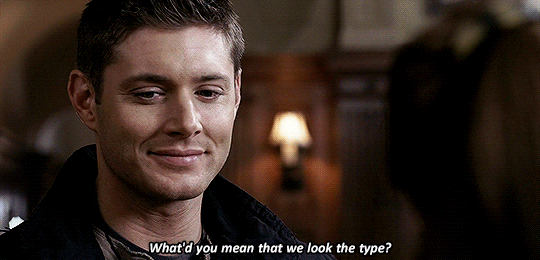
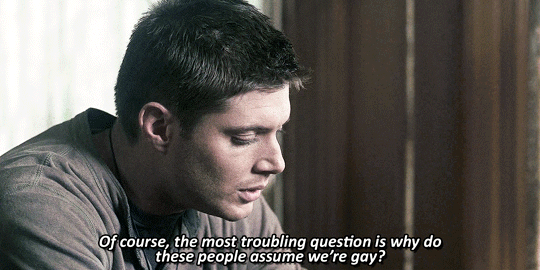
(Image below: S8 “Everybody Hates Hilter”)
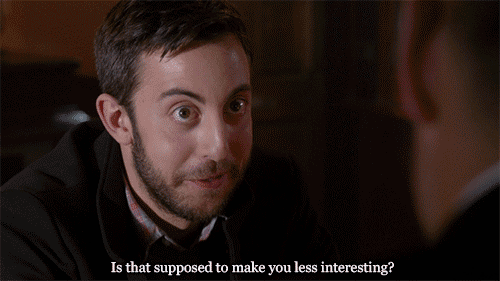
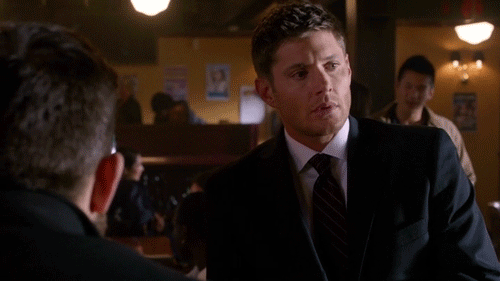
We frame these situations in early seasons around girl of the week scenarios and brief bar flirtations. Have to make it clear that our manly straight character looks as manly and straight as possible. Dean is also in his 20s, he’s more carefree/not as traumatized yet, and he is a sexual man so he does sleep around quite a bit. What is notable, however, is how much this drops off in later seasons. As time goes on Dean seeks out less and less the fleeting encounters of one night stands, in favor of genuine connections- even if he himself frequently doubts his own ability to ever have a settle-down type of relationship or life. Lisa is the only long-term female romantic relationship Dean ever has throughout the series run, and this tentatively begins in season 5 and ends in season 6.
Dean and Lisa’s relationship is founded more in a dream of something that Dean wants to be rather than who he actually is. Although he loves her, their bond is made through trauma and their relationship overall is reminiscent of a soldier who returned home from war with heavy PTSD and begins to burden the family that he will come to realize he doesn’t quite fit within anymore.
Outside of this, his closest relationships from thereon out are between Benny, and Castiel.
Let’s start with Benny. Throughout season 8 Benny is framed as an ex and his relationship with Dean directly parallels Sam and Amelia’s. Both brothers must confront their relationships with their ‘significant others’ and decide whether to cut them off or proceed. Both brothers found these people under circumstances in which they did not get along with them at first but were pushed together. Another person comes in the middle of their relationship (Amelia’s husband for Sam, or Cas/Sam for Benny). The brothers each resent the other’s significant other or the circumstances surrounding the relationship. Sam hates Benny because he is a vampire and Sam does not understand why Dean continually trusts him (which is a circumstance inherently queer-coded in itself for comparability to an unaccepting family). Dean does not care for Amelia simply for the fact that Sam chose her over looking for him in purgatory.
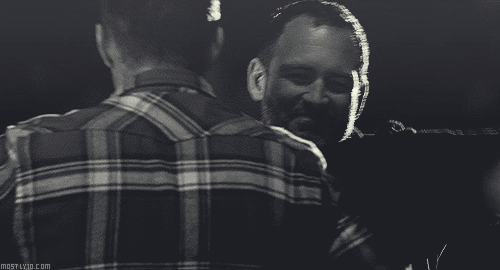
Other instances we see parallels between Sam’s romances and Dean’s:
“Sex and Violence” S4 siren: Nick(Siren)/Dean parallel to Sam/Dr Lady
Season 4: Ruby/Sam and Cas/Dean teamup parallels
S1 Dean pulling Sam from the fire away from Jess vs S12 Sam pulling Dean away from Cas who may die approaching Lucifer to fight
Season 8: Dean/Benny vs Sam/Amelia. Dean and Benny, since they’re essentially going through a breakup, are directly paralleled to Sam and Amelia and their breakup. See “Larp and the Real Girl” for Charlie and Dean’s conversation about Sam’s recent breakup and Charlie picking up on the fact that Dean might also be going through one.
1x05 vs 8x07: Sam seeing Jessica on the sidewalk as they drive down the street vs Dean seeing Cas on the side of the road as he drives down the street
S11: Perhaps this one can be interpreted loosely and not necessarily romantic (esp on Sam’s end), but “O’ Brother Where Art Thou” both brothers are drawn to forces they actively fight against being drawn to. SamxLucifer and DeanxAmara.
S11: “Beyond the Mat” not a relationship but with crushes/infatuations. Dean with Gunner Lawless and Sam with Rio.
S15: Cas telling Dean that “We Are” real. vs Eileen being unsure what’s real and Sam kissing her and saying “I know that was real.”
S15: “The Trap” Dean loses all hope following the death of their friends and primarily Cas. Sam loses hope after Eileen’s death. Directly paralleled in the episode. (We also see Sam lose Eileen in 15x18, where Dean also loses Cas)
Additional parallels between Dean/Cas with anyone else:
Season 9/10: Cain/Colette vs Dean/Cas. “She only asked for one thing. To stop.” vs Cas asking Dean to “Stop”. Both circumstances referring to the Mark of Cain.
S12 “Lily Sunder Has Some Regrets” Lily (human)/Isham (angel) vs Dean (human)/ Cas (angel)
Led Zeppelin: This music means something within John/Mary’s relationship, which Dean directly acknowledges in 12x01 with Mary. We find out Dean has gifted Cas a mixtape of his “Top 13 Zepp Traxx” in 12x19. (the implications of Dean having made a mixtape for Cas, being its own point in a different discussion)
When Lucifer contacts a person to try and get them to open up to him, he uses their dead lover as a ploy. SamxJess, NickxSarah, VincexJen, DeanxCas - 15x19 when Lucifer calls Dean using Cas’ voice.
The parallels of unreciprocated love/infatuation. DeanxCrowley and CasxHannah. Dean likes Crowley but clearly not the way that Crowley likes Dean. Cas likes Hannah like a friend or sister, but she keeps putting the moves on him for awhile and he appears deeply uncomfortable and has to shoot her down more than once.
Parallels between Dean’s own relationships:
Dean in “Let it Bleed” torturing demons to find the location of Lisa and Ben vs Dean in Purgatory torturing monsters to find the location of Cas “The angel”
“The Rapture” opens in Dean’s dream which Cas visits and says he’s in trouble and gives Dean an address to go to immediately. “The Song Remains The Same” opens in Dean’s dream which Anna visits and says she’s in trouble and gives Dean an address to go to immediately.
S6 Dean dodging calls from Lisa vs S12 Dean dodging Cas at the beginning of “Lily Sunder Has Some Regrets” (notable also how Sam treats both circumstances the same)
S11: “Into the Mystic” 11x11 Mildred tells Dean the key to living a long and happy life is to follow your heart. Later in the season “All in the Family” 11x21 When Casifer is still captured by Amara, she puts her hand to Cas’ heart and is able to connect with Dean to contact him. Hinting at the link between Cas and Dean’s “hearts.”
Not necessarily a parallel but an observation. 7x01 when Cas is loaded up on God juice, and Dean has given up but Sam hasn’t and wants to talk to ‘the guy’, Dean says, “He’s not a guy, he’s God.” But in 11x18 Dean refuses to give up on Cas and let him continue to be possessed. Sam keeps speaking about Cas like he’s just a vessel and Dean says, “It? It’s not an it, Sam. It’s Cas.” Mostly this shows the development of their relationship and Dean’s willingness to continue to fight for him.
Dean’s dream world with Pamela in S14, she says to Dean “How come you only want what you can’t have?” and in S15 during Cas’ confession scene he says to Dean, “The one thing I want, is something I know I can’t have.”
Before we delve into Dean and Castiel specifically, let’s explore a few more things regarding Dean.
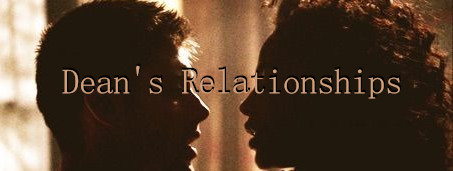
Let’s start with Cassie. This is Dean’s first romantic relationship we see on the show, and is arguably his first love. What is notable about her is her characterization and Dean in relation to her. We haven’t seen him in a relationship before, and thus this is the baseline to which we can draw how he is in this type of vulnerable state.
We see here that he is drawn to strong individuals. Cassie is a very strong willed character and can hold her own. She has a boldness about her. Dean appreciates that. We see similar in his next framed love interest: Jo Harvelle. Jo is another strong character, and though Dean sees her more as someone he needs to protect because she doesn’t have as much experience under her belt, he respects her intellect and strong will all the same. They connect through a love for hunting and mutual daddy issues. Personally, this is a relationship I view more as a little sister dynamic in a similar vein to Dean and Charlie, however this pairing is still worth noting because as it was written it was intended to potentially flourish into a romantic relationship. This did not pan out, though the seeds are still there.
Next up is Anna. Again daddy issues are a solid connection these two hold, and while this relationship is more of a one-night-stand than anything else, there are still important points to be taken from this encounter. The first is just how much Dean cares. We don’t see very many sex scenes with Dean throughout the series, but of the ones we do see, it is apparent that he is a gentle and tender man. He cares. About even a single night with a woman. (Cassie, Anna, Lydia ’The Slice Girls”) This is a contrast to Dean’s general persona of the masculine straight promiscuous lady’s man. He has all the bravado of a man who ‘loves em and leaves em’, but in reality that is not who he is. This is another example of the faces Dean wears in front of certain people (and what he thinks they expect of him), and the person he is once he lets that mask fall.
It may be important to note as well that Anna, (it is rumored) was originally meant to be more to Dean than this simple one night stand and connection. She was intended to become a romantic interest but, as it turned out, Dean and Cas had more chemistry so the arc that Anna was meant to follow was instead given to Castiel.
It is another year until the apocalypse comes along, Sam dies, and Dean falls back into Lisa’s lap. While Lisa is another strong-willed woman who rolls with the punches, her lifestyle deviates from Dean’s usual romantic interests simply because of her offering of a normal life outside of everything he’s usually known. A life with her is dipping his toe into a life he could have had if he didn’t hold the weight of the world on his shoulders and hunt the things that go bump in the night.
This is Dean’s last “official” relationship of the series. After putting Lisa and Ben in danger by being someone that he cares about, Dean accepts that he’s simply not a guy that can have a normal life or a normal family. He cares about people and they get hurt. This is a weight he holds on his shoulders for the remainder of the show. He loves someone, or more accurately, they love him, and they’ll get hurt. End of story. It doesn’t help that immediately following this, Castiel “dies” too.
Maybe it’s Lisa, maybe it’s Cas. Maybe it’s a combination of the two at this point in time, but Dean is never again the same when it comes to relationships after these events at the end of season 6. He becomes more cautious, tries to keep people an arm’s length away, and we even begin to see less and less promiscuity and flirting with miscellaneous women from this point on.
Let’s talk about Castiel.
Although Dean has had various queer-coded moments throughout the beginning of the series and up to Castiel’s entrance in season 4, his minimal relationships up to this point have all been with women. Simply exploring the evolution of this relationship from Dean’s side of the picture, Dean doesn’t start to truly warm up to Castiel until perhaps the end of season 4. He begins the season unsure of the angel, perhaps even a bit afraid of him, before the two garner a sort of mutual respect as Dean begins to see that there’s more to him than simply an agent of heaven.
They’re friends in season 5. The quirky, strange angel that doesn’t understand social cues, stands too close, stares too much, and says things like “we’re making it up as we go” and “tonight you’re my little bitch.” He’s a far cry from the ethereal entity that showed up in Bobby’s kitchen just a year ago and threatened to toss Dean back into Hell. What really turns the curve, however, is “The End.”
5 years in the future in the midst of an apocalyptic war, Cas is still around. He’s human and he’s stuck by Dean’s side through it all, even though this Dean is just a shadow of his former self. Then again, so is this Cas. But still, they stuck together. Dean isn’t used to that. He has very few people that have stuck by him for this many years. Could probably count them all on one hand at this point. Bobby and Sam at the top of the list. Everyone else either dies or leaves. And in this future, Bobby and Sam are dead, but Cas is still there.
Dean has abandonment issues. His mother died when he was four, his dad was in and out emotionally and physically his entire upbringing, Sam left for Stanford the first chance he got. He’s got strings of dead friends and lost relationships surely in tow for years at this point, and half the time Dean has become accustomed to pushing people away before they have a chance to push him away first. (Ie Cassie, Lisa, often even Sam too at times). Cas won’t make these issues any better during their run together, but up to this point Cas hasn’t let him down. The simple fact that in this one future universe Cas had stuck by him, I’m sure that makes a big difference to Dean and actually may be imperative for their relationship going forward and the trust that forms between them.
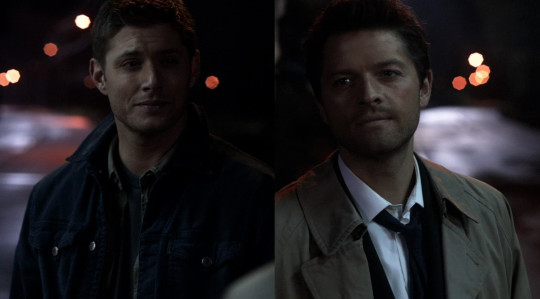
Something that becomes a large part of their relationship is Cas and Dean’s ability to have conversations with just their eyes. This is a shorthand that Dean is known to have with Sam on occasion, especially during times of combat. It takes a certain amount of intimacy and knowledge of the other person to be able to have a shorthand like this. The first instance we see this between them is quite possibly “It’s the Great Pumpkin, Sam Winchester,” when Dean convinces Cas that they can save the town. We see it again in the ‘beautiful room’ when Cas slams Dean up against the wall and Dean seems to understand what’s happening. Another instance, “The Song Remains the Same.” In a way, it’s a locking of eyes that just seems to say “trust me,” and they do.
Sam wonders if Anna may be right. If killing him and scattering the pieces will stop this whole Lucifer vessel business. Sam asks Cas, Cas looks to Dean, they share a look, and Cas shuts Sam down. In all likelihood that plan could have worked, but Cas wouldn’t do that Dean. He wouldn’t do it to Sam either but at this point he’ll do anything at all for Dean.
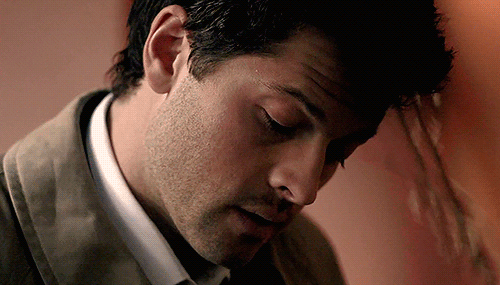
If we take a moment to consider Dean and Cas’ relationship here, it is unlike any of Dean’s previous ones. Dean never has this same kind of shorthand with any of his other relationships, save for possibly Benny to a certain extent. Cas is an odd guy, and Dean frequently describes him as such, but he finds it endearing (if “Free to be You and Me” is any indication this early in their relationship). The previous women in his life all had the same thing in common, that they’re strong willed, brave, and don’t put up with Dean’s shit when he’s being a shit. Cas does fit all this criteria, but he’s also someone that Dean has a hard time reading. Cas is so literal sometimes that Dean can’t tell what’s literal, what’s deadpan, and what’s just Cas’ personality as an angel. But at the end of the day, simply put, he likes him and he trusts him. Getting Dean Winchester’s full trust as quickly as Cas gets it is an anomaly all on its own.
Dean’s female relationships are fairly surface level. They’re easy and fairly uncomplicated. Boy likes girl, girl likes boy. Girl gets mad at boy, relationship ends. Easy. Expected. His relationship with Cas isn’t easy. But the big endgame relationships seldom are. There’s blood, loss of trust, rebuilding, and there’s a pull that at the end of the day always brings them back to one another no matter how incredibly messy things get.
And boy do things get messy. If we touch back into the end of season 6 where things end with Lisa and blow up with Cas, Dean is at an all time low in the relationship department.
Dean takes Cas’ betrayal hard. Breakups are one thing. Leaving Lisa was expected. It was bound to happen eventually. Dean always knew that somewhere inside. He mourns leaving them, but knows it’s for the best. But with Cas’ betrayal at working with Crowley, he’s devastated all over again.
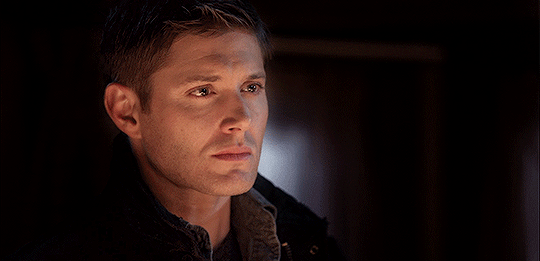
Dean never expects his relationships to last forever, but again there’s a choice few people in his life he lets take up space on the list of those who might stick around. Bobby, Sam, Cas. I don’t think Lisa was ever on this list, as much as Dean wishes he could tell himself she and Ben were. But they weren’t. That relationship was a ticking time bomb. And when they nearly die because of his life and the creatures surrounding him every day, that’s the end of it.
Fast forward, season 7 is a time of mourning. He’s lost Lisa and Ben, he gets Cas back for all of 30 minutes before losing him all over again and never being able to repair that relationship. But he keeps the trenchcoat. Fishes it out of the lake, bundles it up, and keeps it in the back of every single car that he and Sam drive that year.
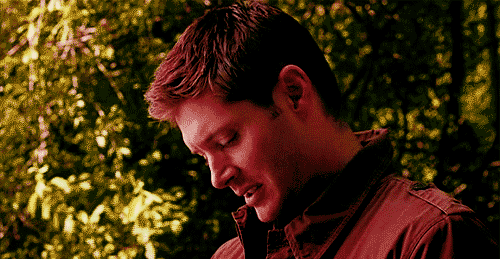
Dean doesn’t keep mementos. Not of Cassie, not of Jo, Not of Anna, or even Lisa and Ben. No pictures, no items, just memories. You know what he does keep? He keeps his dad’s leather jacket, Bobby’s flask, pictures of he and Sam and his mom. Is keeping the trenchcoat in the back of the car for a year similar to those familial keepsakes? Maybe. But it’s also more than that. It’s covered in blood and lake water, and I’m sure Dean would explain it away that Cas was family and that’s why he kept the coat. Probably even believes that too.
Then we have purgatory.
Dean prays to Cas every night. He could get out of that place just on his own, but he stays there for months in full combat just to look for the angel and get him out with him.
“First we find the angel”
“Cas, we’re gettin’ out of here. We’re going home.”
“Cas, buddy, I need you.”
“Let me bottom line it for you. I’m not leaving here without you. Understand?”
“Cas, we’re gonna shove your ass back through the eye of that needle if it kills all three of us.”
“It’s gonna work. Nobody gets left behind.”
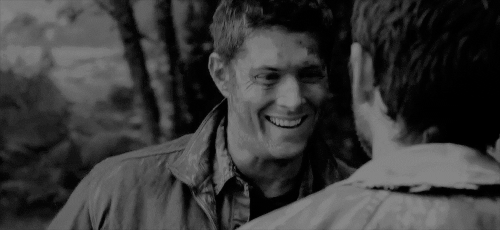
When we meet Benny, Dean’s only other primary male pairing of consequence, he is not trusted. This team-up is one of strategy and a mutual goal only- at least at first. Dean and Benny fight well side by side, but the trust only runs so far. That is, until during one particular fight with leviathans in which Cas nearly bites it, Benny saves the angel’s life. This is the main turning point for Dean’s entire trust in Benny from here on out.
“Benny has never let me down.” Dean says later to Sam. And he never did. He saved Cas, got Dean out of purgatory, and then later on he gets himself sent back to purgatory just so he can help Dean’s brother get out of there.
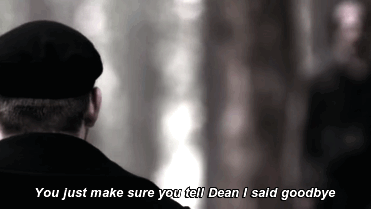
Dean and Benny’s relationship was “pure” in purgatory. They didn’t have to worry as much about the fact that Benny was a vampire and Dean was a hunter, they were just brothers in arms who earned one another’s trust, respect and love. There’s no way you let a man kill you and send you to purgatory to save his brother if you don’t love him.
Their relationship once they broke out of purgatory is where things began to sour, not because of anything either of them did to the other, but more the space they let grow. Regular Earth was different from purgatory and these men had to go back to their roles and say sayonara. “What happened in purgatory stayed in purgatory” and all that. Benny was a vampire and Dean was a hunter. That kind of thing mattered here despite the fact that they did care for one another.
Dean and Benny’s tumultuous relationship in relation to the people in Dean’s life could be reminiscent of a queer experience in itself. A lack of acceptance from Sam, Bobby, Martin- Dean’s family. Not because of who Benny was, but what he was. Pair this with the already established fact that Amelia and Sam were a direct parallel to Dean and Benny, Season 8 has been one of the most blatantly queer-coded seasons as of yet.
Which brings us to “Goodbye Stranger.” It is established early on this season that Dean feels that there’s something wrong with Cas, something off about him. The fact that they don’t know how he popped out of purgatory is just one part of it. It’s in the way he acts, how spacey he is, the fact that he doesn’t answer Dean’s prayers. “I always come when you call.” Cas once said. And he did. Until now.
This is another aspect of their relationship which is simply there and not spoken about much- similar to their staring and eye communication thing they do. Dean started their relationship unable to read all of Cas’ quirks very well and unsure of the guy. Now, he’s fluent in the language of Cas. He knows by tone of voice, by shiftiness, by his expressions- when something is up. Maybe he started paying more attention after the whole Rafael situation until he could read Cas like the back of his hand, or maybe he just started paying attention just to pay attention.
He’s known something is wrong for months while Cas has been under Naomi’s control. Just the same as years later, he knows something is up when Lucifer is taking a ride in Cas’ body. And he knows in 12x15 just by the way Cas speaks on the phone that something is off with him.
They come upon the angel tablet in the crypt, and Dean does fight back when Cas starts in on him, but he spends even more energy trying to get Cas to come back to him and fight whatever force has him under control. He never once stopped to think that this was just Cas. “This isn’t you! Fight this!” Dean would repeat over and over as Cas beats him nearly to death.
There was a moment he certainly thought that Cas would kill him, and it seemed like he was more bothered by the fact that it was Cas that would do it more so than the thought of dying.
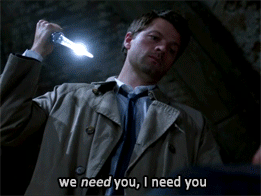
Cas breaks through the mind control, heals Dean. Then he leaves. So, again, Cas leaves. He keeps doing that to Dean. I stated before that Dean’s abandonment issues come into play in this relationship, but unlike at the beginning where Dean saw a future that Cas stays in, this Cas keeps coming and going. This makes it difficult for Dean to trust him fully, to rely on him. But the fact of the matter is that he does still trust him completely, and that’s what bothers Dean.
When Cas does come back again, collapsed and bloody in the middle of the street, Dean puts up a wall. He’s hurt and he’s tired. He doesn’t want to trust him as much as he does and he definitely doesn’t want him to keep coming and going without a thought. (What’s interesting to note here, though, is Dean’s change in character as this occurs through the years. Because while here he may simply give Cas the cold shoulder and not talk much about his hurt in this situation, we see later on in 12x19 after Dean has been fretting for days about where Cas has gone off to, and Cas finally does return, he voices his side of things. “With everything that’s going on, you can’t just go dark like that. We didn’t know what happened to you. We were worried, that’s not okay.”)
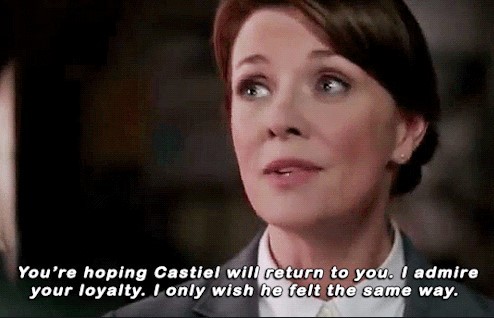
Naomi hits the nail on the head when she visits Dean after Castiel disappears and she notices Dean still hasn’t warded the boat against angels. It is moments like these that we realize just how much everyone else around these two also notice their chemistry and their deep devotion to one another, always seeming to fall back to one another.
“I think you have me confused with the other angel. You know, the one in the dirty trenchcoat who’s in love with you.” - Balthazar S6
“The stench of that impala is all over your overcoat, angel.” - Crowley S6
“Castiel? Oh, he’s not here. See, he has this weakness. He likes you.” -Uriel S4
(to Dean) “Go ask him, he was your boyfriend first.” - Meg S7
“I have tiptoed through all your little tulips. Your memories, your little feelings, yes. I know what you hate. I know who you love, what you fear.” - The Empty S13
“And then after a rousing speech, his true weakness is revealed. He’s in love... with humanity.” - Metatron S9
“I’m sorry, did you just say that you lost a Winchester? Because, one, that’s... interesting. And, two, how is it that you lost Dean? I thought the two of you were joined at the... you know, everything.” - Kipling S14
“And for what again? Oh, that’s right, to save Dean Winchester. That was your goal, right? I mean, you drape yourself in the flag of heaven, but ultimately, it was about saving one human, right? Well, guess what? He’s dead, too.” - Metatron S9
“Don’t lose it all over one man.” - Hannah S9
“The very touch of you corrupts. When Castiel first laid a hand on you in Hell he was lost!” - Hester S7
“Oh, sweet. Almost anything. Castiel? He’s dead. All the way dead. Because of you.” - Miriam S13
“And then you’d kill the angel, Castiel. Now that one, that I suspect would hurt something awful.” - Cain S10
“He should know this- Lucifer, his favorite, isn’t doing so well. Say nothing of the vessel, your friend Castiel.” - Amara S11
“I’m gonna cure you of your human weakness, the same way I cured my own. By cutting it out.” - Isham S12
Bonus: Dean to Sam about Garth’s baby Castiel- Dean: “This Cas keeps looking at me weird.” Sam: “So kinda like the real Cas.”
It is time and again that opposing forces recognize the relationship between Dean and Castiel, and it’s commented on and used against them frequently.
As we move forward to the angels falling and human Castiel, this season opens up with dean in the hospital with a very ill Sam. The first thing he does before contacting anyone else is pray to Castiel. There’s a moment in 9x03 where Castiel walks into a church and speaks with a woman there. He expresses his lack of faith and she says, “I guess that’s why we pray. You need something stronger than yourself.” Dean never prayed until he started praying to Cas. He prayed to Cas during the apocalypse, in purgatory, when Sam was sick during the trials, now in this hospital. Dean might not have faith in God, but he does in Cas.
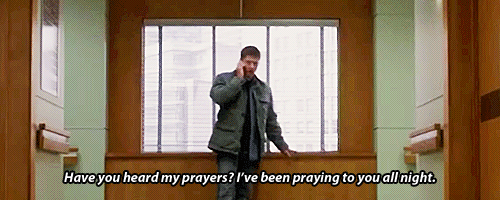
Castiel is human, and while Dean tears apart the grid trying to find him while angels are on Cas’ ass, he still watches him die, then has to kick him from the safety of the bunker the very same day. Up until this point, Cas has been a genuine part of their family regardless of their squabbles over the past months, but kicking him from the bunker damages that. Once the reasoning comes to light, however, Cas is forgiving immediately. He’d forgiven Dean even before that. That’s one thing about Cas that Dean never seems to get over either. Dean can get angry and take things out on him, kick him from the bunker, make stupid decisions and nearly kill himself, holler at him, blame him, but Cas comes back every time. He forgives him every time. It’s already overwhelming when Sam does this, but the ease at which Castiel consistently forgives Dean is a lot.
Dean gets the Mark of Cain. It’s a means to an end, he says. When he becomes a demon as a result, this is when his relationship with Crowley is deepened. This relationship is an interesting one because it’s essentially an unrequited example. Dean likes Crowley, and when he’s a demon he has a good time, but Crowley’s feelings appear to go much deeper- even if he tries not to show it.
It is very possible that Dean and Crowley’s relationship is a formation more as a result of a joke than anything else- where the writers are concerned. But whether that was the intention or not, this is a relationship that continues to affect Crowley’s actions towards Dean for the rest of the series. He doesn’t let Dean kill innocents as he’s a demon, he saves Castiel from certain death as his grace drains, he gives Sam the information to find Dean so he can be cured, and he aids in getting the mark removed from Dean even as Sam attempts to kill him in the process. In return, Dean gives Crowley the benefit of the doubt more often, and they share a sort of mutual respect. What differs here, however, from Dean’s relationships with Benny or Castiel, is Dean’s actions. It is clear that Dean doesn’t feel as deeply as Crowley does, so this is an interesting relationship to compare side by side with the others.
Not only this, but DeanxCrowley in these first few episodes can be seen as a parallel with CasxHannah. Two unreciprocated relationships which do not last long in this particular phase, but do result in a friendship within these pairings as time goes on.
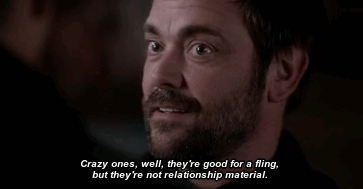
Still with the Mark of Cain, Dean and Cain have a few things in common. Cain had said that his wife, Colette, before she died had asked him to stop. Stop the killing. It’s several months after that that Dean is going off the rails and Cas, behind Dean as he’s walking away, asks Dean to stop. He nearly kills Cas then, almost fulfilling Cain’s words just weeks earlier: “And then you’ll kill the angel, Castiel. And that, I suspect, would hurt something awful.” This is a direct romantic parallel written into the show.
When the darkness is released, Amara and Dean are immediately drawn to one another through some sort of connection as a remnant of the mark. This relationship is another interesting one, because it ties in to true desire and consent. Dean is drawn to her, yes, and she is sold as a sort of potential love interest this season, but Dean himself doesn’t want anything to do with her. He’s hypnotized when he’s around her, but as soon as he’s away this energy dissipates.
So in light of this storyline let’s talk about consent and the sexualization of Dean Winchester for a second, shall we?
Dean is an often highly sexualized individual. He plays along more in his younger days, but the older he gets the more frustrated he becomes with the whole situation. I’m sure there are more but here are some tentative examples (This is also something that happens to Sam a decent amount as well.):
Wendy at the psych ward in “Sam, Interrupted” kisses Dean
Pamela touching Dean’s inner thigh in “Lazarus Rising”
Ezra in “Time After Time” kisses Dean without consent
Gets turned into a vampire because he’s “pretty”
Pamela in “Dark Side of the Moon” kisses Dean
Almost becomes a vessel for Sandy’s mate in “The Thing” because she “enjoys looking at his face”
Amara kisses Dean in “O’ Brother Where Art Thou”
Mildred gropes Dean’s leg in “Into the Mystic” and continually makes advances even tho he’s uncomfortable.
Random girl slaps Dean’s ass in “The Last Call”
Ellie in S8 wants to sleep with Dean and even kisses him randomly
Meg kisses Dean as he’s being held against his will in “Sympathy for the Devil”
Granted, there aren’t a plethora of examples, but it’s still a lot and it is interesting to see how often Dean has been sexualized for someone else’s pleasure. It is bound to work into his characterization as well, and his sense of self-worth. He’s often described as the pretty one of the brothers, and seeing as he is the more promiscuous of the two, it is assumed that he welcomes all of or most of the attention that comes his way.
It is for this reason in particular that the situation with Amara is bothersome to me. Not only is Dean taken advantage of physically, but his mind is essentially hypnotized whenever she is near, not giving him total control over his actions or desires. Amara is in part meant to be sold as a romantic interest, but throughout the season Dean continually expresses his discontent. He’s even ashamed to admit these feelings to Sam and Cas, even though he knows it isn’t his fault he still feels responsible. (Which, if we think about it, this is could be a queer allegory too. The lack of choice, feeling shame, etc.)
What is notable, however, is the day that they attempt to capture Lucifer and speak to Cas to get him to expel Lucifer from his body. Amara makes a surprise appearance and captures Lucifer/Cas herself. Dean yells to Cas. This catches Amara’s attention and appears to confuse her, and even Lucifer, seeing as when Dean is around her he’s meant to have eyes for just her because of their “bond”. His link to Castiel appears to be stronger, however.
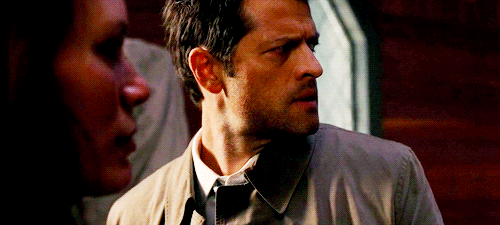
Amara uses this connection between Cas and Dean when she wishes to contact Dean, simply by placing her hand over Castiel’s heart. She says to Dean, “If you should cross paths, if (god) should reach out to you, he should know this - Lucifer, his favorite, isn’t doing so well. Say nothing of the vessel, your friend Castiel.”
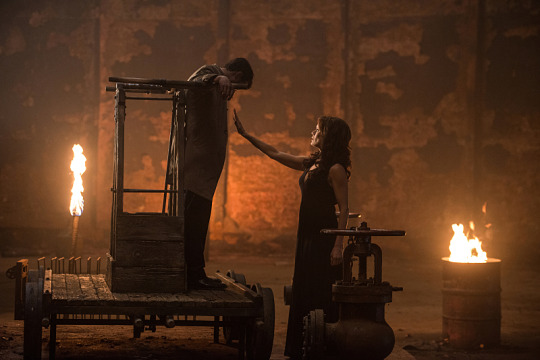
If we backtrack a moment, Dean finding out that Castiel is possessed in the first place is a very emotional time for Dean. He doesn’t want to accept that Cas would make such a decision, put himself in that kind of danger, and choose to leave once again. Sam, the arguably more rational thinker at this current time, tries to rationalize that Cas may not come back willingly since he chose to let Lucifer in. “Not possible.” Dean says. It’s simply not possible that Cas doesn’t want to come back to them. It’s not something he can accept.
The next several episodes are begun with Dean either losing sleep trying to figure out what to do about Cas, or simply moping about. Sam has to comfort him each time. This is notable behavior as well, because Dean isn’t often one to wear his heart on his sleeve this frequently. Certainly he has his moments, but much of the time when he’s distressed he simply buries it all down and puts up a front. He doesn’t do that here. In fact, once they do begin to put together a plan with Crowley, Sam thinks they should still utilize Lucifer in the fight against Amara but thinks it’s foolish to move him into a new vessel.
((I actually counted up the mopey Dean scenes- between finding out Cas is possessed, to getting Cas back.))
There are four convos with Sam (multiple episodes) where Sam has to comfort Dean and say something along the lines of “we’ll get him back.” (Just as an aside, I don’t think there has ever been a scene in the series where Dean comforted Sam about Cas, it’s always Sam having to comfort a freaking out Dean)
Then, of course, there’s the scene where Dean comforts a victim and she says “I watched the man I love die. There’s no normal after that.”
There’s the “It’s not an ‘it,’ Sam. It’s Cas.” scene.
There’s Dean trying to get through to Cas when they capture Lucifer.
There’s the Dean yelling “Cas?” to Casifer when Amara is in the room.
There’s two more scenes where Sam comforts Dean again.
There’s “The Chitters” episode with the gay hunter couple. (This isn’t a direct relation, but more of an honorable mention because it seems abstractly relevant)
Amara connecting to Dean through Cas’ heart.
Dean freaking out about making it to Cas in time and again talking to Sam about it.
Dean asking “what about Cas?” as they’re planning the attack with God against Amara.
Someone has said once that you can tell that Dean is in love with Cas because Sam isn’t. It’s in moments like this that this becomes readily apparent. Yes, Sam cares about Cas, of course. But it’s just different than the way that Dean cares about Cas. When Dean cares about certain people, this love weaves into the very fabric of his being and he just feels it so completely and overwhelmingly, he can’t simply not fight for it.
“Dean, it’s a strong vessel, it’s held Cas for years, and we know what he’s been through.” Sam says.
“It? It’s not an ‘it,’ Sam. It’s Cas.”
Dean appears almost shocked that these words would pass through Sam’s mouth. He’s confused that Sam wouldn’t fight for Cas just as much as Dean would. The type of love they each have for the angel is just different. Visually, action-wise, reaction-wise. This conversation in “Hell’s Angel” highlights that.
You know what else highlights it? The fact that when they do trap Lucifer, it’s only Dean who gets through to Cas and talks to him to get him to come back and expel Lucifer. It’s Cas only seeking Dean’s forgiveness in S7 when putting the souls back in Purgatory. It’s Dean in S6 being the only one to defend Cas in “The Man Who Would Be King.” It’s Dean later in that same episode being the one to get through to Cas in the circle of holy fire. It’s “I did it, all of it, for you.” It’s Dean carrying around that trenchcoat for a year and mourning when Sam doesn’t. It’s Bobby checking in on Dean mourning Cas, but doesn’t check in with Sam about it. It’s Sam pulling Dean out of the apocalypse world in season 12 as Dean screams for Cas and physically fights against Sam to get to Cas. It’s Sam seeing Cas dead on the ground minutes later, but still able to walk away while Dean is frozen in place, frozen in shock. It’s Dean being the only one to wrap up Cas’ dead body. It’s Sam always having to reassure Dean that Cas is probably fine, whenever he goes missing for a little while. It’s Dean hardly able to function in S13 with this encompassing grief over Cas’ death and yelling “It got him dead! Now you might be able to forget about that, but I can’t.” It’s S15 when Rowena tells Dean and Cas to fix their quarrel before it’s too late, and later Dean in purgatory not sure of it is too late as he’s praying for Cas to be okay and crying against a tree.
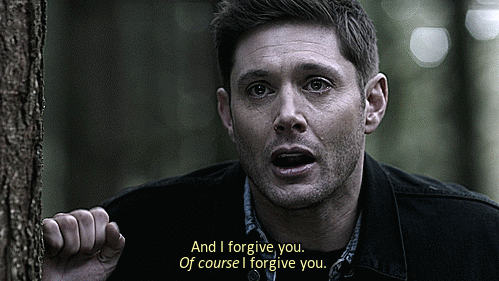
Sam’s reactions are important to take into account. Sam cares, yes, but Cas isn’t as wholly encompassing in his life as he is in Dean’s. If anything else is to prove that, it’s the way that Dean grieves (I mean, if you were to put Sam in Dean’s place in 15x09 in Purgatory and their fight, there’s no way that Sam would react this extremely).
There are three different points to highlight Dean’s grief. The first is season 7 with the trenchcoat, which we’ve already talked about. The second is when Cas is possessed by Lucifer, which we have covered as well. The most damning, however, is Dean’s season 13 grief arc following Cas’ death. Dean also loses his mother during this time and a few other friends, but considering how he reacts when Cas comes back, a great amount of this grief has to do with Cas. Dean completely loses hope and faith in anything at all during this time. He hates Jack for giving Cas false hope and getting him killed. He doesn’t believe in their mission anymore. He doesn’t believe anything matters at all. “Right now, I don’t believe in a damn thing.” Dean admits to Sam. When Cas comes back from the dead, however, he pulls a complete 180. He has hope again. He has faith. And all of it begins with Cas.
Lastly, Dean never hooks up with anyone again after Castiel’s final resurrection. We can go through an outline of the steady decline of Dean’s hookups and relations outside of Cas as the decade goes, but during this three year window specifically, Dean’s only pairing is Cas. Sure, he might flirt with someone every now and again, but this never goes anywhere. (Arguably the person he flirts with the most in any episode in these final three seasons is Daphne, but idk if that even counts much considering she is a cartoon.) And as Pamela says once in Rocky’s bar: “Besides, you don’t want me. You just like to flirt. I’m psychic so I kinda know.” And that was just in Dean’s head anyways so it’s probably even more true than had Pamela actually said it herself.
When Jack comes in the picture in season 13, and Castiel comes back from the dead, this makeshift little family is formed. All three men act as father figures to this half-angel kid at different capacities, and amongst this dynamic another is formed a bit further between Dean and Cas. They’ve already been acting a bit as an old married couple in recent years (Lily Sunder Has Some Regrets, anyone?) but this co-parenting scenario they’ve found themselves in has solidified this dynamic all the more as they collaborate on the issues that arise with Jack. In “Lebanon” when John Winchester comes back for a brief period, John even says to Dean that he’d hoped he would get a family someday and get out of hunting and such. Dean replies, “I have a family.” Sam, Cas, and Jack are his family. Cas has been family for a long time, but here and now Dean just isn’t looking for anything else or anything normal. He’s happy with himself and the people he’s surrounded by. He’s not looking for anything else or anyone else.
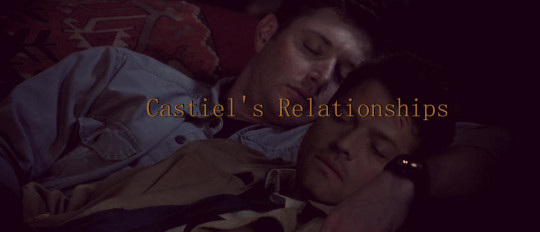
For a change of perspective, let’s check out Castiel’s relationships over the years.
Unlike Dean, Castiel’s queerness and interest in Dean has been officially canonized. We can speculate all we want on the legitimacy of Dean’s love for Cas, but we can speak in certainties about Castiel. Castiel is in love with Dean Winchester. Speculation can come in when we consider, just how long has this love existed for him? Let’s start from the beginning.
Right off the bat when we meet Castiel, he’s a semi-emotionless soldier of heaven who works under strict orders and doesn’t have much free-will. Dean begins to change this. We can see even in their first couple encounters that Castiel is interested in Dean- in what he has to say, intrigue in the fact that Dean talks back to the angels (despite that these angels are unkillable beings and could smite him on the spot), the fact that he’s snarky and brave and questions everything. Where Uriel finds Dean annoying and blasphemous, Castiel finds the back-talk fascinating. Dean’s words impact Cas, and it’s not long before he starts to have doubts about Heaven. Following these orders blindly and unquestioningly starts to seem foolish when Dean puts things in a different perspective.
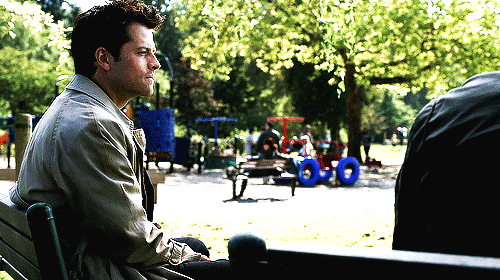
Even after Cas undergoes what some have funnily dubbed “conversion therapy” in “The Rapture” (when Cas had finally decided on going against Heaven and to help Dean stop the apocalypse) it’s still not enough to stop him completely. A bit more time with Dean and he’s convinced yet again to help this one human man stop the apocalypse with his brother. He even dies for him and this new mission of his.
Castiel throughout this first season is interesting because we see firsthand his struggle to understand beginning to feel emotions and accept thinking for himself. “For the first time, I feel...” He says to Anna. He wants her to tell him what to do. He wants orders because that’s all he knows, and he doesn’t understand why suddenly he cares. It hurts him to send Dean in to torture Alastair. It hurts him even later when in the beautiful room Dean dismisses him with a “What do you care, you’re already dead. We’re done.”
It’s possible that in these first several months, or even these first couple seasons, that Castiel follows Dean around and does as he asks because he’s allotted Dean as the new being he serves. Because serving is what he knows. But it’s also through this that he begins caring more and more. He learns more how to express certain emotions, he learns more about humanity, he learns more about what is important in life and what is worth fighting for. As Cas will admit himself 12 years later, “Ever since we met, ever since I pulled you out of Hell... Knowing you has changed me. Because you cared, I cared. I cared about you. I cared about Sam. I cared about Jack... I cared about the whole world because of you.”
We start to see sprinkles of this especially throughout season 5 as Cas begins to come to terms with caring and adopting Dean’s mindset to care. Consider Sam for a moment. He and Cas don’t necessarily get along a lot and mostly just tolerate one another in these early days. However, as we see in “Abandon All Hope” when Castiel is captured by Lucifer, Cas gets visually upset at the concept of Lucifer taking Sam as his vessel. “You are not taking Sam Winchester. I won’t let you.”
Sam and Cas don’t have much of a relationship at this point, but Cas cares because Dean does. In “The Song Remains the Same” not long later, he even refers to Sam as his friend.
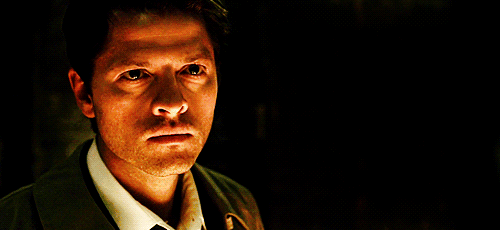
By the time S6 rolls around Castiel is in the midst of a civil war in heaven entirely because he has adopted the Winchester’s all encompassing mindset on the importance of free-will. Castiel is making his own choices, and he does everything he can to protect the Winchesters from harm as he does so. He decides not to seek out Dean’s help while he’s raking leaves because Dean had already sacrificed too much in Castiel’s eyes. He raises Sam from perdition because he feels it the right thing to do. He re-sinks the Titanic to keep the boys from being killed by Fate.
Personally, I think Castiel has been slowly falling in love with Dean this entire time, he’s just not aware what this feeling is. But this becomes even more plausible to me when we get Castiel’s perspective in “The Man Who Would Be King.” Cas cares what Bobby and Sam think of him, sure, but all he focuses on is Dean. Dean’s happiness and ensuring he not sacrifice more. Dean’s loyalty even as Cas seems to be guilty. Dean’s words when they capture Cas in holy fire.
The problem is, their relationship this season is also rocky. Cas seems to think that he’s merely a tool at the Winchester’s disposal and not much else. But he doesn’t mind because he cares about them so much, so what do his feelings matter? He sees himself as their protector. Their guardian angel. A role he’s fine with filling regardless of how they feel in return.
But when things get bad, Dean says to him “Next to Sam, you and Bobby are the closest things I have to family. You are like a brother to me. So if I’m asking you not to do something... You’ve gotta trust me, man.” and Cas seems genuinely surprised at this admission. Emotional, even.
As time goes on, Castiel’s actions nearly primarily revolve around Dean
After Cas realizes his error and is sending the purgatory souls back to their place, he tells Dean repeatedly that he’ll find some way to redeem himself to him. That’s the most important thing to him then.
When Cas smites the demons outside of the mental hospital in 7x17, all of his flashes of memories coming back were memories of Dean.
Partially to aid Sam and partially to redeem himself to Dean, Cas takes on Sam’s Hell brain in the asylum and goes crazy.
Cas runs in purgatory to keep the leviathans away from Dean.
Cas breaks out of Naomi’s mind control/brainwashing because of his feelings for Dean.
Let’s talk about that final bullet point for a moment. The Naomi chapter is damning in “Goodbye Stranger.” It isn’t copies of both Sam and Dean that Naomi trains Castiel to kill hundreds upon hundreds of times. No, it’s ONLY clones of Dean.
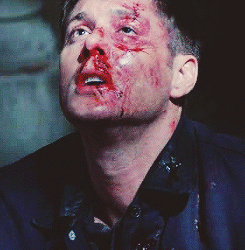
“What broke the connection?” Dean will ask after Castiel heals him in the crypt and takes control back over his mind. “I don’t know.” Cas will say. It wasn’t the angel tablet. That may have unwound the last of Naomi’s control over him, yes, but he’d dropped that angel blade before that. It was Dean that broke that connection. Even if this remains unsaid, it doesn’t make it any less true. Maybe Castiel starts to have an understanding of what his feelings are and what they mean here, but he won’t be truly sure until he soon becomes human.
Before we get there, though, we’ll take a brief pause to explore Cas’ heterosexual explorations and connections.
First is Meg. Cas’ relationship with Meg is born of sexual exploration more than anything else at its conception. He’d just been watching porn in his downtime and when Meg kisses him, he goes with it enthusiastically. Later, he seems to have a certain infatuation with her in his “crazy” state, and seems to trust her perhaps simply because she had been watching over him in the institution.
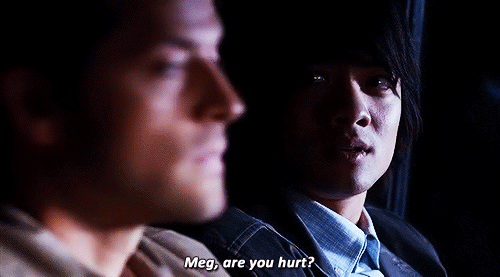
This is interesting because in his “crazy” state, Cas is a lot more raw and unfiltered and optimistic than he ever has been before. He compliments her, is concerned with her safety, and trusts her. On the contrary, with Dean, Cas is a lot more hesitant and even fearful when talking about certain subjects with him because of his past failings. He tries to keep the peace without directly getting involved because his direct involvement in the past had failed them all so spectacularly.
He and Meg continue to have a sort of connection whenever they cross paths until her demise the next season, and he still holds a respect for her years later, continuing to use her nickname for him “Clarence” as an alias at various times.
When Castiel becomes human in S9, he’s a bit lost and overwhelmed. April takes him in for the night. Although this is a short-lived romance considering she tortures and kills him the next day, for a brief enough time Cas starts to become acquainted with human romance and sexual desire. He loses his virginity to her. It is estimated by some that this is merely sexual experimentation on the part of a very confused newly human Cas, and others have used this to say that Cas is not gay but pan or bi. The conclusion in any regard, in my opinion, is purely up to the viewer.
If I’m to offer my opinion, however, seeing as he has shown interest in both sexes, though remains unlabeled, I consider him simply an unlabeled queer person. Sexual identity and orientation has never seemed to matter much to Castiel, so I don’t see why it should matter to me. He loves who he loves, simple as that.
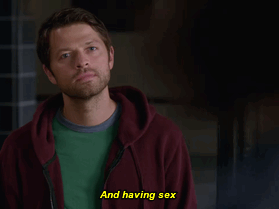
When we get to Hannah, she provides an interesting foil to Castiel for a time, and an emphasizing expression on just how much he’s changed since his introduction to Earth and the Winchesters. Where Castiel has been open to a plethora of new emotions and experiences through the years which have made him a bit more human than angel at times, Hannah is still new to humanity and the range and movement of emotions that come with it. Just how little she seems to understand proves how much Castiel has grown and does understand by comparison.
As such, he seems to pick up on the fact that Hannah has an attachment to him that appears to be forming into a romantic or sexual interest. He gently turns her down multiple times, not expressing interest in her behavior although he does respect her greatly as a person. Though this relationship isn’t considered romantic from Castiel’s perspective, its unrequited nature again is a good parallel to Dean and Crowley’s relationship at this same time. Angel x Angel and Demon x Demon. Both one sided.
Now, let’s get back to Dean.
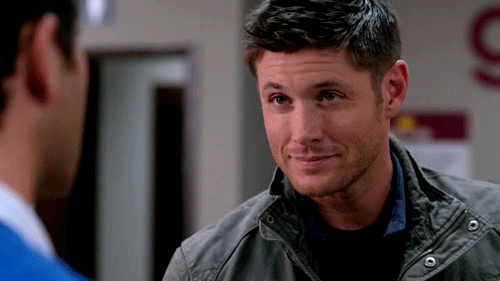
Up to the point that Castiel turns human, for however brief a time, he finally gets a look behind the curtain of human emotion. Now, we all know that Cas is in love with Dean already here- and probably has been for some time. Years, even- but it’s my personal belief that during this time turning human is when he actually realizes it and understands where these emotions come from.
Maybe it’s the heartbreak of Dean kicking him from the bunker, maybe it’s seeing Dean again when he shows up in line at the Gas n Sip, or maybe it’s somewhere in between when he sees two people on the street looking at each other and realizes “oh, that’s love. I know what that is. I felt that, too.” And every moment from then on he realizes what that feeling was in his chest when he looked at Dean for a little too long, or why it hurt so much to see the pain in Dean’s eyes at something Cas had done, or why hearing Dean’s prayers to him just felt different than they did with Sam’s. Why everything that he’d done since he rebelled from heaven was in the name of doing the right thing, muddled alongside doing the right thing for Dean. Caring because of Dean. Caring for Dean.
It’s during this time when he realizes what these feelings are, that he also must come to terms with the fact that they’re unreciprocated (or as he believes, anyway). This is for two reasons. The first, he still believes at this time that Dean kicked him from the bunker just because. And the second, if there’s anything that Cas took to heart from Dean’s example as strongly as the concept of free-will, it’s self-loathing. He doesn’t see himself worthy of love. Dean doesn’t see himself worthy of love either. They’re both messy piles of self-loathing that breeds into a blindness to the depth of care they hold for one another.
Now that we’re on the topic of self-loathing, this leads into Castiel and his decision to become Lucifer’s vessel in season 11. Much like Dean, Cas has a consistent issue with seeing his own personal self-worth, so when the opportunity comes along to “be of service to the fight” and become Lucifer’s vessel, he takes it on easily. He considers himself expendable, and he won’t see just how much Dean struggles with this fact while he’s possessed. In fact, Cas never knows just how much Dean struggles with his absence at all, which is just one of the many divides between the two of them that could easily be resolved with communication, if either were ever good at that.
Once Lucifer is shoved from Cas’ body, however, Dean makes a point to let Cas know just how important he is in his life. He’s said Cas was family before, but that was before the falling out at the end of season 6. Dean makes it clear that he and Sam both consider Cas family, once again, during a ride in Baby. “You’re our brother, Cas. I want you to know that.”
Now, here, simultaneous heartbreak and love occur. Because while Cas is likely very much in love with Dean here, and very much aware of it, to hear that Dean simply thinks of him as a brother must ache a bit. However, we’re also talking about Dean Winchester, and for him to call someone a brother is an immense depth of love, probably the most the man is even capable of. Dean never says the words “I love you” to anyone, so this is about the closest anyone could get. Cas knows this, he’s well-versed in the ways of Dean Winchester by now. So, while it aches, his heart is also full.
Comparable to:
“We need you, Cas. I need you.” 8x17
“We’re gonna shove your ass back through the eye of that needle if it kills all three of us.” 8x05
“Don’t make me lose you, too.” 7x23
“Don’t do anything stupid”
The entire purgatory confession/apology prayer in 15x09
Cas returns this love just hours later, offering to go with Dean to die taking out Amara.
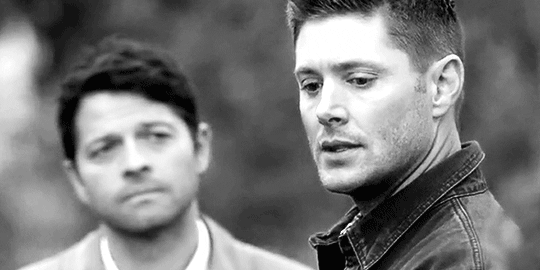
If we jump forward to the divorce arc of season 14-15, we can hit upon the next great heartbreak of Castiel’s sad little love life. While the Winchester brothers, Castiel, and Jack have all become a family unit, Castiel never wants to lose that. But two things happen. First, Cas’ deal with The Empty is made, and somewhere along the line, silently, he becomes aware that allowing himself to be happy, and that happiness, somehow involves Dean. The second thing that happens is Jack kills Mary Winchester, and Dean says Castiel is dead to him.
So, The Empty won’t take him, but his family is broken apart. Castiel never gives up on a single family member, though. That’s the thing about Cas. The same way he consistently forgives Dean for all his behaviors over the years, he never loses faith in anyone in this family. And when they come to reunite, he’s happy simply in appreciating any and all time they have together, however brief.
Then, in true Castiel fashion, he sacrifices himself for Dean Winchester in 15x18.
Their relationship has always left things unsaid, but I don’t think there’s ever been a question on whether Dean loves Cas or Cas loves Dean even if they don’t talk about it. You can’t look at Cas and Dean’s faces seeing each other again for the first time in weeks at the end of “The Last Call” and say that there wasn’t love and heartbreak there. On some level I think that Cas knew that Dean loved him back, but Dean was so buried in trauma at that point that it might take him years more to realize what he actually felt and what he needed. But Cas is such a selfless lover that he was absolutely 100% fine with just being around Dean for the rest of his life, even if he never got a chance to tell him how much he genuinely cared for him, and never got that reciprocation back. Castiel’s love for Dean is so pure and selfless it’s overwhelming to even consider, but for someone like Dean it would be a hundred times harder to accept or even fathom someone caring about him as much as Cas does.
So Castiel never pushes Dean further, never suggests, barely even touches him. The only liberties Cas takes are small touches to heal him (even though he doesn’t need to touch a person to heal them), a few small hugs through the years, just sharing comfortable space inside the impala, small moments watching Dean’s favorite movies with him, or sharing a moment over beers in the kitchen. And Cas’ happiness was in telling Dean how much he loved him likely because then maybe Dean would actually see how much he was worth. Cas wanted Dean to know how much he loved him and how he viewed him, because Dean deserved to love himself and was worthy of it.
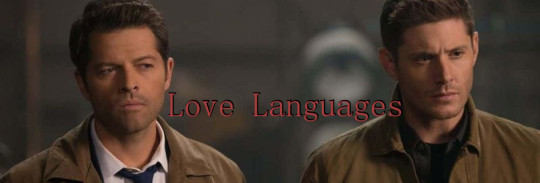
The five types of love languages are as follows:
Words of affirmation
Physical touch
Gift giving
Acts of Service
Quality Time
One of the reasons Dean and Cas miss the mark with one another so often could simply come down to love languages. A lot of the time, what a person needs in love language is often what they also give. I don’t think this is the case where these two are concerned, though. They’re both so sacrificial that it’s difficult for them to accept this in return, even though this is what they each offer to the other and anyone else around them.
Both Cas and Dean’s giving love language is “acts of service” which translates into sacrificial actions much of the time, though it can also be more domestic than that as well. It’s Dean grabbing an extra beer for Cas or making food, or it’s Cas healing Dean without any prompting, Cas loading up on pie and beer at the Gas n Sip when Dean’s mad at him.
What they each need, however, is different. Dean needs “quality time.” He needs his people close, he needs them to answer calls, and he needs to know where they are. This clearly ties in to his abandonment issues, and it hurts his relationship with Cas significantly when the angel just keeps leaving, or disappears without answering his phone for days at a time. And when he dies, obviously. He always comes back, though. And half the time when he’s gone it’s because he’s trying to get a win for Dean against whatever issue the team is facing at the time.
What Cas needs, best I can tell, is “words of affirmation.” Cas has a consistent problem with thinking that he’s worth less than he is, and is less important to the people around him than he is. Dean obviously has this issue, too, but with Cas it’s somehow infinitely worse, if that’s even possible. Frequently, what he needs to get him going in low points is a few words from Dean or encouragement in general. To name a few:
“Maybe to fix it.” 7x17
“I’d rather have you, cursed or not.” 7x23, Cas then goes with Dean to find and kill Dick Roman
“I’m not leaving here without you.” S8 in purgatory when Cas wanted Dean to leave him behind but Dean was having none of it.
“You’re our brother, Cas.” 11x23, after Cas was possessed by Lucifer and thought he was expendable.
Over time, Dean does get a bit more vocal with Cas about issues he’s having or just with encouraging words as well. Cas, too, sticks around a lot more. They’re not perfect but they do begin to grow and work with one another in these later years to give one another what they need most to see how much the other is loved.
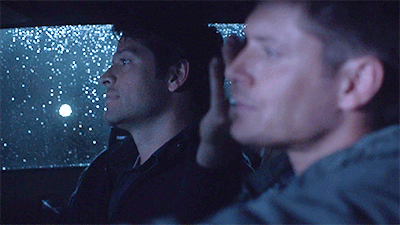
In conclusion, there is a significant amount of romance and sexuality written into this show, and simply interpreted as well. And that’s the thing, when a queer person says that they interpreted a certain piece of media as queer, it’s not up to someone else to say that they can’t, or shouldn’t, or that they’re interpreting something wrong. That’s the thing about media, it can have so many different interpretations and meanings to so many different people.
It’s my personal interpretation to see the queerness embedded in the text here. Maybe it’s not there for another person, and that’s cool too, just don’t tell me how I should see it. The fact is that it was written into the show to be interpreted, and interpret is what we did.
I’d love to hear any feedback that others may have regarding this. Any other theories, different interpretations, things I may have missed. I hope you enjoy the edits, and the endings I put together for them. We all need a little bit of happiness after that ending, so I hope it leaves you with a lighter heart. :)
Much love,
Taylor
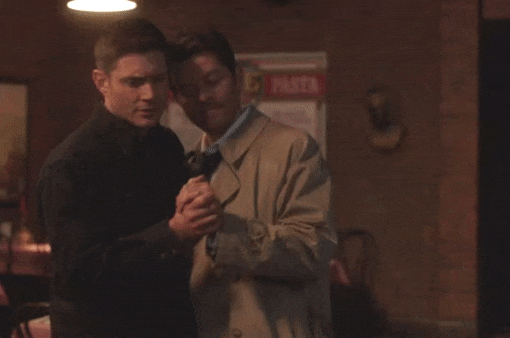
#Destiel#deancas#deanwinchester#Castiel#gay angel#bisexuality#gay#lgbtq#supernatural#spn#Destiel mastercut#bi dean#bidean#bidean mastercut#bisexual dean Winchester#gay Castiel#pansexual Castiel#sexuality in supernatural#romance in supernatural#I swear I’m not crazy with these lengthy edits#working on this project is helping me keep busy while tending to my sobriety#took a darn long time but it was therapeutic to edit#it’s true this project is partially born of spite tho#I thought of it after samanthas tweets the day after the wedding and started downloading the episodes that same day#benny lafitte#lisa braeden#spn tiktok#summerania#can you tell that season 11 is my favorite season#destiel wedding
86 notes
·
View notes
Text
Here and Queer: The Witcher
Hi, I’m Aaliyah, and this is Here and Queer, Canon Queerness in The Witcher books.
I already started this series by talking about Ciri here. Her relationship required a fair amount of analysis because it began nonconsensually but continued for months after the fact and spanned three books so there was quite a bit to cover.
However, while she is the main character there are other characters who are also queer in the books including Triss Merigold, Philippa Eilhart and Geralt himself!
Let’s jump right in by talking about our first queer character: Triss.
She is explicitly confirmed as Queer in Blood of Elves during this internal monologue:
As far as her erotic life was concerned, Triss Merigold had the right to consider herself a typical enchantress. It had began with the sour taste of forbidden fruit, made all the more exciting by the strict rules of the academy and the prohibitions of the mistress under whom she practised. Then came her independence, freedom and a crazy promiscuity which ended, as it usually does, in bitterness, disillusionment and resignation.
Then followed a long period of loneliness and the discovery that if she wanted to release her tension and stress then someone who wanted to consider himself her lord and master – as soon as he had turned on his back and wiped the sweat from his brow – was entirely superfluous.
There were far less troublesome ways of calming her nerves – ones with the additional advantages of not staining her towels with blood, not passing wind under the quilt and not demanding breakfast. That was followed by a short-lived and entertaining fascination with the same sex, which ended in the conclusion that soiling towels, passing wind and greediness were by no means exclusively male attributes.
Finally, like all but a few magicians, Triss moved to affairs with other wizards, which proved sporadic and frustrating in their cold, technical and almost ritual course.
Sounds here like Triss enjoyed her relationships with women but the forced heteronormativity of society caught up with her. This actually hits quite a bit for me as Triss states that her relationships with men seemed lacking after she had relationships with women.
Of course, there is also this scene in The Tower of Swallows:
The brilliant beam of light, broken by the diamond, flashed on the surface of the mirror. Yennefer stretched out both hands and began chanting a spell. The blindingly bright light reflected and concentrated into a fog. Soon, a picture began to emerge. The image of a room whose walls were covered with colorful tapestries.
A movement at the window. And a troubled voice. “Who? Who's there?”
“I'm here, Triss.”
“Yennefer! That you? Gods! How did… Where are you?”
“It does not matter where I am. Do not block the image, because the picture varies. And take away that candle, it’s blinding.”
“Right. Of course.”
Although it was late at night, Triss Merigold was wearing neither lingerie nor her work clothes. She wore a dress for going out. As usual, high-collared and closed.
“Can we talk freely?”
“Of course.”
“You're alone?”
“Yes.”
“You're lying.”
“Yennefer…”
“You are deceiving me, brat. I know your face; I know you too well. It’s the same look you had when you started sleeping with Geralt behind my back. Back then, you put on the same sheepish, innocent mask that I see on your face now. And it means the same thing now that it meant back then!”
Triss was red. Philippa Eilhart appeared in the window next to her, dressed in a dark blue men’s jerkin. “Bravo,” she said. “As usual, quick. As usual, perceptive. As usual, hard to grasp and understand. I am glad to see you in health, Yennefer. I am happy that your crazy teleportation from Montecalvo did not end in tragedy.”
Gonna be very honest here, as someone who has had to hide their girlfriend when a friend or parents walks into your room, that is exactly how I read this scene. Yennefer saying Triss has the look on her face of someone who just got laid? Philippa coming out of hiding and calling Yennefer perceptive? The fact that when Yennefer first called Triss didn’t let her see what was going on and then appeared fully dressed after blocking the image? I don’t know about anyone else, but I read this as Yennefer catching Triss and Philippa together romantically.
However, even if you don’t buy this scene as explicitly showing a relationship between the two of them, Triss is still queer as well as Philippa.
From Time of Contempt:
“So it is!’ said Marti Södergren, leaning over and wrinkling her nose, after which she picked up a goblet and looked at the traces of crimson lipstick on it. ‘Ah, Philippa Eilhart. I should have known. Who else would have dared to do something so brazen? That revolting snake. Did you know she spies for Vizimir of Redania?’
‘And is a nymphomaniac?’ risked the Witcher. Marti and Keira snorted in unison.
‘Is that what you were counting on, fawning over her and flirting with her?’ asked the seductress. ‘If so, you ought to know someone’s played a mean trick on you. Philippa lost her taste for men some time ago.”
Another Philippa scene from The Tower of Swallows:
Philippa Eilhart was in a short nightgown with thin straps, and her face and neck had traces of lipstick. Assire, with a great effort of will, contained an expression of displeasure. Never, ever, will I understand this. And I do not want to understand.
“Can we speak freely?”
Philippa’s hand made a sweeping gesture. And she surrounded herself with a magic sphere of discretion.”
Answering a telecomm with lipstick all over ur neck is such a queer power move and honestly Philippa might be manipulative but damn the energy she exudes.
As well as Philippa and Triss, there is the infamous bath scene with Geralt and Borch from Sword of Destiny:
“Let’s make merry!’ Three Jackdaws leant across the table and slapped Téa on the backside. ‘Let’s make merry, Witcher. Hey, landlord! Over here!’
The innkeeper scuttled briskly over, wiping his hands on his apron.
‘Could you lay your hands on a tub? The kind you launder clothes in, sturdy and large?’
‘How large, sir?’
‘For four people.’
‘For… four…’ the innkeeper opened his mouth.
‘For four,’ Three Jackdaws confirmed, drawing a full purse from his pocket.
‘I could.’ The innkeeper licked his lips.
‘Splendid,’ Borch laughed. ‘Have it carried upstairs to my room and filled with hot water. With all speed, comrade. And have beer brought there too. Three pitchers.’
The Zerrikanians giggled and winked at the same time.
‘Which one do you prefer?’ Three Jackdaws asked. ‘Eh? Geralt?’
The Witcher scratched the back of his head.
‘I know it’s difficult to choose,’ said Three Jackdaws, understandingly. ‘I occasionally have difficulty myself. Never mind, we’ll give it some thought in the tub. Hey, girls. Help me up the stairs!”
Now, there’s a lot of people who read this scene and say: hey now, Geralt didn’t actually sleep with Borch. They just slept with two women. Together. In a bath. Now, I don’t know about any of you, but when four people are naked in a bath together all having sex it’s not a situation where you can say no-homo bro and call it a day.
Also, you know, there is this line later on in Sword of Destiny:
“Véa, already mounted beside Téa, waved.
‘Véa,’ the Witcher said, ‘you were right.’
‘Hm?’
‘He is the most beautiful.”
Of course, this is in reference to Borch’s dragon form but considering the last person to call Borch beautiful was Véa who slept with him...well. Geralt is at the very least open for a variety of sexual situations.
Finally, there is Sorel Degerlund in Season of Storms who says this about Ortolan, the elderly mage of the town:
“As you’ve doubtless observed,” continued Degerlund, “I have exceptional looks and women have been known to call me an ephebe. I’m fond of women, indeed, but in principle I didn’t and don’t have anything against homosexuality. Under one condition: if it is to be, it must help me to advance my career.
My physical intimacy with Ortolan didn’t demand excessive sacrifices. The old man had long passed both the age limit for capability and desire. But I did my best for people to think otherwise and believe he’d utterly fallen for me.
Believe there was nothing he would refuse his gorgeous lover. Believe that I knew his codes, that I had access to his secret books and notes. That he was giving me artefacts and talismans he hadn’t previously revealed to anyone. And that he was teaching me forbidden spells.
Including goetia. And if previously the great men and women of Rissberg had disdained me, now they suddenly began to esteem me. I had grown in their eyes. They believed I was doing what they themselves dreamed of. And that I was achieving success.”
So this is a very minor character who only appears in one adventure but he is queer. Well, to clarify he is queer for...career advancement? Honestly I have no idea if asaps is trying to make a statement here or if he was writing this and thought to himself: what if the mage was queer but only in order to advance his career? Sounds fun, let’s do it.
So overall, there are queer characters in The Witcher, from Ciri to Triss to Geralt to Philippa to guy who is gay to advance his career in Season of Storms. There are likely other minor characters I might have missed, so feel free to add them!
I hope to see these characters as queer in the show and it’s really nice to have this type of representation in fantasy, especially a series such as The Witcher. And yes, there are a number of problematic tropes and issues this writing can stumble into but it is still nice to see a variety of sexualities, especially in the main characters such as Ciri and Geralt.
#I just like having queer fantasy characters a lot#like it's very good#also uhhh Triss' statement about all sorceresses sleeping with the same sex before settling for the opposite is just#all sorceresses are queer confirmed#which is amazing#yennefer too#all ur favs are gay#the witcher#The Witcher books#philippa eilhart#triss merigold#geralt#season of storms#blood of elves#time of contempt#the tower of swallows#borch#myposts#andrzej sapkowski#meta#quote dump
86 notes
·
View notes
Text
Sweet Creature
Hi! I’m back with some more of an analysis type post! I hope this helps with a deeper understanding. I’ve provided sources where I got my information. I really tried to set this up and write this in a very informational/analysis way so it isn’t strictly an opinion. Also I want to say I haven’t read the entirety of Othello, but I have read some scenes and read complete analysis of the play to write this. Without further ado... Sweet Creature.
While it seems that some people have a general understanding that Sweet Creature by Harry Styles references the tragedy, Othello written by William Shakespeare, most people don’t get why that is huge, not only in terms of Harry making this decision, but also in support of Sweet Creature being about Louis Tomlinson.
So I’m going to break this into three parts to help make this make the most sense.
1. The reference Harry Styles makes in his song, to the play Othello
2. Why an Othello reference is huge; more on the play
3. William Shakespeare and his sexuality/coding in other works
These will make more sense with further explanation(duh), but I’m hoping this will connect the dots. Also, a quick disclaimer before we begin, this information is coming off of google searches, and analysis that I’m reading, and some from information I researched for a research paper on William Shakespeare. I am in no way an expert on song analysis, literature analysis, or on William Shakespeare and his personal life. I really just hope to give people a base to start themselves on more research, and understanding of the topic. Happy reading!
1. The reference Harry Styles makes in his song, to the play Othello
Now there is not much to dig up or uncover here as the reference is actually pretty obvious. The term Sweet Creature, in which the song is titled, is said to have originated from the play Othello. Act 3, Scene 3, specifically is where the term of endearment (this is important to note, Sweet Creature is used as a term of loving, endearment) is first seen.
“In sleep I heard him say ‘Sweet Desdemona,
Let us be wary, let us hide our loves.’
And then, sir, would he gripe and wring my hand,
Cry ‘O sweet creature!’ and then kiss me hard“ (Othello III, iii ,428-432).
Some context for these lines of dialogue Act 3, Scene 3 is Iago telling Othello about his wife cheating on him. The scene has multiple instances of Iago expressing love for Othello, basically saying how Iago would not be telling Othello this if he didn’t love him so much. More on that for our next section. This first appearance of the term “sweet creature” is Iago telling Othello what he heard a man speak to Othello’s wife while the two were in bed together, all in a dream. Now the idea of cheating is not something to be too hung up on, but this is the context in which sweet creature first appears. While the term, Sweet Creature, is said form man to women - it is revealed to the husband from another man. Iago in which it is said may have homosexual desires/feeling towards Othello in this play. Personally I believe that Iago almost uses the term as a way to convince Othello that his wife is being loved by someone else, and maybe Othello should leave her to be with someone, like Iago, that could love him better.
Sources for this section!
Harry Styles References Othello in new Single, Sweet Creature
https://genius.com/a/harry-styles-references-shakespeare-s-othello-on-new-single-sweet-creature#:~:text=The%20song's%20title%2C%20%E2%80%9CSweet%20Creature,originate%20in%20William%20Shakespeare's%20Othello.
Othello play
https://www.sparknotes.com/nofear/shakespeare/othello/page_166/
2. Why an Othello reference is huge; more on the play
Deeper meanings behind the characters and the play obviously take a bit more time and effort to really understand. Depending on what angle and the kind of understanding you have about the characters and situation in Othello you’ll think one way or another. Othello is partially about homosexuality (in a way that it is not the whole plot, but it does play a major part if you understand the context/characters). Not everyone thinks this and it’s normally not brought in class discussion/normal educational settings, but the fact remains.
There are a few things throughout the plays that hint towards the characters sexualities. When looked at in the right light and context it can help make sense of not only Harry Styles’ reference, and way choosing Othello to reference is kind of a big deal, but also a better understanding of the play. One article writes, “In William Shakespeare’s The Tragedy of Othello the Moor of Venice Shakespeare leaves the character of Iago’s sexuality to be questioned. Although Iago has a wife, he drops slight hints throughout the play that he has homosexual thoughts or feelings toward other characters, but he uses his position in the military and his fear to suppress these feelings. These “hints” are shown through his wildly questionable story about Michael Cassio, his word choice when describing Othello, and his discourse with Rodrigo” (Homosexuality in Othello).
The character Iago is a military officer, and it shouldn’t take a genius to understand that being in the military and being homosexual only equal no good. The American policy in the military of “don’t ask, don’t tell” was/is a more modern day policy but still shows how military personal were/are expected and required to act in regards to being homosexual. Simply speaking, don’t. Now thinking even more to Shakespearean time, an even greater restriction was likely in place for homosexuality and the military. This part of the character, Iago, is likely a huge reason people overlook any thought of the character having homosexual desires/thoughts.
Even if you remove the circumstances surrounding Iago, and him being a military officer there are some others things throughout the play that hint towards possible homosexual desire/feelings. Iago is constantly informing Othello of his love for the other man, claiming to always be Othello’s, should he want him. Some of this can be chalked up to the language of the time, in being, love was used for both friend, and lover, but the extent in which Iago professes may hint towards something deeper. Others things include, Iago claiming to have “lay with” Cassio, another male character, and while some say this is simply in the barracks as fellow soldiers, others think this could have been to hint at being lovers.
One other thing that isn’t necessarily the play at face value, but still supports the idea of Iago being homosexual, is that actors throughout history have chosen to play him either as a straight or gay characters. While, this could simply be a creative decision based on an actor individually, it still seems a bit huge. If nothing in the text supported Iago being gay, there would not be actors playing him this way.
Sources for this section!
Homosexuality in Othello
https://www.cram.com/essay/Homosexuality-In-Othello/P3Z2W7LCX5Q
Is Iago Gay in Othello?
https://www.arogundade.com/homosexuality-in-shakespeare-is-iago-gay-in-othello.html
3. William Shakespeare and his sexuality/coding in other works
Final section is really just me helping you understand the feasibility of William Shakespeare writing his characters this way. There’s essentially two parts to understanding this and I’m going to try and help this make the most sense without going too overboard. One part is going to be how William Shakespeare has written other works. I’m going to focus more on his sonnets because I’ve already researched them for a paper in school, but they still stand with this point. The second part is going to be William Shakespeare’s own sexuality and why this is going to affect his written work.
Ok, so the sonnets.
“The sonnets have a contrasting set of subjects - one set chronicles the poet's lust for a married woman with a dark complexion, known as The Dark Lady, while the other describes a conflicted or confused love for a young man, known as the "fair youth."‘ (William Shakespeare, his Life, Works, and Influence).
So the sonnets were pretty revolutionary, exploring concepts such as love, lust, and even same sex relationships. This is observed in Shakespeare’s use of gender neutral terms and male pronouns, depending on the sonnet. This is pretty huge. When I did a sonnet analysis I chose two sonnets, which I’ll provide (Sonnet 18 and 29 - both are pretty well known and brought up in regarded to hidden messages/meanings). Both used pronouns that were either male or neutral, something that has been used forever to queer code in works, so do with that information what you will. A common analysis, is that William Shakespeare often wrote from personal experience, more so in his poems and sonnets, then in his plays, but nonetheless.
Second part, Shakespeare’s own sexuality. William Shakespeare was married to a women, but that doesn’t exactly say much. Men were known to get married because it is the thing to do, without necessarily having any feelings or desires towards said women.
When Shakespeare’s sexuality comes into question there a few things that are addressed. I definitely recommend reading the first source for this section, “Was Shakespeare Gay?”, it gives you a really good analysis and explores so many faucets of the question. I’m going to sum up the article and you can either read more or just take what I’ll explain.
The article explains that when looking at Shakespeare’s works he is really good at getting into the minds of his characters, without necessarily having the experience to match the character, i.e. writing from Cleopatra’s perspective, or from a gay man’s perspective. However on the flip side of that, when Shakespeare writes of same sex experiences, he seems to have a wide variety of knowledge of very specific references and experiences, maybe leaning towards him having these experiences. People point out that Shakespeare’s sonnets are his most personal works, and imagine that, they are also the ones that reference same sex attraction and love. Now of course there is way more in the source, but here’s what I think are the most important/key points. It’s important to remember that sexuality is only able to be labeled by the person, but from different works, and cultural ideals, there are certain things to be said about Shakespeare himself.
Sources for this section!
Was Shakespeare Gay?
https://www.shakespeare.org.uk/explore-shakespeare/podcasts/lets-talk-shakespeare/was-shakespeare-gay/
William Shakespeare, his Life, Works, and Influence
https://www.williamshakespeare.net/
Sonnet 18
https://www.poetryfoundation.org/poems/45087/sonnet-18-shall-i-compare-thee-to-a-summers-day
Sonnet 29
https://www.williamshakespeare.net/sonnet-29.js
Finally
Thank you for reading and I hope this made you think a bit. I want to repeat that I am in no way an expert, nor am I claiming to be. You are more than welcome to think whichever way you want about this information and I invite you to do your own further research. I hope this helped explain the reference and the importance of said reference in Harry Styles’, “Sweet Creature”. Thank you for reading, let me know what you think, and as always TPWK. xx
#harry styles#louis tomlinson#louis and harry#harry and louis#larry stylinson#larry is real#sweet creature#shakespeare#is shakespeare gay#queer coding
51 notes
·
View notes
Text
Does R&J Play With Gender Stereotypes?
So I came across this piece of meta by @hamliet that rather intrigued me:
There’s also another layer here: the imagery Romeo uses for Juliet (the sun) and that Juliet uses for Romeo (the moon) is the inverse of how imagery was typically presented in those days. The moon was feminine; the sun, masculine. Even if we look at Romeo and Juliet’s respective character traits, Romeo is the flighty, impulsive, love-struck one who cries all the time, while Juliet is the decisive, bold, and loyal one. That’s the first thing Juliet declares to Romeo in the balcony scene: that she will always be loyal, and she shows this in every choice she makes in the story.
Let’s break this down.
“the imagery Romeo uses for Juliet (the sun) and that Juliet uses for Romeo (the moon) is the inverse of how imagery was typically presented in those days. The moon was feminine; the sun, masculine.”
Romeo does indeed call Juliet the sun, but Juliet never calls Romeo the moon—or likens him with anything symbolically feminine, come to think of it. The closest she or the play gets is a small but clear association with night: Romeo has “night’s cloak to hide me from their eyes” and Juliet implores “loving, black-browed” night to give her her Romeo. Even then it is so that he can “make the face of heaven so fine / That all the world will be in love with night / And pay no worship to the garish sun.”
Instead, Juliet consistently uses the same love language of authority as Romeo does with her, calling him her lord, husband, knight, “day-in-night,” “mansion of a love,” “god of my idolatry,” and, (my particular favorite), “tassel-gentle” or “falcon.” “Pilgrim” is the lowest social rank she uses, but of course she is following Romeo’s pilgrim-and-saints flirtation and its wink-wink bilingual allusion to his name. Romeo’s use of “sun,” then, could be viewed in the context of both lovers conferring cosmic/earthly authority, beauty, ownership, and sovereignty to each other—the Elizabethan equivalent of calling each other wife/husband. And of course they begin doing that immediately after they marry.
Even if we look at Romeo and Juliet’s respective character traits, Romeo is the flighty, impulsive, love-struck one who cries all the time, while Juliet is the decisive, bold, and loyal one.
Definitely not. Romeo is plenty decisive and bold—making the first move in wooing Juliet, climbing the orchard wall, showing himself to Juliet, immediately agreeing to marry her, nearly killing himself when he thinks Juliet might not take him back and, er, actually killing himself for her. I wouldn’t say he is impulsive, either—though he makes decisions fairly quickly, it is almost always with some deliberation beforehand (“Can I go forward when my heart is here?” “Shall I hear more or shall I speak at this?” and his monologue after Mercutio’s exit) and of course there are instances in which he restrains himself (“I am too bold” and his monologue after Mercutio’s death). The most accurate description of Romeo is that he is a risk taker—at least when he is well and truly motivated. And even then it does not rob his deliberation or even his wits.
He is also not flighty. In fact, he proves just as loyal as Juliet—as soon as he meets her, he forgets about Rosaline and leaves her clear behind. He doesn’t once waver in his conviction that Juliet is for him and makes plans to die with her (and does!). His love for Rosaline is clearly framed by the narrative as shallow, performative, and passive, and the verse bears this out. He was never in any kind of relationship with Rosaline—his love was an unrequited crush that he was at perfectly liberty to have ditched, frankly. After that, it’s Juliet, Juliet, Juliet until he dies.
Also, once more, Romeo is no crybaby. He explicitly cries a total of two times—one even before the events of the play, when he pines over Rosaline under a grove of sycamore, and another when he’s 1) seen Mercutio get mortally wounded, 2) killed Tybalt, 3) learned that he is banished from the city, and 4) mistakenly believed that Juliet no longer wants him (the Nurse’s reply is vague enough to be misinterpreted); at the very least he is devastated to have been the cause of her pain. Anyone would break down in those circumstances. Juliet herself breaks down on hearing the news and arguably is more verbally vehement than Romeo—namely, that even the words “Romeo is banishèd” are worse than if herself, Romeo, her parents, and Tybalt were dead. She ends that monologue with a passive suicide threat: “And Death, not Romeo, take my maidenhead!” How anyone can argue Juliet isn’t as lovestruck as Romeo is beyond me.
What Shakespeare was most likely aiming for was showing the mutuality of R&J’s love with parallel scenes and even language. Both have chances to act strong, decisive, and bold, both show vulnerability and great emotion and passion, both are lovestruck. Both demonstrate so-called “masculine” and “feminine” traits, which is almost always culturally-and time-based, anyway. There are only a few key differences between the two—almost all of the above traits, however, they both share. It’s almost as if…Shakespeare understood that no man or woman had all masculine or all feminine traits.
Moving on to the conclusion:
In other words, Shakespeare was deliberately playing with gender and its stereotypes in the play, which gains an even more interesting layer to it when you consider that Shakespeare was himself almost certainly bisexual (his sonnets are preeeetty explicit). It’s not a patriarchal narrative; it can well be seen as a queer narrative in a patriarchal society. And it shouldn’t take two kids having to kill themselves to get society to realize how effed up it is. It isn’t an out-of-touch play, but instead one extremely relevant to our society 500+ years later.
In other words, Shakespeare was deliberately playing with gender and its stereotypes in the play, which gains an even more interesting layer to it when you consider that Shakespeare was himself almost certainly bisexual (his sonnets are preeeetty explicit).
You just opened up 200+ years of fandom wank, OP. I’ll just do a quick sum-up.
The Sonnets are a complete mess. They are contradictory as hell, there is clearly more than one persona speaking, there is evidence that Shakespeare edited and revised them, evidence they were published with his permission, quite a few sonnets are based on pre-existing sources, and, most damnably of all, none of the most likely candidates for the so-called Fair Youth and Dark Lady fit the narrative of the Sonnets perfectly or even satisfactorily—if there is even a clear narrative to these things to begin with. Sonnets were artificial works whose clichés and conventions were heavily satirized in Shakespeare’s own works—Berowne’s own rant-y sonnet swearing he would never believe in love sonnets comes most readily to mind. They were usually not meant to denote an actual real-life relationship, although there was a kind of “game” in trying to figure out which parts are true and which ones fiction. At least one sonnet sequence had a completely fictional addressee (Fulke Greville, I think).
Shakespeare’s sonnets do break a lot of these rules and conventions, and radically, and as they seem to have been compiled over many years, they lend themselves to autobiographical speculation. But, as a bit of a poet myself, I feel this: No one writes 154 sonnets—plus a whole narrative poem!—to one lover or even multiple lovers. Poetry is much less personal than laypeople think. Outside the sonnets, Shakespeare is not linked to any man romantically, and, besides his wife, only to two women (unnamed citizen’s wife and Jane Devanant).
Even if we assume Shakespeare’s bi, though, that doesn’t mean R&J is a queer narrative, which brings us to…
It’s not a patriarchal narrative; it can well be seen as a queer narrative in a patriarchal society.
A queer narrative that has its lovers express their love through the language of heterosexual marriage (husband, lord, wife, lady, pilgrim/saint), and commit suicide by a chalice-and-blade symbolism that mimics heterosexual sex (Romeo drinking a “cup” of poison and Juliet stabbing herself with Romeo’s dagger. Freud couldn’t have done it better). If Shakespeare was thinking “gay allegory!!!” he would have had to at least change or erase the symbolism (straight coding?) of the double suicide, or have Juliet attribute to Romeo explicitly feminine imagery. He would have to have done some major plot rejiggering. He would have had to, in short, change the whole story.
(Unless by “queer narrative” you mean “anything that has an emotionally constipated male lead who doesn’t growl sexily and a female lead who doesn’t cry/faint at the drop of a hat.” That’d be most every narrative, lol.)
Also, I’m hard-pressed to think of love romances that are 100% patriarchal narratives, and those that do (Casablanca, maybe?) are not really true ones, anyway. Patriarchy inherently opposes all romances of love and sex, including heterosexual. It demands that men be raised as soldiers to kill enemies, slaughtered, and discarded, and women as chattel and land to be bought and sold. Marriage was that transferral of property. Having children is necessary, not out of love and care for them, but to propagate the species and create even more future warriors and womb incubators. It grudgingly accepts only (mostly straight and like maybe 1 or 2 gay) love narratives that can be subsumed into this narrow paradigm, but the tension of interpretation is always present. Ideally, it prefers to ignore, diminish, scorn and mock, or even suppress them. I suspect most people’s problems and discomfort with R&J stem from this pathology, this deep-seated unease over anything that touches on human experience patriarchy can’t quite control or subsume.
Shakespeare was obviously no lover of patriarchy (in his personal life, though…well, it’s debatable). His plays resist it greatly to various degrees, and R&J is no exception. R&J hews much closer to the reality of heterosexual love and love in general, which are informed by, though are not inherently tied to, patriarchy (as are gay relationships, sadly). Shakespeare is just being a good writer in throwing most of that rotten apple away; it doesn’t apply to what he was trying to do, anyway. R&J’s challenge to patriarchy, though, is heterosexual in nature.
And it shouldn’t take two kids having to kill themselves to get society to realize how effed up it is. It isn’t an out-of-touch play, but instead one extremely relevant to our society 500+ years later.
True dat.
#romeo and juliet#shakespeare#cristina metas#rj meta#r&j meta#rj are just so boyxgirl op#accept it and you will find peace#repressive traditional gender roles are back in fashion it seems#the victorians couldn’t accept romeo as a man either and had him be played by an actress#but if we’re going to take our notions of gender from the victorians of all people well…
10 notes
·
View notes
Photo
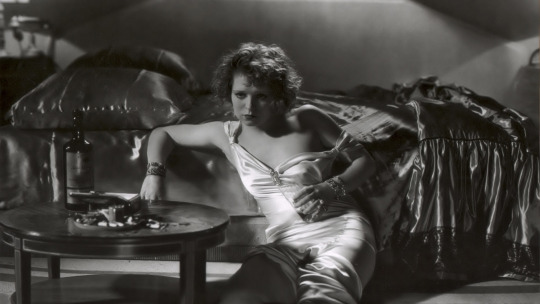
Savage Cinema.
From anarchists and adultery to milk baths and massacres, Matthew Turner shares five of the weirdest and wildest highlights of Hollywood’s pre-Code era, as #PreCodeApril comes to a close.
Pre-Code April was directly inspired by Noirvember, a month-long celebration of noir cinema instigated by Marya Gates (Oldfilmsflicker). I did Noirvember for the first time in November 2019, really enjoyed it, and thought it would be great to do the same thing for pre-Code movies. Although I’ve watched most of the classic 1930s films, I realised there were a huge number of pre-Code films I’d never seen (of my Letterboxd list of over 900 Pre-Code films, I have only seen 200).
As a sucker for a bit of wordplay, no matter how tenuous, I picked April partly because it’s six months away from Noirvember and partly because of the shared “pr” sound in April and Pre-Code. I’ve been absolutely delighted by the response—the #PreCodeApril hashtag on Twitter is a daily treasure trove of pre-Code-related joy, but I was genuinely thrilled to see the response on Letterboxd (here is my watchlist for the month). It’s been a real pleasure to see pre-Code movies constantly popping up in my ‘new from friends’ feed. My hope is that it’ll be even bigger next year—and that maybe TCM will want to get involved, the way they do with Noirvember.
Produced between 1929 and 1934, pre-Code cinema refers to films made in a brief period between the silent era, and Hollywood beginning to enforce the Motion Picture Production Code censorship guidelines (mandatory enforcement came in from July 1934). The “Code” in question was popularly known as the Hays Code, after then MPPDA president Will H. Hays. As the depression set in and box office declined, theater owners needed fare that would drive cinema-goers to the movies. It was a wild time to be a scriptwriter; they threw everything at the page, designers added even more, and actors played out the kinds of scenes, from the suggestive to the overt, that would otherwise be banned for decades to come.
The following five films demonstrate some of Hollywood’s craziest pre-Code excesses. They’re still jaw-dropping, even by today’s standards, and notably give female characters an agency that would be later denied as the Christian morals of the Code overruled writers’ kinks.

Madam Satan (1930)
Directed by Cecil B. DeMille, written by Elsie Janis, Jeanie Macpherson and Gladys Unger
A critical and commercial flop in 1930, Cecil B. DeMille’s utterly insane musical comedy stars Kay Johnson as a straight-laced wife who plots to win back her unfaithful husband (Reginald Denny) by seducing him at a costume party, disguised as a mysterious devil woman. The location of this party? Oh, nothing too fancy, just on board a giant zeppelin. (“Madam Satan or: How the Film gets Fucking Crazy on the Blimp,” as Ryan reviewed it.)
Madam Satan is not by any stretch of the imagination a good movie (the editing alone is laughably bad), but as a piece of pre-Code craziness, it really has to be seen to be believed. Co-written by a trio of women and set in just three locations, it goes from racy bedroom farce to avant-garde musical to full-on disaster movie after a bolt of lightning hits the blimp.
The film is justly celebrated (in camp classic circles, at least) for the wildly over-the-top costumes paraded in the masquerade ball sequence, but there’s weird outfit joy everywhere you look. Keep an eye out for an enterprising extra who’s come dressed as a set of triplets.
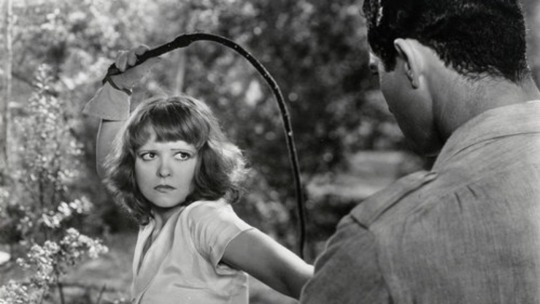
Call Her Savage (1932)
Directed by John Francis Dillon, written by Tiffany Thayer and Edwin J. Burke
Adapted from a salacious novel by Tiffany Thayer, Call Her Savage was former silent star Clara Bow’s second-to-last film before her retirement at the age of 28. She plays Texas gal Nasa Springer, who’s always had a “savage” temper she can’t explain. In the space of 88 minutes she goes from wild teenager to jilted newlywed to young mother to prostitute to wealthy society girl to alcoholic before finally (it’s implied) settling down with her Native-American friend after discovering that she’s half-Native-American, something the audience has known all along.
Bow’s performance is frankly astonishing, to the point where you simply can’t believe what you’re seeing from one moment to the next. Sample scenes see her savagely whipping both a snake and her Indian friend, smashing a guitar over a musician’s head and violently wrestling her Great Dane… and that’s all in the first five minutes. She’s also frequently in a state of near undress throughout—one funny scene has her maids chasing her with a dressing gown because they’re afraid she’ll run down the street in her négligée.
The rest of the film includes alcohol, adultery, strong violence, attempted rape, murder, syphilis (not named, but heavily implied) and baby death. It’s a veritable smorgasbord of outrageous content and Bow is pure dynamite throughout. The film is also noted for being one of the first on-screen portrayals of homosexuality, when Nasa visits a gay bar in the Village frequented by “wild poets and anarchists”.

Smarty (1934)
Directed by Robert Florey, written by Carl Erickson and F. Hugh Herbert
This deeply problematic sex comedy features pre-Code stars Joan Blondell and Warren William (often nicknamed ‘The King of Pre-Code’) at their absolute filthiest. Blondell plays Vicki, a capricious, happily married wife who gets an obvious kick out of taunting her husband, Tony (William). When he cracks and slaps her at a party, she divorces him and marries her lawyer, Vernon (Edward Everett Horton), whom she also goads into slapping her in a deliberate ploy to win back Tony.
Essentially, Smarty hinges on Vicki liking rough sex and it’s completely blatant about it, ending with her sighing “Hit me again” (the film’s UK title!) as they sink into a clinch on a couch, a rapturous expression on her face. It’s a controversial film because on the surface it looks like it’s condoning domestic violence, but it’s very clearly about Vicki’s openly expressed sexual desires—she wants to be punished and dominated, she just has a rather dodgy way of getting what she wants.
It might be unsophisticated, but in some ways Smarty is remarkably ahead of its time and ripe for rediscovery. To that end, it would make a fascinating double bill with Stephen Shainberg’s Secretary (2002). Oh, and it’s also chock-full of lingerie scenes (like most pre-Code films), if you like that sort of thing.

Massacre (1934)
Directed by Alan Crosland, written by Sheridan Gibney, Ralph Block and Robert Gessner
Several pre-Code films (notably those made by Warner Bros) took a no-punches-pulled approach to their depiction of social issues, and star Richard Barthelmess actively sought out such projects. Here he plays Joe Thunderhorse, a Native American who’s become famous on the rodeo circuit. When he returns to his tribe to bury his father, he ends up fighting for their rights, taking on corrupt government officials and religious authorities.
Massacre is fascinating because on the one hand it’s wildly insensitive—Barthelmess and co-star Ann Dvorak are both cast as Native Americans—but on the other, it burns with a righteous fury and does more than any other Hollywood film (before or since) to champion the rights and highlight the injustices dealt out to Native Americans. That fury is encapsulated in a horrifying and rightly upsetting rape scene (it happens off-screen, but the cuts leave you in no doubt) that the film handles with surprising sensitivity.
In addition to being a passionate fight against racism and social injustice, the film also has some genuinely shocking sexual content. Most notably, Joe is seen making love to a rich white woman (Claire Dodd, who’s also in Smarty) who has an obvious sexual fetish, flaunting him in front of her friends and making a shrine in her room with Native-American paraphernalia.
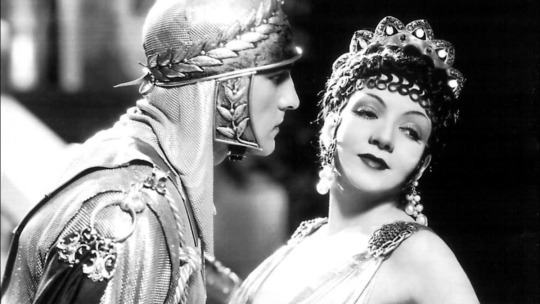
The Sign of the Cross (1932)
Directed by Cecil B. DeMille, written by Waldemar Young and Sidney Buchman
Yes, this is Cecil B. DeMille again, but no list of weird and wild pre-Code films would be complete without the jaw-dropping ancient Rome epic, The Sign of the Cross. Adapted from an 1895 play by Wilson Barrett, it stars Frederic March as Marcus Superbus (stop sniggering at the back there), who’s torn between his loyalty to Emperor Nero (Charles Laughton) and his love for a Christian woman (Elissa Landi), while also fending off the advances of the Emperor’s wife, Poppaea (Claudette Colbert).
The film is racy enough in its sexual content alone: highlights include the famous scene of Claudette Colbert taking a nude milk bath and an erotic “lesbian” dance sequence, where Joyzelle Joyner’s “most wicked and talented woman in Rome” does ‘The Dance of the Naked Moon’ at Frederic March’s orgy, trying to tempt Landi’s virtuous Christian, to the obvious arousal of the gathered guests.
However, it’s the climactic gladiatorial-arena sequence that will leave your jaw on the floor. Lasting around twelve minutes, it includes: someone getting eaten by a tiger, a tied-up, naked women being approached by hungry crocodiles, pygmies getting chopped up by female barbarians, elephants stomping on heads, a gorilla approaching a naked woman tied to a stake, a man getting gored by a bull, and gladiators fighting to the death, complete with blood and gory injury detail.
The whole thing is genuinely horrifying, even for 2021. Best of all, DeMille pointedly critiques the audience (ourselves included), by showing a series of reaction shots ranging from intense enjoyment to abject seen-it-all-before boredom.
Matthew Turner (FilmFan1971) is a critic, author, podcaster and lifelong film fanatic. His favorite film is ‘Vertigo’. The films in this article are also listed here: Five of the Pre-Code Era’s Most Outrageous Films.
#preCodeApril#pre code april#precode april#hays code#mppa code#cecil b demille#clara bow#matthew turner#letterboxd#1930s films#1920s films#depression films
42 notes
·
View notes
Text
I just watched the winx saga and I can't believe Netflix is still doing the same show over and over again but in different scenarios and getting away with it.
First of all, white washing characters was the first and most noticeable mistake. They knew what they were doing and they didn't even care.
Then we have the well knowing trope of the boy falling for the guy who's bullying him. Like, can we get something new? We get it. The guy is bullying the gay boy cause he has internalized homophobia but we do not need to see it over and over again.
And remember the queer coding in villains? They weren't really subtle this time because they decided to make them the antagonists. (I'm not against of having queer villains or antagonist, I just think that making the only lgbt+ characters in the show do questionably things is not helping the community. It is in a way saying "yeah they gay and they are the bad guys, cause only the bad guys would be gay").
Moving on from that. Let's talk about Terra. Let's forget for a moment that they put her in the show instead of Flora (which was bad) and let's focus on her character. She is poorly written and her whole character revolves around her weight. I understand that insecurities are a thing, and many people (including me) have them. It isn't bad to make her insecure about how she looks, it's something they could have developed in the show. But the fact that they made so many fat phobic comments and it was never addressed, not even once, is the problem (I don't care if they plan to address it later in the show, it shouldn't even be a thing I the first place).
And I'm so sad about Stella. Really, did the need to make another white blonde rich girl jealous of the new girl because she seems to be liked by her ex-boyfriend? In the original show Stella was the first one to support Bloom. She lied so Bloom could go to Alfea. This could have been a show with girls supporting girls but they had to make them be against each other more than a half of the season. They reduce their relationship to them fighting for a boy.
It is a very flawed show. Poor written characters, repetitive tropes, unnecessary sex scenes of underage characters (I would talk more about that but this is getting too long). They could have done so much better. And I think that if they dicided to make this show without saying it was a 'live action winx', many people wouldn't be complaining about it.
Be better Netflix.
28 notes
·
View notes
Text
“But Bumbleby was rushed/forced to pander to the gays—”
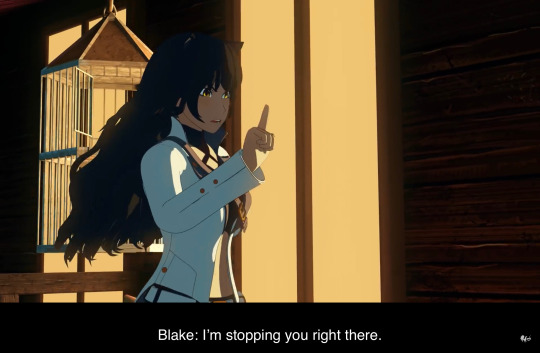
There are a number of glaring flaws in this argument, most of all the fact that no straight relationship is ever called “forced” or “pandering” even if people don’t like it, let alone “rushed” when it’s only on the verge of officially happening seven seasons into the show, but I want to break down all of the many levels on which it’s wrong in order to hopefully kill it once and for all.
“It came out of nowhere—”
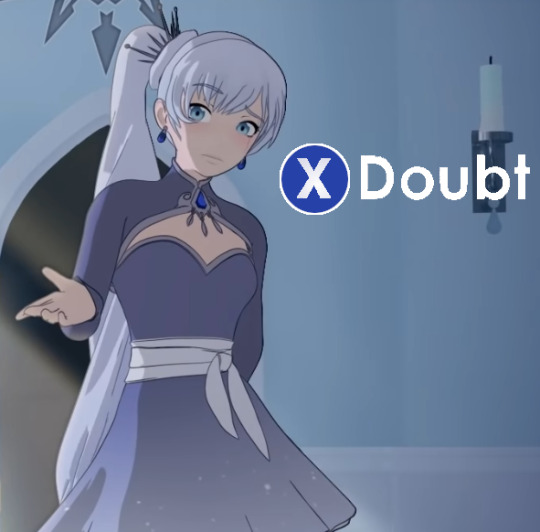
Jaune was crushing on Weiss the second he saw her, Sun was crushing on Blake the moment he saw her, Pyrrha developed feelings for Jaune in just one Volume and showed some interest from the moment she saw him, and Blake goes from being consistently annoyed at Sun throughout Volumes 1 and 2 to suddenly having a crush on him in Volume 3.
If Bumbleby supposedly “came out of nowhere,” then so did W/hite Knight, A/rkos, and B/lacksun. But no one ever has an issue with the speed at which those characters started having romantic interest in each other. And I’m not even saying they should—they’re all very valid ships and whether they came out of nowhere or not isn’t the point of this—but there’s a clear double standard applied to same sex ships as opposed to heterosexual ships here and it invalidates this point right out of the gate.
“It was rushed—”

Blake and Yang are only just now close to becoming an official couple after more than six whole Volumes of knowing each other. There is no possible universe where this would qualify as “rushed.” Again, W/hite Knight and B/lacksun albeit both one-sided at least to begin with both became obvious things within literal episodes of the characters meeting, and Jaune and Pyrrha were showing blatant romantic interest in each other by Volume 2 before kissing in Volume 3.
In the last case you can argue that it went at a faster pace because Pyrrha was going to die, but that doesn't change the fact that no one complained that it went too quickly—or about the other two ships I mentioned which were both initially based solely on one (1) instance of a guy showing interest in a girl—and yet people say it’s too soon for Blake and Yang to get together when they’ve had over twice as long for their relationship to develop.
“The shippers forced it into the show—”


I don’t think I even need to add any more here when the words of CRWBY speak for themselves.
“Toxic shippers think everything is gay—”
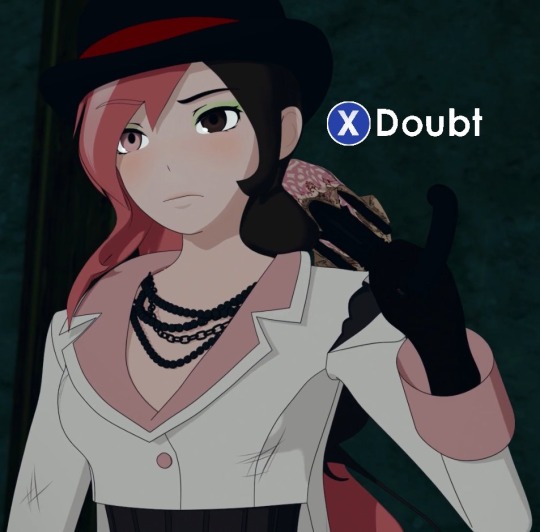
I mean, I’m gay and I only truly ship a handful of the possible same sex pairings in the show—certainly far from the majority of them—and I also ship a number of straight ships, but go off I guess.
I already made a post on this here, but it’s insanely dismissive and ridiculous for heterosexual people i.e. the ones who usually use this “argument” to assume that they know better than actual LGBT+ people what is or isn’t good LGBT+ representation, and for them to assume that just because they missed build up that it therefore isn’t there.
I can’t take someone seriously when they go into a discussion determined to believe that they’re already right and don’t listen to a word you say to prove otherwise, especially when they’re debating on a topic which doesn’t directly affect them and which they don’t have the same level of firsthand knowledge of.
“The wasps only care about Blake and Yang getting in each other’s pants—”
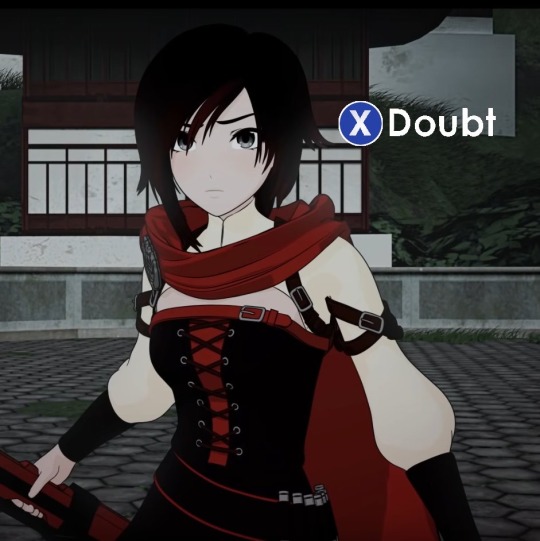
Actually, it’s the people who are most aggressively against Blake and Yang being a couple that tend to reduce their relationship to being entirely about sex even though they haven’t had a single remotely sexual interaction in the show, but if this were true then surely Bumbleby shippers would be very unhappy with the show because Blake and Yang have still not “got in each other’s pants,” or “swapped clit juice” as I once saw someone tastefully describe it?
But that isn’t right. Because in general us Bee shippers are currently exceedingly happy with everything that’s happening in the show to do with Blake and Yang’s relationship. So how can that be if all we care about is whether they fuck or not?
The answer is of course that we don’t only care about whether they fuck or not—in fact most of us couldn’t care less whether it’s ever so much as hinted that they have sex, both because the show almost certainly won’t ever go there and because that isn’t our priority—we’re just enjoying watching them fall in love.
Honestly this argument is one of the most lazy because one look at RWBY will tell you that none of the romances are at all sexual thus far so any shippers who truly only care about that aspect wouldn’t stick around very long when they’ll just end up disappointed. And of course the way that these people inherently view same sex relationships as sexual is homophobic and disgusting too.
“CRWBY rushed it to give the rabid shippers what they want—”
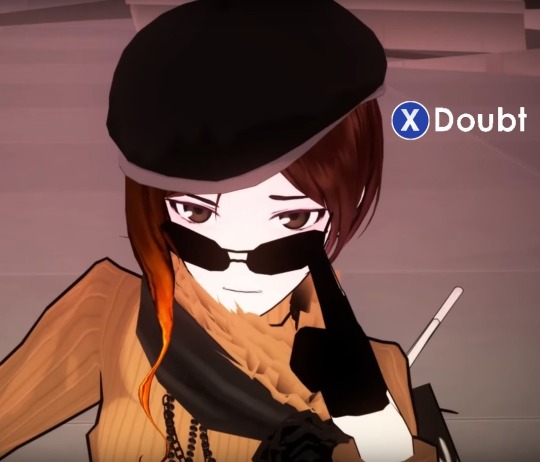
Like the last two points, this is a “criticism” that I’ve only ever seen levelled at same sex ships and never straight ships, so it’s yet another example of double standards and hypocrisy, but that’s only the start of what’s wrong with it.
The most galling thing about this is that these people insist that all LGBT+ people because as I’ve already mentioned that is always the group which statements like this are aimed at just want to see two characters of the same gender make out as soon as possible, which is simply not true.
No one would ever claim that straight people just want to see a man and a woman get it on as soon as possible and dismiss the worth of a straight relationship because of it. So it’s ridiculous to try and force that logic onto shippers of same sex ships, who are primarily LGBT+ people themselves.
If anything, we care even more about the quality of our ships—how healthy they are, whether they’re well built up or not, etc.—because we hardly have any to begin with in comparison. If one straight ship is rushed or poorly written, then there are plenty of well-handled ones to choose from instead, but the same isn’t the case for same sex ships.
We want to be represented well, which means that we want healthy relationships with plenty of development where the characters actually have chemistry and complement each other. We might still support rushed or badly-written same sex ships sometimes because it’s still representation which we are overall sorely lacking, but we don’t want them.
“But they ship baited with Blake and Sun—”
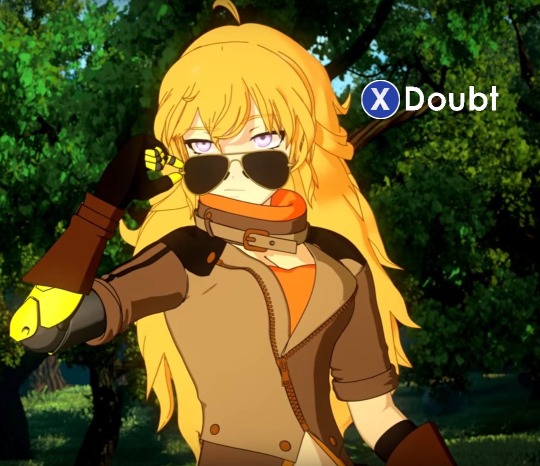
First off, straight ships can’t be baited the same way that same sex ships can. It’s simply not a comparable situation. But of course B/lacksun shippers are entitled to feel disappointed that their ship didn’t become canon. That’s utterly valid and understandable. However, that doesn’t mean that the writers or the show in any way misled viewers regarding what was happening.
“But Sun winked at Blake—”
And Yang also winked at Blake in Volume 2 while asking her to the dance, just like Sun winked at Blake in Volume 1 and then asked Blake to the dance. And Blake turned Sun down when he asked initially, specifically told him that they were only “technically” going together when she ran into him outside, and told him definitively that she had chosen to give her first dance to Yang.
“But Blake blushed at Sun—”
And now she’s also blushed at Yang, in a far more intimate scene at that. Next point.
“But Sun met Blake’s parents—”
And? Simply meeting someone’s parents doesn’t on any level automatically imply romance. Ghira didn’t even like Sun, and while a lot of people like to claim that Kali “ships it” which would be extremely flimsy evidence to base the canonicity of a ship on anyway, she’s someone who would do the same with anyone Blake brought home so it means nothing. If Blake had actually chosen to take Sun home with her herself then this would be a valid point, but she didn’t, so it has no weight whatsoever overall.
“But Blake kissed Sun on the cheek—”
And I kiss my mother on the cheek the exact same way every time I say goodbye to her. If you think that type of kiss on the cheek has to be romantic then quite frankly I’m not sure what world you’re living in. If the camera had been close up, if there had been any shots at all of their reactions, any blushing or lingering looks, a more private setting— literally anything to give it some actual weight and make it feel significant, then this might mean something, but it’s framed as a totally platonic goodbye with zero romantic coding.
And that’s without even mentioning the fact that right after that moment Sun flat out states that his time with Blake was “never about [romance],” which sort of kills the idea that anything about that scene was supposed to be taken as romantic. There was no reason to include that line except to make it clear to the audience that Sun and Blake parted ways as friends who now have no intention of ever becoming anything more.
Seriously, if they wanted us to think that there was still something there, then Blake would have been shown to be thinking about or missing Sun even one since they separated, but he hasn’t been brought up for even a second. If they wanted to set up a continuation of anything romantic for them when the group reach Vacuo, say, then they would have started doing it by now.
Plus the reverse argument that Blake and Sun have never hugged or held hands—both of which Blake and Yang have done multiple times—works just as well, perhaps even better since handholding is a well-established romantic cue in the show already thanks to A/rkos, R/enora, and O/zma and Salem.
“But why was Sun even there in Volumes 4 and 5 then—”
Because Blake needed a friend who she could exposition to about her thought processes and personal problems so that the audience could understand what she was going through, and she wasn’t as likely to open up to her parents about that stuff right away when she was convinced they’d hate her for leaving.
Sun was there to support Blake as she developed and to tell her that running away hurt the very people she was trying to protect. That was his narrative role in that arc. There was nothing to indicate that a romance was being built in those more than twenty episodes they spent together and if it was going to happen that would have been the time to do it.
On the other hand Blake and Yang’s shared arc together is built on the fact that Blake’s romantic ex, who Blake had already directly contrasted with Yang and whose Semblance was already a foil to Yang’s, maimed Yang specifically because Blake loves her. The basis of that arc has romantic weight, which is what makes the difference here. Though the scene at the end of Volume 3 where Adam takes Yang’s arm isn’t romantic in and of itself, I should clarify, it just has romantic significance in that it makes it clear that Blake and Yang’s feelings go beyond mere friendship.
In short, the summary of this whole section pretty much boils down to: two characters spending time together doesn't inherently equal romantic development, and it isn’t in any way “baiting” if those two characters don’t then get together.
The characters’ feelings follow a fairly logical progression over the course of the show, with Blake showing interest in both Sun and Yang in V1-V3, then ceasing to show interest in Sun after that as their relationship becomes totally platonic by Volume 5/the beginning of Volume 6 at the very latest, while the events of the Fall of Beacon only solidified how strong her feelings for Yang were and once she reunites with Yang their relationship begins to head towards romance.
It’s a pretty realistic depiction of how human feelings work, and a far less messy situation than in a lot of other shows where there isn’t the same massive level of hatred and vitriol towards the “victorious” pairing, because this was never even really presented as a love triangle or rivalry.
To conclude, I just want to list some of the contradictions that I’ve seen within the arguments made against Bumbleby, because I think it’s very telling that the people who are against it can’t even settle on one coherent narrative on why it’s bad.
“Bumbleby has no development, but also the show focusses too much on Bumbleby.”
“Monty wouldn’t have wanted Bumbleby—it goes against his vision—even though I didn’t know him and have no idea what his vision actually was, and he explicitly stated that he wanted LGBT+ characters in the show who might already be in the main cast and that he wanted Blake and Yang to have a shared arc together, as well as being responsible for the set up of that arc with Blake and Yang being introduced as Beauty and the Beast while Adam canonically represents Gaston.”
“The Bumbleby shippers have so much influence that they forced the writers to make the ship canon, but they’re also just a vocal minority who don’t matter.”
“Blake and Yang hardly interact—they’re barely even friends—but they also interact too much and it’s making Bumbleby take over the show.”
“Arryn is a victim of the toxic wasps who harrassed her and sent her death threats for saying that the song Bmblb doesn't automatically make the ship canon, which there is zero evidence of, but Arryn is also an unprofessional cunt for expressing her support of Bumbleby.”
“None of Blake and Yang’s scenes together are romantic so Bumbleby is forced, but even when they have undeniably romantic interactions I’ll ignore them or deny that they mean anything so I can still pretend it has no build up.”
“Bumbleby is bad because Team RWBY are a sisterhood, but all of the other straight relationships within teams—even those who’ve flat out called each other ”family”—are fine, and I’ll just pretend that there aren’t other definitions of the word sisterhood which have nothing to do with actual sisters and are the ones that actually apply in this case.”
“Blake and Yang’s relationship could be seen as romantic or platonic, but I personally think they’re just friends so Bumbleby is bad and came out of nowhere.”
I’ve seen all of these countless times with my own two eyes and it’s absolutely hilarious to be honest. Anyway that’s it. I have yet to see a single logical argument as to why Bumbleby is bad that isn’t made in bad faith, fallacious, or just doesn’t hold up when you actually look at the show. It’s about to be canon, and at this point to be honest anyone who doesn't like that can simply accept it or go and watch something else that will pander to their specific tastes instead.
1K notes
·
View notes